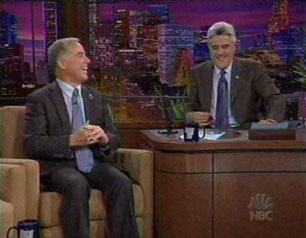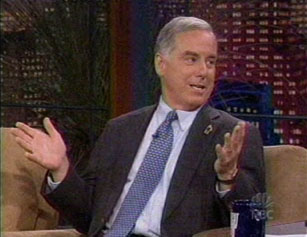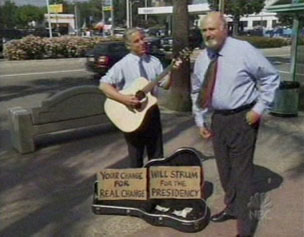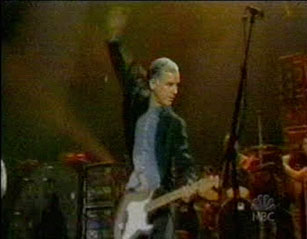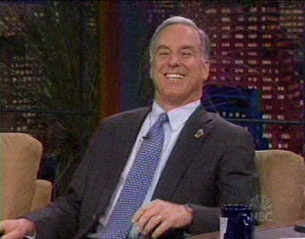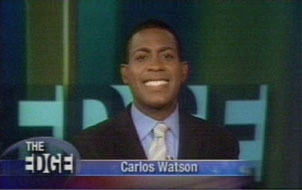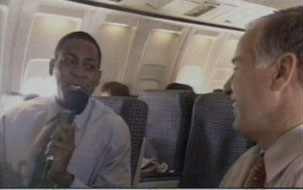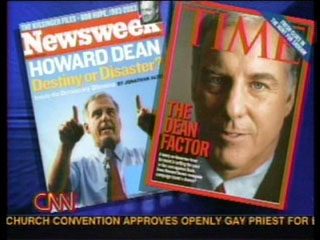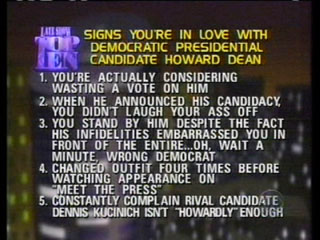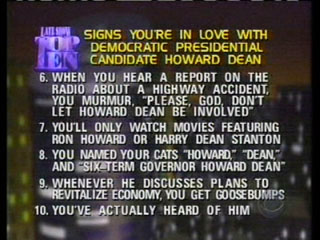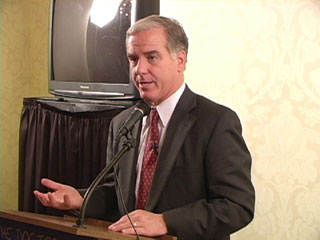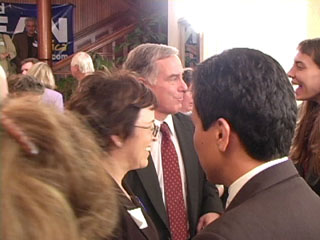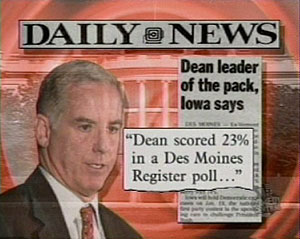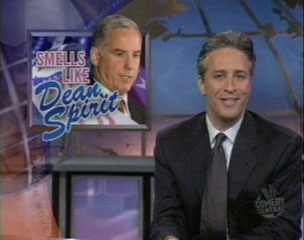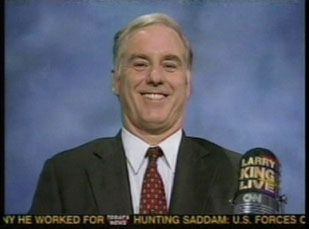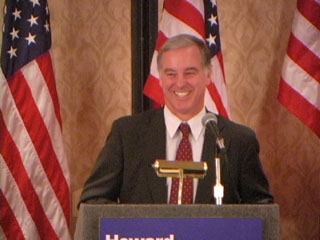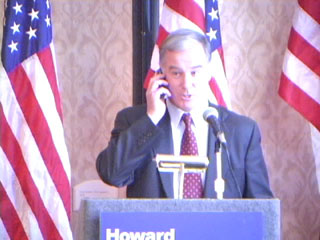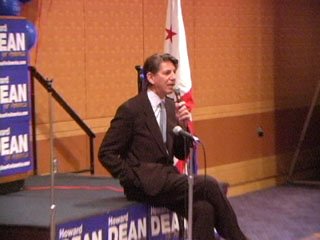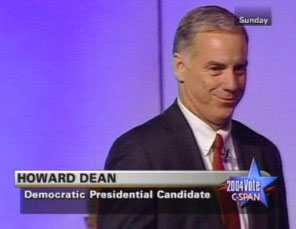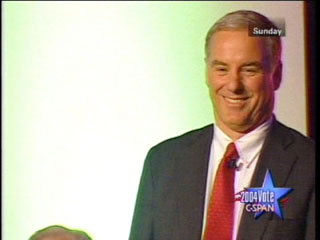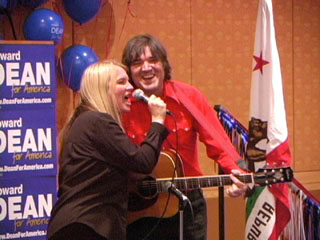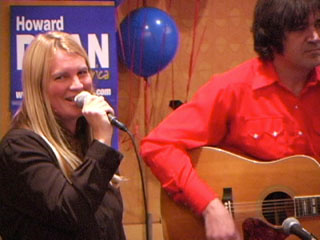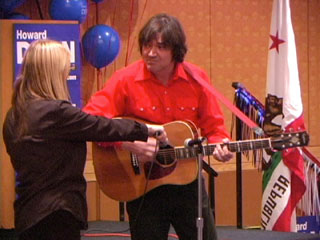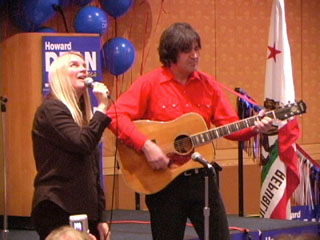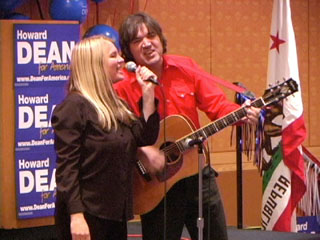This is from May 22, 2005.
Video - Howard Dean On Meet The Press - Parts 1-6
Audio - Howard Dean On Meet The Press - Parts 1-6
A nice little piece that tells us a lot of what we already know about Howard Dean's Internet-savvy campaign. I'll never get tired of reading about it :-)
How the Internet Invented Howard Dean
Forget fundraising (though his opponents sure can't). The real reason the Doctor is in: He listens to the technology - and the people who use it.
By Gary Wolf for Wired.
Neither policy nor pragmatism alone drove MoveOn to Dean; his key advantage was that his bloggers were already deeply interlinked with bloggers friendly to MoveOn. Dean's network made it easy for his supporters to vote in the MoveOn poll, while offering MoveOn members an opportunity to influence the Democratic race, even if their own state's primary was irrelevant. Participation, not policy, was key.
Joi Ito, founder of Neoteny, a venture firm, and former chair of Infoseek Japan, has joined a group of technologists advising Dean (others include Ross Mayfield, Clay Shirky, and Lawrence Lessig, also a regular contributor to Wired). After looking at a paper Ito and some of his colleagues have been working on called "Emergent Democracy," I contact him to ask if he thinks there's a difference between an emergent leader and an old-fashioned political opportunist. What does it take to lead a smart mob? Ito emails back an odd metaphor: "You're not a leader, you're a place. You're like a park or a garden. If it's comfortable and cool, people are attracted. Deanspace is not really about Dean. It's about us."
Here is the full text of the entire article in case the link goes bad:
http://www.wired.com/wired/archive/12.01/dean.html
page 1
How the Internet Invented Howard Dean
Forget fundraising (though his opponents sure can't). The real reason the Doctor is in: He listens to the technology - and the people who use it.
By Gary Wolf
It is 83 days before the Iowa caucuses, and I'm sitting at a small table on a private jet above Colorado getting a pure dose of Internet religion from Howard Dean. "The Internet community is wondering what its place in the world of politics is," Dean says. "Along comes this campaign to take back the country for ordinary human beings, and the best way you can do that is through the Net. We listen. We pay attention. If I give a speech and the blog people don't like it, next time I change the speech."
The biggest news of the political season has been the tale of this small-state governor who, with the help of Meetup.com and hundreds of bloggers, has elbowed his way into serious contention for his party's presidential nomination. As every alert citizen knows, Dean has used the Net to raise more money than any other Democratic candidate. He's also used it to organize thousands of volunteers who go door-to-door, write personal letters to likely voters, host meetings, and distribute flyers.
Naturally, bloggers everywhere are thrilled. Even those who hate the candidate love the way the campaign is being managed. "I'd vote for SpongeBob SquarePants over Howard Dean," writes Derek James in his political blog, Thinking as a Hobby. But Dean's organization, James admits, is being run "in a very smart, very democratic way." Bloggers are fascinated by Dean for philosophical and also parochial reasons. They feel they have a right to be proud. Dean has become the front-runner by applying their most cherished rules for attracting attention and building a social network on the Internet.
"We fell into this by accident," Dean admits. "I wish I could tell you we were smart enough to figure this out. But the community taught us. They seized the initiative through Meetup. They built our organization for us before we had an organization."
Meetup is a Web tool for forming social groups. In early 2003, Dean himself was lured to an early New York City meetup where he found more than 300 enthusiastic supporters waiting to greet him. Meetup quickly became the engine of Dean's Internet campaign. Back then, the leading group on the site was a club for witches. Zephyr Teachout, Dean's director of Internet outreach, describes sitting across from campaign manager Joe Trippi in the early weeks and hitting Refresh again and again on her Web browser. "I was obsessed with beating Witches," she says. "Witches had 15,000 members, and we had 3,000. I wanted first place."
Three thousand is a small number. But all campaigns depend on a feedback loop, and 3,000 passionate supporters who are connected via the Internet are influential in a way that an equivalent crowd would never be if you had to gather it via direct mail or a telephone survey. Dean's Meetup members quickly recruited others, and by late March Dean had beaten Witches. Growth followed an exponential curve; Dean's new supporters contributed money, his piles of money won respect from the media, and media attention pushed Meetup numbers higher. Most of the Democratic candidates who polled in the low single digits a year ago still poll in the low single digits. They never gained momentum. Dean's early use of Meetup lowered the feedback threshold, just as a good supply of kindling makes it easier to light a fire. In the third quarter of 2003, Dean raised nearly $15 million - most of it in small donations - setting a one-quarter record for a Democratic candidate in a presidential race.
By mid-November, the Howard Dean group on Meetup would have more than 140,000 members, though Meetup would matter less. After demonstrating his fundraising prowess, Dean bagged endorsements from two of the country's most powerful labor groups, the Service Employees International Union and the American Federation of State, County, and Municipal Employees.
But for today, the Internet remains the key engine of Dean's election bid and he has yet to merge his grassroots movement with the traditional Democratic power structure. I'm here to learn more about what makes his Net campaign work.
I like Dean's pugnacity, his antiwar stance, and the way he is challenging the timorous leaders of his party. A couple of months ago, before I took this assignment for Wired, I sent him a hundred bucks over the Web. But the Contribute button on Dean's Web page hardly accounts for his dominance. One key to his online popularity is the harmony between his message and the self-image of the Internet community. "A lot of the people on the Net have given up on traditional politics precisely because it was about television and the ballot box, and they had no way to shout back," he says. "What we've given people is a way to shout back, and we listen - they don't even have to shout anymore."
Dean has been reluctant to take a position on core Net issues like copyright law and peer-to-peer file-sharing. But that didn't matter. The power of Dean's campaign does not come from his appeal to Net users as an interest group but from a fateful concurrence of other forces: a strong antiwar message; a vivid, individualist candidate; a lucky head start with Meetup; an Internet-savvy campaign manager in Joe Trippi; and, most important, a willingness to let a decentralized network of supporters play a tactical role. With these assets, Dean gained a potent lead. The very structure of the networks his campaign has built - a structure that enhances the power of feedback - creates obstacles even for a rival flexible enough to challenge Dean on his own ground.
The intersection of political analysis and Internet theory is a busy crossroad of cliché, where familiar rhetorical vehicles - decentralized authority, emergent leadership, empowered grass roots - create a ceaseless buzz. But the Dean organization has embraced this language of Web politics passionately. Below, I've used five popular Internet axioms to give a snapshot of his campaign during the heady days when it first pulled into the lead.
page 2
Make the network stupid.
The Dean campaign is a network rather than an army, and that is one of its strengths. But it's a stupid network, and that's also a strength. Stupid is meant in the technical sense, defined by David Isenberg in his classic telephony paper, "The Rise of the Stupid Network." Isenberg advanced the principle that under conditions of uncertainty, a network should not be optimized for any set of uses presumed to be definitive. Instead, the network should be as simple as possible, with advanced functionality and intelligence moved out to its edges. For the Dean campaign, this means that hundreds of independent groups are organizing with very little direction from headquarters.
In February 2003, there were 11 Dean meetings around the country organized through Meetup.com. By late fall, there were more than 800 monthly meetings on the calendar. At first, meetups were loosely tracked through intermittent emails to a list of known organizers. But as long as responsibility for tracking organizers fell to Dean's paid staff in Burlington, Vermont, there was a problem. "We were inadvertently allowing bottlenecks in the network through some power-hungry coordinators who thought they were the only ones who could have contact with the campaign," says Michael Silberman, Dean's national Meetup coordinator. "We added or removed coordinators only through email or phone, and there's a limit to our human ability to manage the growth of such a large network."
In October, the campaign switched to an automated, Web-based system that keeps the selection and management of meetup coordinators out of the hands of the campaign. Supporters can nominate themselves to coordinate a meetup. Responsibility for success of the meetup rests with the individual organizers. Many regions have more than one meetup, so there is the possibility of competition and splitting, but this tension brings advantages. The Dean network relies on the good sense of the users to select a meetup that is working well. Organizers have a monthly conference call with Trippi and receive sample agendas and organizing materials. Ultimately, what happens is up to them.
"In the old telephone company, central planning was needed before the network could grow," says Isenberg, when I call to talk to him about the campaign. "If you are willing to let things happen from the bottom up, you can scale without doing all that planning."
Let the ants do the work.
In the past, early enthusiasm in western states was meaningless to a primary candidate except as a source of donations. The first contests were on the other side of the country, where face-to-face politics and idiosyncratic issues (such as the value of ethanol as a gasoline additive) played an absurdly outsize role. No campaign dedicated to winning Iowa could waste time building an organization elsewhere. But today, Dean supporters build their own nodes.
"We consider it our job to deliver Marin County for Dean," says Katy Butler, a volunteer I talk with at a Seniors for Dean meeting in San Francisco. Under normal circumstances, this would be a worthless contribution. Small, rich, liberal Marin County could hardly matter less. But because the entire Dean system is densely linked, the distant work of all the local groups feeds back into the campaign. Local letters to the editor are copied and sent around by email, graphics and videos are shared among groups, and technical assistance is distributed. A local and national volunteer infrastructure arises with almost no help or supervision.
"It's the swarm that drives the story, not the queen ant," says Steven Johnson, author of Emergence. For months, local meetups, including the regular Dean meetups in Marin, have been composing handwritten letters to Iowa Democrats, asking them to support Dean.
This past summer, polls showed Dean behind Dick Gephardt in Iowa. After 30,000 handwritten letters went out from the July 2 meetups, Dean surged, and by August the polls had him tied with Gephardt or pulling into the lead. In New Hampshire in midsummer, Dean was behind Kerry. At the August 6 meetups, tens of thousands of letters were mailed to New Hampshire. By the end of the month, Dean was in first place with a double-digit lead he has maintained ever since. By taking a set of widely dispersed supporters and converting them into a swarm of personal advocates, Dean's campaign almost instantly changed the dynamics of the race in the earliest states.
Leaders are places.
The first political swarm of Democratic politics was not the Dean campaign but MoveOn.org, whose 2 million members donate money to run advertisements against the Bush administration and engage in massive telephone and petition campaigns. Last summer, MoveOn held an online vote to determine which Democratic candidate, if any, the organization would support. About 317,000 votes were cast. Because no candidate won more than 50 percent of the vote, MoveOn did not make an endorsement. But Dean was the big winner, taking about 44 percent, nearly twice as much as the runner-up, Dennis Kucinich.
The high number for Kucinich, who barely registered in national polls, confirmed what any observer of MoveOn already knew - its supporters were well to the left of the party's mainstream. Nonetheless, Dean - who is pro-gun, pro-death penalty, far more economically conservative than Kucinich, and argues for keeping US troops in Iraq - beat him by 2 to 1. Was this because Dean was believed to be more electable? Unlikely. The Democratic Leadership Council, a centrist group, was loudly proclaiming that Dean's nomination would lead to a debacle.
Neither policy nor pragmatism alone drove MoveOn to Dean; his key advantage was that his bloggers were already deeply interlinked with bloggers friendly to MoveOn. Dean's network made it easy for his supporters to vote in the MoveOn poll, while offering MoveOn members an opportunity to influence the Democratic race, even if their own state's primary was irrelevant. Participation, not policy, was key.
Joi Ito, founder of Neoteny, a venture firm, and former chair of Infoseek Japan, has joined a group of technologists advising Dean (others include Ross Mayfield, Clay Shirky, and Lawrence Lessig, also a regular contributor to Wired). After looking at a paper Ito and some of his colleagues have been working on called "Emergent Democracy," I contact him to ask if he thinks there's a difference between an emergent leader and an old-fashioned political opportunist. What does it take to lead a smart mob? Ito emails back an odd metaphor: "You're not a leader, you're a place. You're like a park or a garden. If it's comfortable and cool, people are attracted. Deanspace is not really about Dean. It's about us."
page 3
Links attract links.
Throughout the fall, the number of people signed up for Dean meetups has been more than three times as large as the number of people signed up for Clark meetups. The Wesley Clark list is almost three times as large as the Kerry list. The Kerry list is almost 30 times as large as the Gephardt list. In Linked: The New Science of Networks, the physicist Albert-László Barabási describes the factors that influence the size of competing nodes in a network. His research shows why Dean's Internet lead has been so hard to overcome.
Barabási gives a formal model for what everybody already knows: Popularity breeds more popularity; links are made most quickly to Web sites that have the most links. One of the major factors determining who will win in a race for links, therefore, is time. The first sites gain an early lead, and the lead tends to grow. But, of course, late arrivals sometimes take command. This is because time is not the only factor. The other factor is what Barabási calls "fitness."
Defining fitness is an abstract exercise in Barabási's work, because he is a physicist attempting to give a general description of network behavior in all its forms. In the earliest stage of the Democratic primary runup, however, fitness can be specified more concretely. Fitness at the beginning of this campaign was closely linked to a candidate's antiwar stance. Dean was first to the Web, while sharing the best fitness position with a number of candidates from the party's left wing.
The most important thing to notice about Barabási's model is that the advantage of arriving early and offering adequate or superior fitness increases exponentially over time. This means we would not expect to find lots of competing sites clustering closely around the leader. Instead, the graph has a steep curve. This is exactly what we see when we look at the relative size of the online campaigns, whether measured by links, traffic, or Meetup numbers.
Allow the ends to connect.
Local Dean groups are not obsessed with passing their messages to the candidate. They are busy talking among themselves. "The goal is not necessarily to have messages flowing up and down," says David Weinberger, a consultant for the campaign and author of Small Pieces Loosely Joined. "Democracy is supposed to be about people talking with each other about what matters to them."
In terms of real political power, the end-to-end architecture has complex implications. Tactically, the local Dean groups are very powerful. "Ideas from the grass roots don't have to go back up to headquarters to be adopted," says Weinberger. "The Dean campaign instead gives you the tools to instantiate your ideas without involving headquarters." But since none of the grassroots groups are officially tied to the campaign, there is no guarantee of influence over policy. Dean is free to ignore the political wishes of any of these groups, and he often does. In many conversations with Dean supporters, I find them arguing against his positions on guns, on the death penalty, on trade. But other, more important factors bind them strongly. They admire Dean personally, they despise the current administration, and they love the structure of the campaign, which brings them together, gives them an opportunity for political conversation, and offers them the pleasure of collaborative work.
On Halloween, I attend a series of Dean meetings with Zephyr Teachout and Ryan Davis, another young Dean staffer, who have just embarked on a cross-country trip in a rickety Airstream they picked up somewhere in Los Angeles. (The Airstream, puking green fluid, will die two days later in Nevada, and the two of them will continue by rental car.) Their goal is to observe local groups and exchange ideas.
I meet them at their first stop, a café near UC Davis. The students are planning to set up a Dean table at the local farmers market, among other outreach events. The goal is not merely to win votes, but to "sign people up." They are building a database. They're recruiting volunteers. And they will be back for money. Teachout urges the students to consider coming to Iowa for the last weeks before the caucuses. In 1988, Gephardt set a record by bringing 500 volunteers to Iowa, according to Trippi, who managed Gephardt's campaign that year. The Dean campaign wants to bring 5,000.
The day turns into an endless series of encounters with Dean enthusiasts, and what interests me most is to see at meeting after meeting the speech-making function of the candidate distributed among the participants. The speakers are often diffuse and sometimes sentimental; nonetheless, these are hot political speeches, not support group-style confessions or narrowly personal tales. Accustomed as a I am to the low style of television and talk radio, to the mumbling of recalled California governor Gray Davis and the swaggering of recently installed governor Arnold Schwarzenegger, I am stunned to hear such high-quality mini-rants in the living rooms and restaurants where random Dean supporters have gathered for mutual encouragement and tactical coordination. These are the Dean blogs come to life.
In Bowling Alone, Robert Putnam argues that the decline of civic participation is related to the general collapse of group activities. Instead of going out with friends, people are isolated in their homes. One of the readers of Bowling Alone was Scott Heiferman, who in response to reading the book founded Meetup.com. Out of Meetup came Deanspace. Out of Deanspace, a political movement that eerily recalls the cracker-barrel debates and the torchlight parades that characterized presidential campaigns of the distant past. Before television, politics was a type of active recreation. On the foundation of a new technology, Dean has revived an outdated form.
page 4
The Howard Dean Reading List
How a bunch of books about social networking rebooted the Democratic system.
Out Of Control by Kevin Kelly
KEY POINT: The most powerful information systems of the future will be grown, not made.
DEAN TAKEAWAY: Turn every supporter into a potential organizer. "Grow" the grass roots.
The Cluetrain Manifesto by Chris Locke, Rick Levine, Doc Searls, and David Weinberger
KEY POINT: The Net undermines respect for authority.
DEAN TAKEAWAY: Participate: Blog daily, link to indie blogs, and allow open comments; reflect the tone of the community.
Emergence by Steven Johnson
KEY POINT: Our media and political movements will be shaped by bottom-up forces, not top-down ones.
DEAN TAKEAWAY: Let the ants do the work, not the queen; allow local groups to function independently.
Small Pieces Loosely Joined by David Weinberger
KEY POINT: The loose structure of the Web encourages social experimentation and is a balm for alienation.
DEAN TAKEAWAY: Encourage face-to-face contact.
Smart Mobs by Howard Rheingold
KEY POINT: Mobile mobs linked by electronic devices could change history by intervening in politics spontaneously.
DEAN TAKEAWAY: Hold events, such as Dean Visibility Days, where the mass of supporters suddenly come together.
Linked by Albert-László Barabási
KEY POINT: Essential aspects of networks - e.g., the advantage gained by pioneers - are the product of general laws.
DEAN TAKEAWAY: Be first to adopt and invent community tools. The risk is worth the chance of grabbing an early lead.
Managing The Swarm
Joe Trippi keeps the Dean machine in sync with the networked world.
By Gary Wolf
What does a campaign manager matter? Howard Dean fans found each other through Meetup.com and raised his banner on round-the-clock blogs - and the network did the rest. But in fact, Joe Trippi's management of the Web campaign has been obsessive and brilliant. He has hired a staff of seemingly sleepless bloggers whose engaging voices on Dean's Web site set the tone for a larger network that includes independent bloggers, Meetup members, and supporters who comment regularly on the campaign site. He participates in a series of conference calls with all the Meetup organizers, he controls the timing and goals of the major fundraising pushes, and he uses his blogs' Comments feature to provide instant, focus group-style feedback. Most important, Trippi makes sure the structure and the rhetoric of the Dean campaign are aligned with the self-image of the most active segments of the Internet community. When Dean talks about a decentralized, networked, bottom-up democracy, he is aiming these words directly at an Internet constituency Trippi knows very well.
Trippi isn't a political outsider. He worked for Edward Kennedy in 1980, Walter Mondale in 1984, and Gary Hart, then Dick Gephardt in the 1988 campaign. His Washington, DC-based political consultancy, Trippi, McMahon & Squier, is well-known in party circles and handled the media for several of Dean's Vermont gubernatorial campaigns. But Trippi spent his college years as an aeronautics student at San Jose State, and he never completely left Silicon Valley behind. During the boom years, he worked as a consultant for Prodigy Linux Systems. He remains on the board of advisers of Smartpaper, a startup that owns a string of cheesy patents for an odd, pamphlet-shaped media controller, and he is the CTO of Catapult Strategies, a PR and lobbying firm that represents a number of Valley clients.
Also during the boom, Trippi was active on Raging Bull, a rowdy message board for small-time speculators, where his nickname was random1. Trippi's favorite stock of that era: Wave Systems. He says he learned a lot about the "stickiness" of an online community from the Wave enthusiasts. Wave's share price ran all the way up to $50 before bottoming out at 75 cents after the crash. (It now floats between $2 and $3.) Many of the small-time Wave investors stuck with their stock all the way down.
Talk about a surprising turn of events. The remains still have to undergo extensive testing, but he evidence recovered so far appears to be authentic.
Remains of Dean's Long-Missing Brother Found
By Jodi Wilgoren and Michael Slackman for the New York Times.
The Pentagon will not try to make an official identification until after the remains are flown to a forensic laboratory in Hawaii next week, but personal items found with the bodies — shoes, a sock and a P.O.W.-M.I.A. bracelet with the name of a Texan, all similar to those worn by the 23-year-old Charles Dean — strongly suggest the crude grave was his. Remains believed to belong to his traveling companion, Neil Sharman of Australia, were also recovered at the site.Charles Dean is one of 1,875 Americans, including 35 civilians, still missing in connection with the Vietnam War...
Charlie, 16 months his junior, slept above Dr. Dean in bunk beds, and often led the four Dean brothers in building forts outside their East Hampton country house. Dr. Dean has said that if he were alive, Charlie would be running for president, with him as campaign manager.
Some have suspected that Charlie was working as a spy, but others believe he was simply a wayward tourist.
After graduating from the University of North Carolina, Charlie Dean set off for a yearlong adventure around the world, spending months in Australia and Japan before heading to Laos with Mr. Sharman. Colonel O'Hara said the two young men left Vientiane, the Laotian capital, in September 1974, and planned to take a ferry across the river to Thailand, but "never showed up where they were going to."
On the plane on Tuesday afternoon, Dr. Dean recounted how he learned that his brother had been captured by Communist rebels, the Pathet Lao. The call came in October 1974, as he was heading for a test at Columbia University, where he was taking classes to prepare for medical school.
Dr. Dean said the family later learned that Charlie had spent time in a prison camp, even growing some food in a garden, before being taken off in a truck on Dec. 14.
Here is the full text of the entire article in case the link goes bad:
http://www.nytimes.com/2003/11/19/politics/19DEAN.html?pagewanted=all&position=
Remains of Dean's Long-Missing Brother Found
By Jodi Wilgoren and Michael Slackman
New York Times
Wednesday 19 November 2003
BEDFORD, N.H., Nov. 18 — Every day on the campaign trail, Howard Dean wears an unfashionable black belt that belonged to his younger brother Charlie, a silent memorial to the man who vanished while traveling the Mekong River 29 years ago.
On Tuesday, Dr. Dean, who rarely mentions his family on the stump, interrupted his schedule to announce that a search team had found his brother's remains buried in a rice paddy in central Laos.
"This has been a long and very difficult journey for my mother and for my brothers Jim, Bill and myself," Dr. Dean, the former governor of Vermont, said after a Democratic presidential candidates' forum at a hotel here. "We greet this news with mixed emotions, but we're gratified and grateful that we're now approaching closure on this very difficult episode in our lives."
The Pentagon will not try to make an official identification until after the remains are flown to a forensic laboratory in Hawaii next week, but personal items found with the bodies — shoes, a sock and a P.O.W.-M.I.A. bracelet with the name of a Texan, all similar to those worn by the 23-year-old Charles Dean — strongly suggest the crude grave was his. Remains believed to belong to his traveling companion, Neil Sharman of Australia, were also recovered at the site.
Charles Dean is one of 1,875 Americans, including 35 civilians, still missing in connection with the Vietnam War.
Lt. Col. Jerry O'Hara, a spokesman for the Joint P.O.W./M.I.A. Accounting Command of the Defense Department, said the remains were found on Nov. 8, and that James Dean, a brother of the candidate, was told on Thursday.
Dr. Dean said he and his two brothers shared the news with their mother on Monday night at a fund-raiser in Washington marking his 55th birthday. The brief, stoic announcement on Tuesday was scheduled only after wire services picked up on Australian news reports about the recovery.
Last year, Dr. Dean, who sought grief counseling in the 1980's after suffering anxiety attacks, made a pilgrimage to Southeast Asia to look into his brother's mysterious 1974 disappearance and witness the military's recovery operations.
Dr. Dean has worn the black leather belt with the large, silver-rimmed holes for at least 20 years, and counts his brother's death as a watershed that made him more serious about his own future.
"When you go through something like this, you have a tremendous sense of survivor guilt and anger at the person who disappears and then guilt over the anger —it's very complicated," Dr. Dean said aboard his campaign plane as he flew with reporters from here to Houston for a speech and fund-raiser. "It didn't interfere with my life or my work, but it was disquieting. I went into therapy and we sort of peeled back the onion."
Dr. Dean said his 2002 trip, which included a meeting with the Laotian defense minister, a helicopter tour of the area and visits to five sites where archaeologists searched for remains, was a cathartic experience.
"I've been on the lines, I've helped sift the dirt — teeth would show up every once in a while," he said in an interview before the discovery. "I know what the government did to try to get evidence of what happened to these folks, and believe me, I don't think they left any stone unturned."
Charlie, 16 months his junior, slept above Dr. Dean in bunk beds, and often led the four Dean brothers in building forts outside their East Hampton country house. Dr. Dean has said that if he were alive, Charlie would be running for president, with him as campaign manager.
Some have suspected that Charlie was working as a spy, but others believe he was simply a wayward tourist.
After graduating from the University of North Carolina, Charlie Dean set off for a yearlong adventure around the world, spending months in Australia and Japan before heading to Laos with Mr. Sharman. Colonel O'Hara said the two young men left Vientiane, the Laotian capital, in September 1974, and planned to take a ferry across the river to Thailand, but "never showed up where they were going to."
On the plane on Tuesday afternoon, Dr. Dean recounted how he learned that his brother had been captured by Communist rebels, the Pathet Lao. The call came in October 1974, as he was heading for a test at Columbia University, where he was taking classes to prepare for medical school.
Dr. Dean said the family later learned that Charlie had spent time in a prison camp, even growing some food in a garden, before being taken off in a truck on Dec. 14.
Both of Dr. Dean's parents went to Laos to search, but found nothing. An unsigned letter informed the family of Charlie's death in 1975, Dr. Dean said.
"I met the witness who saw my brother's body and Neil's," Dr. Dean said on Tuesday, recalling his visit in 2002 to the 150-yard plot in Bolikhamxai (pronounced BOH-lee-kum-sigh) province, where the remains were found. "I got him away from his minder. He said the North Vietnamese killed him, but of course you don't know."
The campaign does not plan to alter Dr. Dean's schedule, though he said he will probably travel to Hawaii for a repatriation ceremony on Wednesday, which had been intended as a day off. But the discovery of the remains overshadowed what the campaign had pumped up as a major speech on Tuesday in Houston.
"We know what happened to Enron," Dr. Dean said, speaking to a crowd of 1,200 about a mile from the headquarters of the scandal-plagued corporation. "Moral bankruptcy led to fiscal bankruptcy. And the ethos of Enron is where this president's politics and policies have led us in America."
"When the people take back their government from the powerful few who control it," Dr. Dean said, "we will be able to make real change for the future of our country."
Dr. Dean's brother James and mother, Andree M. Dean, declined to discuss the discovery.
Larry Greer, a spokesman for the Pentagon's P.O.W./M.I.A. operation, said the excavation where Dr. Dean's brother was apparently found was one of three being conducted as part of a monthlong Laotian mission, and was the result of seven investigations into the disappearance of the two young men. He said such recoveries are fairly typical of the 600-person, $103 million annual operation, and noted that 708 sets of positively identified remains have been found in Southeast Asia since the search began in 1985
In addition to the 1,875 people still believed buried in Vietnam, Laos, Thailand and China, Mr. Greer said, the Pentagon continues to search for 78,000 Americans missing from World War II, 8,100 from the Korean War, 126 from the cold war, and three from the Persian Gulf war.
"We send our teams into a country 30 days at a time," Mr. Greer explained, "armed with very detailed information on specific cases — they don't just go digging randomly."
"It's very routine," he said of the recovery. "We bring these folks back every month, month after month after month, for a long time."
Colonel O'Hara said physical evidence connected to Charles Dean was first discovered on Oct. 28, after a search in another spot in August.
Unlike Senator John McCain of Arizona, whose experience as a prisoner of war in Vietnam became a major theme of his 2000 presidential campaign, Dr. Dean never discusses Charlie's disappearance in public forums. But on Tuesday, he said his own loss helps him empathize with military families.
"I've seen a lot of families come up to me and say my son is in Iraq, can you bring him home," he said. "I know what they feel like."
Rick Prelinger took these pictures of me and Howard Dean at yesterday's rally in San Francisco.
I'll have footage from the rally up tomorrow.
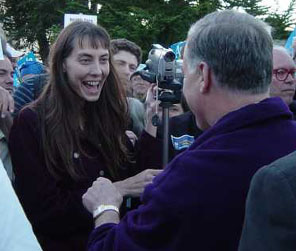
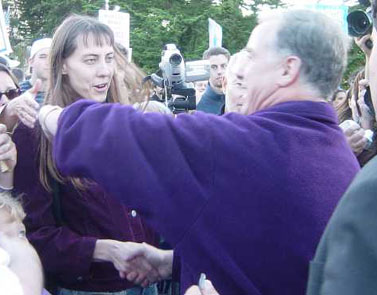
A friend of mine sent me this article yesterday in an attempt to inform me that Howard Dean was really a racist. I had to just laugh when I read the article, at first, because Dean's platform is so pro-civil rights and pro-racial equality that it was more than a little funny to me that anyone would be asinine enough to launch those allegations.
But when I read the article, I was more than a little angry at Al Sharpton. He had distorted the truth just enough to make Dean's intent sound questionable. I decided not to blog the article so as not to perpetuate the negative, inaccurate propoganda. And hoped it would just go away, I guess.
This morning, I awoke to a very pleasant rebuttle by Jesse Jackson, strongly criticizing Al Sharpton for his inaccurate remarks and reaffirming what I already knew about Howard Dean: that he is pro-civil rights and pro-affirmative action.
Thanks, Jesse!
Jackson Urges Democrats to Accentuate the Positive
Calls On All Democrats To Reject Racial Rhetoric
By Jesse Jackson, for t r u t h o u t.
Clearly, Gov. Dean is not anti-black and it is ridiculous for Rev. Sharpton to compare him to President George Bush in that regard. When it comes to addressing issues that directly affect African Americans, and indirectly affects all Americans, Gov. Dean clearly has good record. Up until this point - until I indicated my intention to endorse Gov. Dean - the Democratic campaign has been free of such racial rhetoric. I would recommend that it remain so. Such rhetoric will not contribute to defeating George W. Bush in 2004. Indeed, it will insure his re-election.
Here is the text of both articles in case the link goes bad. (The Al Sharpton article in the Washington Post is below the Jesse Jackson statement.)
http://www.truthout.org/docs_03/103003E.shtml
Jackson Urges Democrats to Accentuate the Positive
Calls On All Democrats To Reject Racial Rhetoric
Congressman Jesse L. Jackson
t r u t h o u t | Statement
Tuesday 28 October 2003
Congressman Jesse L. Jackson today said, "Al Sharpton is making a great contribution to the Democratic Party with his performances in the debates, his inspirational speeches on the campaign trail, his raising of the political consciousness of voters on issues that many of the other candidates will not touch, and by bringing new voters into the process.
"But no contribution of the Rev. Al Sharpton has been greater than the role he has played of statesman in the debates - of urging fellow competitors to `first do not harm' to one another. It was Al Sharpton who said in the first debate in South Carolina, televised by ABC, that the 'Democrats should not have a debate and George Bush turn out to be the winner.' He has constantly reminded his fellow Democratic presidential candidates that the goal is to defeat President Bush in November, 2004. He has also said that while he understands there will be competition between each of them, none of them should do any harm to the other candidates that would prevent them from defeating George Bush.
"Unfortunately, Rev. Sharpton has rejected his own advice. The spirit of Rev. Sharpton's release in that regard is over-the-top and mostly inaccurate. Rev. Sharpton is inaccurate when he says that Howard Dean is `opposed to affirmative action.' Even the 1995 quote he attributes to Gov. Dean is not a statement 'opposed' to affirmative action, but an argument for a broader criteria. More importantly, during this campaign Governor Dean has clearly stated for the record that he supports affirmative action based on race, gender and class - which is what the law requires.
"Whoever the ultimate nominee of the Democratic Party is I intend to support - and I will not agree with them on every issue. Gov. Dean and I may just have to agree to disagree on the death penalty. However, I would remind Rev. Sharpton that both he and I supported Bill Clinton in 1992 and 1996 even though he supported the death penalty and ending welfare as we know it - both of which we disagreed with.
"With respect to gun control, Gov. Dean supports all of the common sense FEDERAL laws and proposed laws with respect to renewal of the assault weapons ban, holding gun manufacturers responsible, adequately checking purchasers at gun shows. But beyond that he argues that different states have different needs, and I agree. Not every state values hunters and hunting equally and I respect and agree with Gov. Dean in that regard.
"I don't understand why I am being singled out. Rep. Major Owens, from New York, endorsed Gov. Dean some time ago, but none of these issues were raised. No member of the Congressional Black Caucus (CBC) has endorsed Rev. Sharpton, and there were other members of the CBC in the New York Times article who indicated that they too may be on the verge of endorsing Gov. Dean.
"I also don't understand Rev. Sharpton's attempt to introduce 'race' into the campaign by using such rhetoric as `anti-black' with respect to Gov. Dean. I challenge all of the other candidates to urge Rev. Sharpton to resist using such inflammatory rhetoric.
"Clearly, Gov. Dean is not anti-black and it is ridiculous for Rev. Sharpton to compare him to President George Bush in that regard. When it comes to addressing issues that directly affect African Americans, and indirectly affects all Americans, Gov. Dean clearly has good record. Up until this point - until I indicated my intention to endorse Gov. Dean - the Democratic campaign has been free of such racial rhetoric. I would recommend that it remain so. Such rhetoric will not contribute to defeating George W. Bush in 2004. Indeed, it will insure his re-election.
*****
http://www.washingtonpost.com/ac2/wp-dyn/A31895-2003Oct28?language=printer
Sharpton Calls Dean's Agenda 'Anti-Black'
By Brian Faler
Special to The Washington Post
Wednesday, October 29, 2003; Page A08
Democratic presidential candidate Al Sharpton launched a blistering attack on Howard Dean yesterday, accusing his rival of promoting an "anti-black agenda."
"Howard Dean's opposition to affirmative action, his current support for the death penalty and historic support of the NRA's [National Rifle Association's] agenda amounts to an anti-black agenda that will not sell in communities of color in this country," Sharpton said in a statement.
He said his comments were in response to a news report yesterday that Rep. Jesse L. Jackson Jr. (D-Ill.) plans to endorse Dean, the former Vermont governor and presumed front-runner for the 2004 Democratic nomination. Sharpton has had a long-standing rivalry with the congressman's father, Jesse L. Jackson, who twice ran for president.
"Any so-called African American leader that would endorse Dean despite his anti-black record is mortgaging the future of our struggle for civil rights and social justice," Sharpton said.
His statement cited a 1995 interview in which Dean appeared to question the need for affirmative action programs based solely on race. "I think we ought to look at affirmative action programs based not on race but on class," Dean said on CNN's "Late Edition."
Responding to Sharpton's comments, Dean's deputy campaign manager, Andi Pringle, said: "Governor Dean has always been a strong supporter of affirmative action, and he believes there is still a great need for affirmative action in America."
Until now, the Dean campaign's brushes with racial issues have been less vitriolic. Earlier this year, some critics, noting that Dean comes from a heavily white state and campaigns extensively via the Internet, questioned his ability to reach low-income and minority voters.
In a Sept. 9 candidates forum in Baltimore, Dean said he was "the only white politician that ever talks about race in front of white audiences." Several rivals pointed to speeches that disproved Dean's assertion, which Sen. John Edwards (D-N.C.) called divisive.
Donna Brazile, who managed Al Gore's 2000 presidential campaign, yesterday dismissed Sharpton's attacks as a ploy to boost his standing in the polls.
"I think Dean's record on civil rights issues, on affirmative action -- his willingness to talk about race in a very inclusive way -- has been refreshing," said Brazile, who is African American. "These long-shot candidates, all they're doing is taking aim at the top tier because they're frustrated. I think Reverend Sharpton should keep his focus on ideas."
Hi guys!
Okay the rally has been changed to 4pm at Lafayette Park on the corner of Laguna and Clay.
Show up early to help out and get a free T-shirt!
Here's the message I just received:
Lafayette Park and volunteer meeting point will be Clay & Laguna Streets...IMPORTANT CHANGE OF VENUE-
Sorry this is all so last minute folks.
The Rally tomorrow at 4:00 pm will be at LAFAYETE PARK at the corner of Laguna and Clay.
Any volunteers who can help I would appreciate it so much.Sorry for all of the confusion, just problem with permits, satellite trucks, and so on.
This location will not change.
Any further help with promoting the rally would also be helpful, but we really need 20 or so folks to come and help with our advance team. Any one who can come early and volunteer will of course get a free T-shirt (like you all don't have one already!!)
See you there!
Here's the announcement I received via email:
RALLY WITH HOWARD DEAN AND HEALTH CARE WORKERS IN SAN FRANCISCOWhen: Wednesday, Oct. 29, 4-5 PM Where: Lafayette Park and volunteer meeting point will be Clay & Laguna Streets...
California Pacific Medical Center's Pacific Campus, Buchanan at Clay, San FranciscoBefore Howard Dean attends a fundraiser in downtown Oakland on October 29, you can catch him at a FREE OUTDOOR RALLY in San Francisco, in support of health care workers. I understand that the street will be blocked off, and Governor Dean will address at least 1,000 health care workers from the flatbed of a pickup truck. THIS IS AN OPEN RALLY, so it would be great if instead of 1,000 people, we doubled or tripled or even quadrupled the crowd!! This is your opportunity to show how strong our support is for Howard Dean. So tell your boss that you had bad sushi at lunch, and BART into the city to join us all at the intersection of Buchanan and Clay, in Pacific Heights. Don't forget to wear your Dean t-shirts, caps and buttons, and carry your Dean for America signs!!
The dedicated health care workers at California Pacific Medical Center (CPMC) have been asking management for over four months to hold a fast and fair union election. Workers want a voice so they can improve their jobs and the quality of care for their patients. Instead of listening to the wishes of their employees, CPMC management has delayed and denied employees' right to organize. CPMC is owned by Sutter Health, the only major hospital corporation in California that has not agreed to refrain from employer interference when workers want to unionize.
For more information, go to www.seiu250.org or call Kevin Robbins at (415) 503-5729.
This is a great clip. And not just cause I'm a Deanie. This is just plain funny.
Steve follows Howard around at one of his speaking engagements, and then turns the tables and makes Dean get behind the camera to film the event.
Right on to Steve Carell for putting this together.
This piece was produced by Jim Margolis and edited by Einar Westerlund.
This is from the October 9, 2003 program.
Trail and Tribulations (Small - 12 MB)

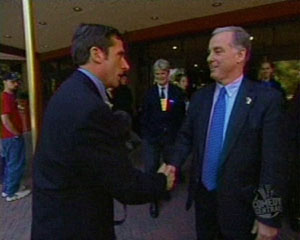
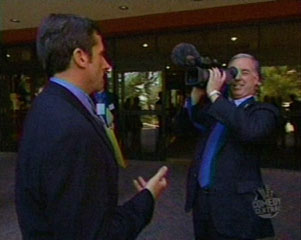
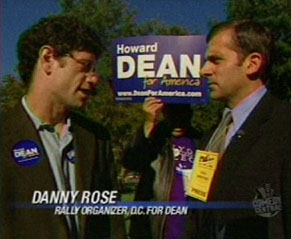
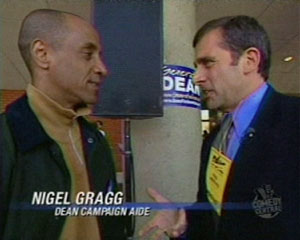
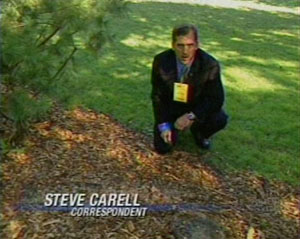
The Daily Show (The best news on television.)
This is from the September 30, 2003 program.
This was a classic appearance on The Tonight Show with Jay Leno. Looks like we've got Hollywood on our side!
Jay put together some hilarious clips (3 MB) of Dean as a street musician and Dean as Pete Townsend that are quite historical. One of them features Rob Reiner as a passer by.
Jay sure did his homework for this interview. We get to learn about how Howard decided to become a Doctor and how he managed to balance being a Doctor with his duties as Lt. Governor before the Governor died and he became the "big guy." We also learn about his favorite $125 JC Penny suit that he still owns to this day.
Howard Dean On Jay Leno - Part 1 of 2 (Small - 11 MB)
Howard Dean On Jay Leno - Part 2 of 2 (Small - 12 MB)
Howard Dean On Jay Leno - Complete (Small - 23 MB)
Howard Dean On Jay Leno - Funny Clip (Small - 3 MB)
Lawrence Lessig, Hal Abelson and Joi Ito from the Creative Commons, as well as hotshots David Reed and David Weinberger are participating:
Here is the full text in case the link goes bad:
http://www.deanforamerica.com/site/PageServer?pagename=technology_profile
Initial Members of the NAN Broadband Access Working Group
Hal Abelson, Laura Breeden, Lawrence Lessig, Bob Lucky, Dewayne Hendricks, Joi Ito, David Reed, Richard Rowe, David Weinberger
Hal Abelson
Harold (Hal) Abelson is Class of 1922 Professor of Electrical Engineering and Computer Science at MIT and a Fellow of the IEEE. He holds an A.B. degree from Princeton University and a Ph.D. degree in mathematics from MIT. He joined the MIT faculty in 1973.
In 1992, Abelson was designated as one of MIT's six inaugural MacVicar Faculty Fellows, in recognition of his significant and sustained contributions to teaching and undergraduate education. Abelson was recipient in 1992 of the Bose Award (MIT's School of Engineering teaching award).
Abelson is also the winner of the 1995 Taylor L. Booth Education Award given by IEEE Computer Society, cited for his continued contributions to the pedagogy and teaching of introductory computer science. He was also a founding director of the Free Software Foundation, and he serves as consultant to Hewlett-Packard Laboratories.
He is co-director of the MIT-Microsoft Research Alliance in educational technology, and co-head of the MIT Council on Educational Technology.
Laura Breeden
Laura Breeden has been working to expand public sector applications of new technology for nearly 20 years.
Currently, she directs the America Connects Consortium (ACC), based at Education Development Center in Newton, MA. ACC was established by the U.S. Department of Education in 2000 to strengthen community technology centers by providing training, information, tools, and other resources.
Ms. Breeden has worked in network services for a high-tech company in Cambridge, Mass., served as director of a federal grant program, and spent four years consulting in the areas of internet strategies and organizational development.
As a volunteer, she has served on the program committees for numerous conferences and is currently a member of the board of the Association for Community Networking.
Raised in Kentucky, Ms. Breeden has a B.A. in Urban Education from Oberlin College in Oberlin, Ohio.
Dewayne Hendricks
Dewayne Hendricks is an expert on wired, wireless, and high speed communications. He is CEO of Dandin Group, Inc., a Fremont, CA-based company which does research and product development in the area of broadband wired and wireless data devices and services, and serves as a member of the Federal Communications Commission (FCC) Technological Advisory Council (TAC).
Dewayne previously worked as General Manager of the Wireless Business Unit for Com21, Inc., and as Co-Principal Investigator on the National Science Foundation Wireless Field Tests for Education project. Dewayne was formerly co-founder and CEO of Tetherless Access Ltd., one of the first companies to develop and deploy Part 15 unlicensed wireless metropolitan area data networks using TCP/IP protocols.
He has participated in the installation of such networks throughout the world, including Kenya, Tonga, Mexico, Canada and Mongolia. For his work in deploying wireless systems in remote parts of the world, he's been dubbed by Wired magazine as the Ultrawideband Cowboy.
Joi Ito
Joichi Ito is the founder and CEO of Neoteny, venture capital firm focused on personal communications and enabling technologies. He has created numerous Internet companies including PSINet Japan, Digital Garage and Infoseek Japan.
In 1997 Time Magazine ranked him as a member of the CyberElite. In 2000 he was ranked among the "50 Stars of Asia" by Business Week and commended by the Japanese Ministry of Posts and Telecommunications for supporting the advancement of IT.
In 2001 the World Economic Forum chose him as one of the 100 "Global Leaders of Tomorrow" for 2002. Mr. Ito moved to the U.S. with his parents in 1970, attended junior high and high school in Japan, and returned to the U.S. in the mid 1980’s to study at Tufts University and the University of Chicago.
Lawrence Lessig
Lawrence Lessig is a Professor of Law at Stanford Law School and founder of the school's Center for Internet and Society. He is also chairman of the CREATIVE COMMONS. He teaches and writes in the areas of constitutional law, contracts, comparative constitutional law, and the law of cyberspace.
Prior to joining the Stanford faculty, he was the Berkman Professor of Law at Harvard Law School, and a Professor at the University of Chicago Law School. He clerked for Judge Richard Posner on the 7th Circuit Court of Appeals and Justice Antonin Scalia on the United States Supreme Court. More recently, Professor Lessig represented web site operator Eric Eldred in the ground-breaking case Eldred v. Ashcroft, a challenge to the 1998 Sonny Bono Copyright Term Extension Act.
Lessig was named one of Scientific American's Top 50 Visionaries, for arguing "against interpretations of copyright that could stifle innovation and discourse online." He is the author of The Future of Ideas and Code and Other Laws of Cyberspace.
Professor Lessig is a board member of the Electronic Frontier Foundation, a Board Member of the PublicKnowledge, and was a Commission Member of the Penn National Commission on Society, Culture and Community at the University of Pennsylvania. Professor Lessig earned a BA in economics and a BS in management from the University of Pennsylvania, an MA in philosophy from Cambridge, and a JD from Yale.
Bob Lucky
Robert Lucky is an engineer known worldwide for his writing and speaking about technology and society. He has led premier research laboratories in telecommunications over the last several decades, first at Bell Labs and then at Telcordia Technologies, where he was corporate vice president, applied research.
In October, 2002 he retired from this position. Now he devotes much of his time to professional activities, including advisory boards, studies, and consulting. He is the author of many technical papers and of several books, including Silicon Dreams and Lucky Strikes Again, and has also edited a number of technical journals and books on communications.
He also writes monthly columns for Spectrum Magazine. He received his doctorate in electrical engineering from Purdue University in 1961, and has been active throughout his career in professional, academic, and government roles. Dr. Lucky lives in Fair Haven, New Jersey, with his wife, Joan. They have two children and a dog, and live in an old house on a pretty river.
David Reed
Dr. David P. Reed enjoys architecting the information space in which people, groups and organizations interact. He is well known as a pioneer in the design and construction of the TCP/IP Internet protocols, distributed data storage, and PC software systems and applications. He is co-inventor of the end-to-end argument, often called the fundamental architectural principle of the Internet.
He discovered Reed's Law, a scaling law for group-forming network architectures. Along with Metcalfe's Law, Reed's Law has significant implications for large-scale network business models. His current areas of personal research are focused on densely scalable, mobile, and robust RF network architectures and highly decentralized systems architectures.
Dr. Reed currently splits his work time between the MIT Media Laboratory and Hewlett-Packard Laboratories. At MIT, he is Adjunct Professor of Media Arts and Sciences, and at HP Labs he is an HP Fellow. He also serves on a number of business and government advisory boards, including the FCC Technological Advisory Council, the DARPA Information Science and Technology study group. After earning his Ph.D.at MIT and serving as an assistant professor of computer science and engineering there, he spent 10 years in industry as vice president of research and development and chief scientist at both Software Arts and Lotus Development Corporation. For the last decade he has focused on disruptive technologies in network and computing systems, first at Interval Research Corporation and more recently as an independent researcher and advisor.
Richard Rowe
Richard Rowe is CEO of Rowe Communications, Inc. He received his Ph.D. from Columbia University in clinical psychology and was Associate Dean and Director of the Doctoral Program in Clinical Psychology and Public Practice at Harvard University. He has conducted research concerning, and has been an advocate for, early childhood education, has served as a member of the Massachusetts Board of Education and is currently chair of the Massachusetts Business Alliance for Education.
He served as Director of the Test Development and Research Office of the West African Examinations Council in Lagos, Nigeria for three years. He later became CEO of The Faxon Company, a $500m company serving publishers and libraries throughout the world and then founded an internet version of that service which he took public and then sold. Dr. Rowe has served on the MIT Press Management Board and the Board of Advisors of the University of Pittsburgh School of Information.
He currently serves on the Boards of N2H2, Inc. an internet filtering company, and Instatrac, Inc. an online publisher and a bill tracking and documentation service for the Massachusetts legislature. He is the author of numerous articles and frequent speaker on the impact of digitization and the internet upon society with a particular focus on access to and preservation of academic, scientific, technical and medical knowledge. Dr. Rowe is the Director of the Internet and Information Services Department of the Dean for America Campaign.
David Weinberger
Dr. David Weinberger writes and speaks about the effect of technology on culture and ideas. His work as appeared in Wired, Harvard Business Review, USAToday, Salon, The New York Times, and many others. He is a co-author of the national best-seller The Cluetrain Manifesto and the author of Small Pieces Loosely Joined. He is a columnist for Darwin Online and KMWorld and is a frequent commentator on NPR's "All Things Considered" and "Here and Now."
Dr. Weinberger has a B.A. from Bucknell University and a Ph.D in philosophy from the University of Toronto. He taught philosophy for six years before entering high tech, where he has been VP of Strategic Marketing and a strategic marketing consultant at innovative companies. He is currently a Senior Internet Advisor to the Dean campaign. He lives in Brookline, MA with his family.
This just in from the Dean Campaign:
Tonight -- Monday night -- more than 14,000 supporters of Howard Dean in
all 50 states will gather for house parties. Together they will set a
world record for the largest conference call in history when Governor
Dean makes his "National House Call" at 8 pm ET.But tonight's House Call is about more than setting a record -- it's
about sending Howard Dean into the final quarter of the year with the
financial strength he needs to win the nomination and defeat George W.
Bush in 2004.During the House Call, from 8 to 9 pm Eastern, I ask you to support the
efforts of more than 14,000 other Dean supporters by contributing to
Dean for America. Join tens of thousands of Americans who are making this
the September to Remember by contributing what you can tonight:
http://www.deanforamerica.com/contributetodayYou can also 'virtually' attend the house party -- and listen to
Governor's Dean's conference call -- by checking the campaign weblog
this evening at 9 pm Eastern:
http://www.blogforamerica.comYour contribution tonight will make a tremendous difference in our
efforts to raise the final $2 million of our goal before midnight
tomorrow.
Hey, "United we stand. Divided we fall" people.
Dean, Driven by the Grass Roots
Bottom-Up Strategy May Turn Politics Upside Down
By Lois Romano for the Washington Post.
"Did he simply unite the Bush haters or did he expand the base of the Democratic Party to something new and potentially potent? The jury is still out on that," said Richard Bond, a former chairman of the Republican National Committee. "If these are independent swing voters, soccer moms, who ebb between the two parties and decide elections, then that's a threatening development for Republicans."Dean campaign manager Joe Trippi said that anecdotal evidence suggests Dean's supporters are a mixed bag of the party's liberal base, reinvigorated Democrats who had either dropped out of the process or were never engaged and political independents who supported Ross Perot in 1992 and favored Sen. John McCain (R-Ariz.) in 2000. Trippi said he believes they will go to the polls for Dean.
Nine months ago, there were 427 supporters signed up for Dean online. Now about 413,000 people have signed up to join the Dean campaign -- and 150,000 of them have contributed money. This month, there are more than 1,200 local Dean events posted on the campaign Web site, generated almost exclusively by volunteers on their own steam and their own dime.
Here is the full text of the article in case the link goes bad:
http://www.washingtonpost.com/wp-dyn/articles/A44798-2003Sep21.html
Dean, Driven by the Grass Roots
Bottom-Up Strategy May Turn Politics Upside Down
Eighty Howard Dean volunteers in Philadelphia organized themselves and attended a Phillies game together in their Dean T-shirts. They were featured on the scoreboard. (Jennifer Powers)
By Lois Romano
Washington Post Staff Writer
Monday, September 22, 2003; Page A01
By day, Jennifer Powers is a grant-writer for a school for the deaf, a Gen X'er who in past elections was like millions of others who vote but don't pay much attention to politics -- and certainly don't lift a finger to help any particular candidate.
That changed for Powers a few months ago, when the 32-year-old Philadelphian, driven by a newfound passion, switched her voter registration from independent to Democrat and became an unpaid operative for Howard Dean's presidential campaign in Pennsylvania. Today, Powers sits on a Philly4Dean (philly4dean.com) steering committee she helped set up, overseeing grass-roots volunteers she helped recruit, and communicates online with a database of 2,000 prospective Dean supporters that she helped build.
She said she does this 30 to 40 hours a week after her day job and with only online direction from the Dean campaign -- and she is not alone.
Thousands of Dean supporters -- many of whom profess never to have been active before -- have taken to the streets on their own initiative to pass out Dean fliers at urban fairs and farmers markets, donate blood and clean up beaches in his name, and raise millions of dollars for the former Vermont governor at house parties.
Although few of these volunteers have ever spoken to anyone from the national headquarters, Dean, once among the least known of the Democratic presidential field, now appears to many to be among the best organized as he leads the pack in fundraising and surges ahead in polls.
Political strategists say that what began in January as a quirky, long-shot Internet strategy to attract online supporters to the dark-horse candidate could revolutionize presidential politics by minimizing the importance of television media and empowering grass-roots organizers. Advisers to Wesley K. Clark, the latest addition to the Democratic field, have indicated that the retired general will use a similar model and try to translate the success of the online Draft Clark movement into a national grass-roots organization.
"It's just extraordinary," said Dick Morris, a political consultant who advised Bill Clinton. "It's part of a new era -- back to basics. Howard Dean is using the Internet in an entirely guerrilla marketing approach. By this process, he's developed a massive grass-roots list. It's active and participatory, and people feel engaged. . . . You're brought in by friends and family. It's bottom-up, and people love that; they feel empowered."
Dean's field operation has taken on such a life of its own that campaign officials have been frenetically working to stay out ahead of it by continually developing Dean's already intricate Web site to better communicate with supporters and by starting to tap the largely unknown volunteers for specific projects. On Saturday, the campaign will dispatch to Iowa and New Hampshire 500 "Texas Rangers," Dean volunteers from President Bush's home state, to push for Bush's defeat next year.
Campaign officials have posted on the Dean Web site, www.deanforamerica.com, Federal Election Commission regulations that govern contributions of time and money to ensure the largely undirected, novice volunteers stay in compliance.
Tom Rath, a GOP New Hampshire national committeeman, said that what has impressed him about the Dean organization is its ability to turn out enormous crowds at events. "That tells me they are touching people that haven't been touched before. They have generated a system that no longer relies on the best signs or best precinct captains."
But Rath and other veteran political observers also emphasize that it is too early in the process to conclude that Dean's unprecedented cyber support is any more than just an extension of Internet chat rooms, which may or may not translate into votes. "The downside, I believe, is not knowing whether they will stick with him. Can you sustain this support through balloting?" Rath said. "Suppose they get some bad information on Dean, something contrary to his image. We have no idea how committed they are."
Indeed, what remains unknown and unsettling for Dean's primary opponents, as well as for Republicans, is who exactly these activists are -- and whether they will have a long-term impact on the process and stay with the Democrats should Dean not win the nomination.
"Did he simply unite the Bush haters or did he expand the base of the Democratic Party to something new and potentially potent? The jury is still out on that," said Richard Bond, a former chairman of the Republican National Committee. "If these are independent swing voters, soccer moms, who ebb between the two parties and decide elections, then that's a threatening development for Republicans."
Dean campaign manager Joe Trippi said that anecdotal evidence suggests Dean's supporters are a mixed bag of the party's liberal base, reinvigorated Democrats who had either dropped out of the process or were never engaged and political independents who supported Ross Perot in 1992 and favored Sen. John McCain (R-Ariz.) in 2000. Trippi said he believes they will go to the polls for Dean.
Nine months ago, there were 427 supporters signed up for Dean online. Now about 413,000 people have signed up to join the Dean campaign -- and 150,000 of them have contributed money. This month, there are more than 1,200 local Dean events posted on the campaign Web site, generated almost exclusively by volunteers on their own steam and their own dime.
"The great myth of American politics is that Joe Trippi is running the Dean campaign," said the campaign manager. "I've done six of these already in my life, and it's always been command and control from the top down. The challenge here for us has been to let people create their own energy."
Dean campaign officials, as well as volunteers throughout the country, insist that -- with the exception of Iowa and New Hampshire, where Dean had always planned to front-load resources -- the campaign has done little to direct this grass-roots effort. It's only recently, say campaign officials, as momentum has built for Dean, that the campaign has enhanced its Web site, offering more tools to enable supporters to communicate with the campaign and -- just as important -- with one another. "Deanlink," the newest tool, has attracted 10,000 people in two weeks.
Dean supporters first began self-organizing through Meetup.com, an independent and free Web site that enables people of like interests to meet in different cities. Initially, the campaign suggested only loose goals to tackle at the meetings. But at the July and August monthly meetings, in an attempt to use the tens of thousands signed up (113,900 as of now), the campaign asked each person in attendance to write a letter to the 50,000 undecided voters in Iowa and New Hampshire. The campaign provided stationery, stamps and the sentiment to be conveyed -- and generated about 60,000 letters to potential voters, some of whom received two handwritten notes.
In states with early primaries, Dean has recently hired paid staff to try to coordinate volunteer efforts. In Washington state, the campaign hired a coordinator to make sure the activists understand the caucus system of voting there and bring people to the polls on Feb. 7.
Trippi said that as balloting draws nearer, the campaign will dispatch "SWAT teams" into some states to organize volunteers. The campaign now lays out more specific goals and objectives on the Web site -- but largely leaves it up to the volunteers on how to achieve them. "In the next ten days of September, we're asking every Dean supporter to do at least one thing to increase the visibility of the grassroots in your community," the site advises, as part of its "September to Remember" promotion.
Similar stories of independent activism emerge in interviews with a number of volunteers who said they were drawn to the Web site after becoming impressed with Dean's blunt way of talking on a news show or by his antiwar stand.
Powers's Philadelphia group this month gathered 80 volunteers in Dean T-shirts to sit together at a Phillies baseball game -- and they were featured on the scoreboard. In Berkeley, Calif., Montessori teacher Laura Deal, 39, on her own, has distributed Dean literature at the local farmers market almost every Saturday since May, signing up hundreds of Dean volunteers.
Erica Derr, 34, a single mother from Greensboro, N.C., became curious about Dean when she saw a flier at her local library asking, "Do you want your country back?" Derr began working about eight hours a week for Dean. In July, when she received a $400 child tax credit check, she sent a letter to Bush informing him that she was mailing the check to Dean because she disapproved of the government rebate. On her own, she crafted a news release and faxed it to the Associated Press and the local paper, which published her letter.
Judy Weinstein, 44, an executive at a California entertainment company, is the self-appointed director of Dean's voter outreach for the San Fernando Valley and sits on a steering committee for the Los Angeles area. In June, with no direction from the campaign, she organized 14 volunteers over two days to man a Dean table at the Van Nuys Aviation Expo. It was the only table for a presidential candidate at an event that attracted 100,000 visitors a day.
Tim Cairl, an Atlanta health care consultant, said he became impressed with Dean when as governor Dean signed a civil unions bill in 2000 allowing all couples the same rights regardless of sexual orientation. Today, Cairl is the self-selected director of volunteers for Dean in Georgia and part of a self-organized steering committee overseeing Georgia for Dean (georgiafordean.com). He said he spends 30 to 40 hours a week setting up events, organizing house parties and guiding a growing stable of volunteers. "We take our cues from the national campaign and urge the volunteers to do it themselves," he said.
As for Powers -- she is having the time of her life, and for now Dean is her life. She has met any number of "very cool people" who work and play together and have taught themselves about grass-roots politics. But will she stay with the Democrats if Dean is not the nominee?
"This is a question that I have asked myself. I would certainly campaign against George Bush, but it would be difficult to work as intensely as I am working for Howard Dean. He feels less like politics as usual -- which is not what I am interested in."
Here's Howard Dean on the Sept 8, 2003 program of ABC's Good Morning America. (No website available.)
Howard took the opportunity to clarify several inaccuracies in the Shrub's September 7, 2003 speech regarding Iraq, where he states that Iraq has always had links to Al Qaeda. We know that, in fact, links between Iraq and Al Qaeda before the war have never been substantiated.
(In fact, there is evidence to the contrary.)
Howard Dean On Good Morning America (Small - 9 MB)
Here's Howard's speech from last weekend's SEIU 250 Leadership Conference in San Francisco on Saturday, September 6, 2003.
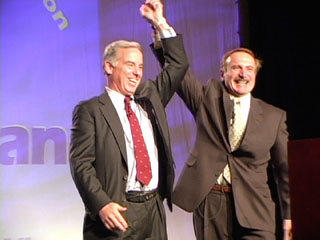
It was really an incredible event. The crowd was really into it and Howard gave a great informal speech.
I was lucky enough to run into him as I was coming down the escalators while he and his posse were on their way into the holding room. I called his name and waved -- I wasn't really expecting him to stop -- but he did stop and wait for me to come the rest of the way down so I could shake hands and say hi! What a sweetie!
(I resisted my hippy urge to give him a big old hug, although it is getting harder and harder to do that, because I really do feel like giving him a big old hug these days.)
Anyway, here's the speech. I've made it available in one large video file, two smaller video files, and in a single, and two smaller MP3s for those of you who might want to play the audio or use it on your radio show.
I'm also uploading the AIFF files of the audio for you DJs and professional folks to do with as you wish. (As of 11:15 am PST - these have about two hours to go until they are uploaded.)
Enjoy!
Video:
Howard Dean At the SEIU 250 Conference - All (Small - 53 MB)
Howard Dean At the SEIU 250 Conference - Part 1 of 2 (Small - 21 MB)
Howard Dean At the SEIU 250 Conference - Part 2 of 2 (Small - 32 MB)
Audio:
Audio - Howard Dean At the SEIU 250 Conference - All (MP3 - 30 MB)
Audio - Howard Dean At the SEIU 250 Conference - Part 1 of 2 (MP3 - 14 MB)
Audio - Howard Dean At the SEIU 250 Conference - Part 2 of 2 (MP3 - 16 MB)
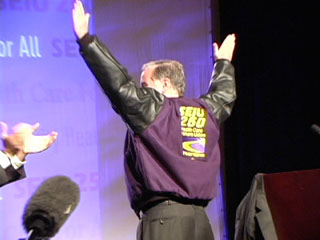
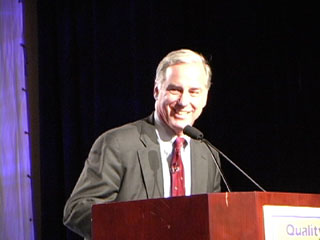
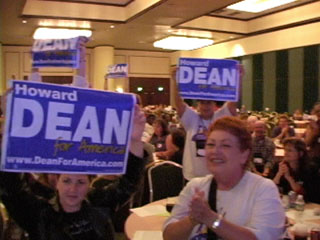
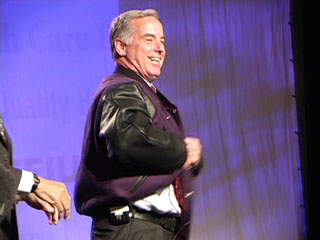
Here's a great informal interview with Howard Dean by Carlos Watson for CNBC's The Edge.
Howard talks about his policy, his son, you name it, and even plays some harmonica at the end.
This interview took place on an airplane in between campaign stops.
This program was aired on September 1, 2003.
Howard Dean On CNBC's The Edge - Complete (Small - 23 MB)
Howard Dean On CNBC's The Edge - Part 1 of 2 (Small - 11 MB)
Howard Dean On CNBC's The Edge - Part 2 of 2 (Small - 13 MB)
This aired on
Larry King Live on August 4, 2003.
I've provided the interview in "complete" and three separate parts.
There's also a rush transcript available.
Howard Dean On Larry King Live - Complete (Small - 54 MB)
Howard Dean On Larry King Live - Part 1 of 3 (Small - 19 MB)
Howard Dean On Larry King Live - Part 2 of 3 (Small - 19 MB)
Howard Dean On Larry King Live - Part 3 of 3 (Small - 16 MB)
Here is the full text of the article in case the link goes bad:
http://www.cnn.com/TRANSCRIPTS/0308/04/lkl.00.html
CNN LARRY KING LIVE
Interview With Howard Dean; Will U.S. Catch Saddam Hussein?
Aired August 4, 2003 - 21:00 ET
THIS IS A RUSH TRANSCRIPT. THIS COPY MAY NOT BE IN ITS FINAL FORM AND MAY BE UPDATED.
LARRY KING, HOST: Tonight, Howard Dean, the man everybody is talking about -- on this week's "TIME" and "Newsweek" covers. Will he be the one to take on President Bush?
Then, later, is the United States any closer to finding Saddam Hussein and those weapons of mass destruction? We'll talk postwar Iraq with Steve Kroft of "60 Minutes"; "L.A. Times" chief diplomatic correspondent and Middle East expert Robin Wright; another Democratic presidential hopeful, Florida Senator Bob Graham, former chairman of Senate Select Intelligence Committee; and Republican Senator Kay Bailey Hutchison, the chairman of the Military Construction Subcommittee.
They're all next on LARRY KING LIVE.
We begin with governor -- the former governor of Vermont Howard Dean. He's with us from Burlington, Vermont. If you saw the weeklies, they're out, he's on the front cover of "Newsweek," called "Howard Dean: Destiny or Disaster?". Front cover of "TIME", "The Dean Factor."
Governor, what do you make of all this?
HOWARD DEAN (D), PRESIDENTIAL CANDIDATE: Well, it's an exciting time in Burlington and around the rest of the country. I think it's basically time somebody stood up to this president and I'm glad our party is finally coming away.
KING: Why don't you -- why aren't you called doctor?
DEAN: Oh, some people do call me doctor. I am a doctor. I'm an internist. I practiced up until the day I became governor, almost 12 years ago.
KING: But the title you most often use is governor, right? I mean, you're not referred to as Dr. Dean?
DEAN: Some people do. I don't really care. You know, the old saying, I don't care what you call me as long as you call me on time for dinner. You know, truthfully most people call me Howard around here.
KING: Any cons to all this attention? There were pros, obviously. You forged ahead,. You're leading in some polls. Any downside to this? DEAN: Well, there's always a downside. I have a big target on my back from all the other campaigns on the Democratic side. But the good thing is it gives me a platform on how to talk about how to beat George Bush. And the only way to beat George Bush is to stand up to him.
I think in Washington the game for too long among the Democrats was let's try to be a little bit like him and that's not going to get us elected president and it's not going to get a Democratic president in the White House.
KING: Speaking of the others attacking you, yesterday, on Sunday, Senator Joe Lieberman, another candidate, compared you to George McGovern and described a party led by Dean as a ticket to no where. Today he spoke at the National Press Club. Here's what he had to say and we'll get your comment.
(BEGIN VIDEO CLIP)
SEN. JOE LIEBERMAN (D-CT), PRESIDENTIAL CANDIDATE: A candidate who was opposed to the war against Saddam, who has called for the repeal of all of the Bush tax cuts, which would result in an increase in taxes on the middle class, I believe will not offer the kind of leadership America needs to meet the challenges that we face today. And as I said in my prepared remarks, I believe that that kind of candidate could lead the Democratic Party into the political wilderness for a long time to come. Could be really a ticket to no where.
(END VIDEO CLIP)
KING: Your reaction?
DEAN: Well, obviously I don't agree.
I think the four candidates from Washington that voted for the war, Senator Lieberman, Senator Kerry, Senator Edwards and Representative Gephardt basically gave the president carte blanche in October to launch a preemptive strike and the evidence wasn't there.
Let's look at what the president said. He told us that he was buying -- that Iraq was buying uranium from Africa. That wasn't true. He told us -- or the vice president that Iraq was on the verge of obtaining nuclear weapons. That wasn't true. The president told us there was a clear link between al Qaeda and Iraq. That wasn't true. The secretary of defense told us he knew exactly where the weapons were, right around Tikrit and Baghdad. That wasn't true. So if I could figure that with my foreign policy team as a governor from Vermont, my question is why should we be led by people who couldn't figure that out and who voted to give the president unilateral authority to attack Iraq?
KING: Are you hurt, though, that a fellow Democrat taking you on like that?
DEAN: Listen, if that's the worst I get in this campaign, I'll be in good shape.
Look, these guys have worked hard. They want to be president. Any one of them would be better than the president they have now. But what our party really has to have is some backbone. We are not going to beat George Bush by voting for things like No Child Left Behind, which is a huge middle class tax increase, property tax increase. We're not going to beat him by doing as Senator Lieberman and others did, voting for some of the president's tax cuts because those tax cuts have really harmed our economy and taken jobs away from Americans; and we're not going to beat the president without casting a critical eye on the statements that he made leading up to the Iraq war, when so many of them have now turned out not to be so.
KING: You're not unhappy that Saddam Hussein is not in power though, are you?
DEAN: No, I think it's great that Saddam Hussein is not in power, but I would have approached it in a very different way. And I think the jury is still out in terms of how much danger to the United States this poses.
Now that we're there, we can't get out. We cannot afford to lose the peace. That's not an option. Now that we're there, we have to find a way to make sure that a chaotic situation doesn't develop or, worse, a fundamentalist regime with Iranian influence doesn't develop. And the first thing we really ought to be doing is bringing NATO and the United Nations in so we can send some of our reserves home.
KING: So if you were president tomorrow, that's what you would be doing?
DEAN: Yes, I would begin the process of going to the United Nations, getting a resolution to bring foreign troops in, preferably including some troops from Arabic-speaking nations and some Muslim troops so that we can make this truly an international occupation. I do believe it's a worthwhile goal to rebuild Iraq into a democracy. I think that's unlikely to happen with this president, given his track record in Afghanistan.
I support the president's invasion of Afghanistan because I thought that was an issue for national security of the United States. But I think what s happened since then has been a very bad harbinger of what the president may do in Iraq.
We're under -- we have probably a fifth of the number of troops that we need to have in Iraq -- excuse me, in Afghanistan. The president is making deals with the warlords, who are certainly not Democratic forces. i think things look bad in Afghanistan. We need the U.N. and NATO to come in and help us there. And the problem is the president has managed to alienate and humiliate all the very countries that we now need to help us maintain the peace both in Afghanistan and in Iraq.
KING: How do you react that so many conservative Republicans, some, many on the extreme right, want you to be the candidate? They think you would be the easiest one to beat. DEAN: Well, I welcome that challenge. You know, they all say, Well, he's so liberal. Well, if liberal is balancing budgets, please do call me a liberal. No Republican president has balanced a budget in 34 years in this country. If you want jobs and investment in this country, you're going to have to have a Democrat because the Republicans simply can't handle money.
KING: You actually think, though, out of nowhere, you could win this?
DEAN: I do. I really do.
This is an insurgency candidate, a candidacy. We are way ahead of where I ever thought we were going to be and I really do believe that most Democrats in this country want someone who is going to take on the president directly and is not afraid to do that and doesn't focus every position based on what the polls say and what his focus groups say.
Look, I don't check the polls before I take positions and it has gotten me in trouble before. I also don't always check carefully about when I say what I think. And that's gotten me in some trouble before. But what the American people are going to see, should I get the nomination, is a Democrat who is not afraid to be a Democrat again.
KING: We're going to take a break. When we come back, we'll get to some specific issues with Howard Dean, the Democratic presidential candidate, the former Democratic governor of Vermont. Again, he's on the front cover this week of "Newsweek" and "TIME." Major frontpage story in "The Washington Post" yesterday as well.
Right back with more with the former governor of Vermont right after this.
(COMMERCIAL BREAK)
KING: Our guest is Governor Howard Dean, the former governor of Vermont. He's also a medical physician. He has been a major scorer on the fund-raising campaign, I'll ask about that in a minute. But he's also been running a television commercial in Austin, Texas. And we want to show you a portion of it. Let's watch.
(BEGIN VIDEO CLIP, COMMERCIAL)
DEAN: I'm Howard Dean. I'm running for president, and I approved this message because I want to change George Bush's reckless foreign policy, stand up for affordable health care and create new jobs.
You know, when you think about it, in the past two and a half years we have lost over 2.5 million jobs. And has anybody really stood up against George Bush and his policies? Don't you think it's time somebody did?
Visit my Web site, join my campaign, because it's time to take our country back.
(END VIDEO CLIP)
KING: Did you gear that so the president could see it while he's on vacation?
DEAN: We actually didn't do that, air it so the president could see it so he's on vacation. We have an enormous amount of support in Austin, and we think there's a reasonable chance that we can win the Texas primary. And you know, I think it's unlikely we're going to win Texas during the general elections, but we need to play hard in Texas.
One of the things that I thought was a mistake that the Democratic Party did was to lay down in some states, because what happens is we need to excite the base. My whole campaign, the difference between my campaign and all the other guys' from Washington campaign is I believe we need to go to the Democratic base first. We have forgotten who put us in office.
We need to get them energized, and then we need to bring new people into the process. You saw the Web site, DeanForAmerica.com. That Web site has generated over a quarter of a million people who are now supporting us. The fund-raising, you talked about the fund- raising, we raised more money than anybody else in any quarter. We did that because 93,000 people gave us money. Most have never given money to a political campaign, and the average gift was well under $100.
That's how you beat a president who can get as many $2,000 checks as he wants, is to bring three or four million new people into the process, give them a reason to vote, and then you can beat George Bush.
KING: Let's talk about other issues. The president said he wants to codify a law that secures the fact that there will be no gay marriage. Vermont has what, gay union?
DEAN: We have civil unions, which gives equal rights -- doesn't give marriage, but it gives equal rights in terms of insurance, employment rights, inheritance rights, hospital visitation, to every single Vermonter, no matter who they are.
You know, interestingly enough, Dick Cheney took a position in 2000 in the debates that is not very different than mine. He said, this is not a federal issue. I really am inclined to leave this matter to the states, and I think we ought to let states figure out how to give equal rights to everybody in the way that they do it. So I think this is kind of a political issue at the federal level, but the power to decide these things really belongs to the state level.
KING: All right. On your own state level, if it were a referendum, would you vote for gay marriage?
DEAN: If what were -- we don't have a referendum in my state, and we have civil unions, and we deliberate chose civil unions, because we didn't think marriage was necessary in order to give equal rights to all people.
Marriage is a religious institution, the way I see it. And we're not in the business of telling churches who they can and cannot marry. But in terms of civil rights and equal rights under the law for all Americans, that is the state's business, and that's why we started civil unions.
KING: So you would be opposed to a gay marriage?
DEAN: If other states want to do it, that's their business. We didn't choose to do that in our state.
KING: And you personally would oppose it?
DEAN: I don't know, I never thought about that very much, because we didn't do it in our state for that reason. The body politic agreed in our state that it wasn't the thing to do, so we didn't do it.
I'll tell you what I will do, though. If Massachusetts decides that they're going to do gay marriage, I believe there is a federal involvement, and the federal involvement is not to recognize marriage or civil unions but it is to recognize equal rights under the law. So that if a couple enters into a domestic partnership, or a gay marriage in Canada, or a civil union in Vermont, I think those couples are entitled to federal benefits.
KING: What do you think of the recall of Governor Gray Davis in California?
DEAN: I think that the recall of Gray is probably a mistake. I think that -- this is another attempt to overturn an election that was a legitimate election by the right wing. Darrell Issa, congressman from Southern California, very wealthy, very, very conservative, really paid for the recall effort himself, and I think it's better not to upset legal elections. We saw that -- something like that happening in the election in 2000. There were a lot of people who still don't think that was the right thing, and I myself -- I believe we don't really know who won that election. I think it was a shame the United States Supreme Court decided to stop the recount. And I don't think you want in the most populous state in the country another attempt at overthrowing a legal election by the conservative right.
KING: The latest issue of "U.S. News and World Report" says that the chairman of the Democratic National Committee, Terry McAuliffe, went to the campaigns of all of you and said that if it was mathematically clear that the party had a nominee, he wanted every loser to drop out, and that you refused. Is that true?
DEAN: Well, I am not aware that Terry McAuliffe -- Terry McAuliffe has certainly never had a conversation like that with me. I checked with my campaign, and I never heard of anybody he had that conversation with in my campaign, so I'm not aware that such a conversation ever took place.
I believe, however, that what I'm trying to do in addition to becoming the next president is to build this party back so that we aren't under the thumb of the Rush Limbaughs and the Tom DeLays of the world. I really think that in order to bring new people into the party that I've got to stand up and be proud to be a Democrat the whole way through, be proud of who I am.
KING: Do you have to...
DEAN: But I'm not inclined to drop out, but I never had that conversation with Chairman McAuliffe.
KING: But you're inclined to have your delegates stand up for you in convention?
DEAN: Well, yes, not only do I plan to have my delegates stand up for me in convention, I hope very much there's going to be a majority of them.
KING: How do you account for all this fund-raising?
DEAN: It's average people in my party and independents. You know, I was in a fund-raiser in San Diego at 8:00 in the morning, which is sacrilege in California, and we had Perot people, we had McCain people, we had Green Party people, and we had a huge number of Democrats. There are a lot of independents and Democrats who don't think huge budget deficits are a good thing, who were really upset about the nearly three million private sector jobs that this president has lost, and upset, frankly, about his foreign policy, which appears to be based on things that the president didn't think were necessary to share with the American people.
So I think by standing up and being who you are, people reward you for that. There are going to be some things that people don't agree with me on, but they're going to know where I stand and they're going to know that I'm not going to be afraid to tell them what the facts are.
KING: Any thoughts on the reports that Colin Powell intends to not stay another four years if Bush is reelected?
DEAN: Well, I wouldn't be surprised. I admire Colin Powell a lot, and I read his books, and I think that if the president had listened to Colin Powell we probably wouldn't be in Iraq right now.
I think that, like Christy Whitman before him, the president tends not to listen to voices of moderation. I think Secretary Powell is a voice of moderation. It doesn't surprise me that he might be pretty frustrated with his inability to get much policy headway in the Bush administration.
KING: Would you say, Governor, that you will have to move more towards the center? Is the center where American politics lies?
DEAN: Larry, I am in the center. I balanced budget. The president hasn't done so. I believe that states have the right to make their own gun laws, after enforcing the federal laws vigorously. I believe that we ought to have health insurance for every single American. Harry Truman put that in the Democratic Party platform in 1948. There's nothing that's not centrist about me. I just think that the party and the electorate, the Republican Party and even my own party has simply moved too far to the right.
KING: We'll take a break, come back, take a few calls for Howard Dean. Then our panel will assemble. You're watching LARRY KING LIVE, don't go away.
(COMMERCIAL BREAK)
KING: Before we take a call for the governor, your comment, Congressman Dick Gephardt will get his 10th major from Organized Labor. Apparently the United Steel Workers of America about to support him. Any comment?
DEAN: Dick has been long friend of labor. Actually, I think I was their second choice, I was the machinist second choice and that's not a bad place to be. I commend him for that and wish him well.
KING: New York City, as we go to some calls for Governor Howard Dean, hello.
CALLER: Hi. Governor Dean, I have been so impressed by you ever since I saw you on "Meet the Press." And I'm going to my first Dean meeting this week. And my question for you is that many Democrats believe that if not for Ralph Nader staying in the election that we wouldn't have George Bush as a president.
So my question to you is, if you do not get the Democratic nomination, will you still run on the independent ticket?
DEAN: No, I will not.
CALLER: If so, how will that impact the upcoming race?
DEAN: I will not run as independent. I will support the nominee. It is essential that George Bush not be re-elected for the future of this country. It is essential for our economy. It's essential, so we can regain the respect we had around the world. And I will under no circumstances run as a third party and independent. I will back the nominee. I hope I am the nominee because I can bring about half those votes that voted for Ralph Nader back into the party. That's how we are going to win. And I think at this point there is no other evidence that any of the other candidates can do that and I think that's why I'm the most likely to beat George Bush.
KING: Santa Cruz, California, hello.
CALLER: Hi Governor Dean. My question to you is, given your medical background and your view on states rights, in your opinion, what should the federal government do about medical marijuana?
DEAN: I don't think they should throw people in jail in California, but I think do think -- here's what I think. I think the process by which medical marijuana is being legalized is the wrong process. I don't like it when politicians interfere in medicine. It's why I am very pro-choice. Because I don't think that is the government's business. So what I will do as president is, I will acquire the FDA within first 12 months to evaluate marijuana and see if it is, in fact, a decent medicine or not. If it is, for what purposes -- for certain purposes, and I suspect it will be for cancer patients and HIV/AIDS patients. And it should be allowed for that. But I suspect it will not be allowed for things like glaucoma. But we have to do the FDA studies. I think marijuana should be treated like every other drug in the process and there shouldn't be a special process which is based on politics to legalize it.
KING: Wilmington, North Carolina, for governor Howard Dean. Hello.
CALLER: As a real Democrat, and a avid Dean supporter, I was wondering what qualities you would be looking for in a vice presidential running mate and if you would consider one of the well qualified women that we have in public service for the Democratic party?
DEAN: Well, first, A, let me thank you for your help and support, and B, when they say that it is much too early to talk about my running mate. I've got a long way to go and it's nice to be in the position I am right now, but five months before the first primary and caucuses are five an a half months. I do have some ideas. I think the first qualification, and Bill Clinton did this very well, choose somebody who could be president of the United States. That is the thing that you have got to do. Bill Clinton choose Al Gore, who would have be a very good president. Secondly, I'm going to look for somebody with a Washington background. Because the biggest mistake governors make, when they go to Washington, they don't know how to deal with the system.
It is a different world inside Washington than it is everywhere else in the country, which helps me as a candidate because I know that world and it's tougher for the Washington candidates. But to governor you have to get something done. Thirdly, you look at region. The south is a region I am always very interested in as somebody from the north. And finally you take into account the most important constituency groups and women are as important constituency groups, as are African-Americans and Latinos and others. So, all those things go into a mix. We won't work on that for quite some time because I think it would be a little cocky to start picking your vice presidential running mate with -- having won only one primary and that didn't have any delegates and that was the moveon.org primary.
KING: Kingston, Ontario, hello.
CALLER: Yes, hello. Many Democrats voted to go to war, why are they now seeming to back track and withdraw their support to President Bush. And do you agree -- do you not agree with the war any more and trying to win the 2004 elections because no weapons of mass destruction were found? I think...
KING: I'm sorry, I didn't mean to cut her, but I think we get the gist of the question -- governor. DEAN: I'm not sure the caller understood that I did not support the war and only one of the four or five candidates that you have spoken for tonight. All though, Bob Graham didn't support war and Dennis Kucinich didn't support the war either. But the candidates you have spoken about Lieberman, Senator Kerry, Representative Gephardt and Senator Edwards did all support the war. I didn't support the war because I don't think the president made the case. I supported the president, as I said before, in Afghanistan because I thought that was a matter of national security. I supported the first Gulf War. But you don't send troops to war without explaining clearly and frankly to the American people why they have to go. And what this president said was, mainly, gave -- made a number of assertions that were not factual.
The argument that I make and some people say as Senator Lieberman did if you didn't support the Gulf War you can't be elected president. I actually believe, that if you're a Democrat and did support the Gulf War, it calls into question your judgment in one of the most serious question or actions any president will have to take, which is sending American citizens to die on a foreign land. When you make that decision you ought know the facts. You ought to ask a lot of questions. If I can figure out that the facts weren't accurate, why couldn't they figure that out in Washington? So, I think not supporting the war is an advantage principally because it shows that I am willing to use very, very tough judgment and it stands against the grain of the president of the United States and many Americans and standing up for what I believe in. Just as John F. Kennedy did in during the Cuban missile crisis in 1962.
KING: We'll see lots more of you governor. Thanks for very much joining us tonight. We expect to have you in debates as well.
DEAN: Thanks.
KING: Governor Howard Dean, coming to us from Burlington, Vermont. The former Democratic governor of the state of Vermont.
When we come back, our panel of Steve Kroft, Robin Wright, Senator Bob Graham, and Senator Kay Bailey Hutchinson will discuss Iraq and other things right after this.
(COMMERCIAL BREAK)
KING: Let's meet our panel. In New York, Steve Kroft, the co- editor and correspondent of CBS News' "60 Minutes." In Washington, Robin Wright, chief diplomatic correspondent of "The Los Angeles Times" and author of "Sacred Rage: the Wrath of Militant Islam." In Chicago is Senator Bob Graham, Democrat of Florida, former chair of the Select Committee on Intelligence, member of the National Security Caucus, and a candidate for his party's nomination for the presidency; indeed on Wednesday he is starting a campaign trip through Iowa.
And in Dallas, Senator Kay Bailey Hutchison, Republican of Texas, chairman of the Appropriation Subcommittee on Military Construction, member of Veteran Affairs Committee, and vice chair of the Senate Republican Conference. I'm going to ask Steve and Robin to comment first on Governor Dean, and then we'll get into our discussion of Iraq. Senator Graham, of course, is one of his opponents. Senator Hutchison is in the other party.
Steve Kroft, what do you make of this Dean thing?
STEVE KROFT, CBS NEWS: You know, I think that you made a reference to him, somebody saying that he was the George McGovern -- he may also turn out to be the Eugene McCarthy, an unsuccessful Democratic candidate, but certainly one who was able to shift the political debate in the country in 1968 and focus it on the Vietnam War.
He clearly has some support, both in the left wing of the Democratic Party and the right wing of the Republican Party, not -- and in the case of the Republicans, not just because they think he may be a candidate to beat, but because there are many people in the Republican Party who feel the same way about the war. I think it's going to be interesting to see what happens with the vast majority of sort of centrist voters in the next few months ahead.
KING: Robin Wright.
ROBIN WRIGHT, "LOS ANGELES TIMES": Well, how Dean is perceived by the American public may be dependent on event a year from now, in the run-up to conventions before the election. We see two very important events. One is the election in Iraq for government, and then also the election for the first permanent government in Afghanistan. These are the two most ambitious foreign policy items on the Bush agenda, and it's quite likely that they will come to a head. We'll see whether the United States is able in a very short period of time to re-create nations.
And if the administration is successful, then Howard Dean may find that his support is in trouble. If the administration is still facing, you know, regular attacks in Iraq and the warlords are prevailing in Afghanistan, then someone who has taken a position Howard Dean has may have an appeal to the American public.
KING: All right, Senator Graham, we'll get into politics at other times when we're running and we have got them on together, so you can respond to what Governor Dean said. But on the Iraq situation, and you're involved in intelligence, what do you hear about the hunt for Hussein?
SEN. BOB GRAHAM (D-FL), PRESIDENTIAL CANDIDATE: I would like to just comment a moment on what Robin just said. I think there are two things that are going to shape American opinion about a year from now, but they aren't the two she listed.
I think they are jobs, whether this stagnant economy is moving again, and, second, the condition inside Iraq. Are we still losing an American a day, are we still spending $1 billion every week in that occupied country? As to Saddam Hussein, I know that that is getting a very high priority. We have, of course, already killed his two sons; his daughters have fled the country. I think we will eventually find Saddam Hussein, probably somewhere inside Iraq.
KING: Senator Hutchison, what do you hear?
SEN. KAY BAILEY HUTCHISON (R), TEXAS: Well, we think that we are on his trail. We think that the capturing and killing, actually of the sons gave us a lot of information, and we -- our people think we will find him, and that it will be sooner rather than later, and all of us hope so.
But, you know, we've tried before. He certainly has a lot of places to hide in Iraq, and so it's, you know, you don't want to get your hopes up.
KING: Steve, is his capture, would you call it a necessity?
KROFT: I think it's very important. I think it's very important, and I think it was downplayed at the beginning by the administration. And I don't think that -- I think clearly the killing of his two sons has done a lot towards allaying some fears among the Iraqi people that he has the potential to come back into power. But I think as long as Saddam is alive, as long as he has people under his influence, people who he's paid a lot of money to, I think you always run the risk of at least in the minds of the Iraqi people, of the possibility of him returning to power.
KING: Robin?
WRIGHT: Indeed. Three of the four groups that are targeting American troops in Iraq are people who were once loyal to Saddam Hussein, his intelligence, Baath Party members and the Fedayeen, the kind of thugs within the military.
And once Saddam Hussein is captured, that's going to pull the rug out from those who may have been willing to target the United States because they thought Saddam Hussein still stood a chance.
And I think it also will deal a real blow to -- in that so-called Sunni triangle, the area north of Baghdad where so many of the attacks have taken place. This is Saddam Hussein's heartland. This is the area that could be the most trouble for us over the next year, and so getting Saddam Hussein plays out on a lot of other levels, as well.
KING: Senator Graham, what do you make of the search for weapons of mass destruction? Is that a political necessity?
GRAHAM: Well, Larry, where we are now is we have a whole series of searches under way. We are searching for Osama bin Forgotten, we are searching for weapons in Iraq, we're searching for Saddam Hussein. We're even searching for whoever sent those anthrax letters out in the fall of 2001. It's important that in each one of those, we determine who and what was responsible and detain the individual. If we don't, the confidence of the world in the United States, the confidence of the American people in their intelligence, their law enforcement and their president will be severely eroded.
KING: Senator Hutchison?
HUTCHISON: Well, I do think that we will find weapons of mass destruction. We know he has chemical weapons, because he's used them, and I think it's important that we see the evidence of that. I think you have to go back and look at what the president was looking at when he decided to target Saddam Hussein. He had just been through a 9/11, where we were not prepared, where we didn't put all the information we had together to protect our people, and he sees evidence that Saddam Hussein will not let the weapon inspectors do their jobs, and we know he's used these weapons before, and he knows that there is a connection with terrorists.
So the president is saying, am I going to have another 9/11 with the weapon of mass destruction funded by Saddam Hussein, and the answer for the president was no. And I think that has to be looked at in the context of what he knew at the time and what he had seen after 9/11.
KING: We'll take a break and come back with more. We'll also include some of your phone calls. Don't go away.
(COMMERCIAL BREAK)
(BEGIN VIDEO CLIP)
(EXPLOSIONS)
(END VIDEO CLIP)
KING: Memories of the war in Iraq.
Steve Kroft, are you concerned about al Qaeda and American domestic security?
KROFT: Absolutely. And obviously Tom Ridge and the president are too, given the warnings that were issued a few days ago. I think that's going to be an ongoing threat that we're going to have to deal with, probably forever and I don't think that -- I think that there's a good chance that it will come and will come again at the time that we least suspect it.
KING: Robin, is it a certainty? Is something going to happen?
WRIGHT: Well, I think so. I think, though, the pattern of terrorism in the past, the last two decades, in fact, has been that they, as Steve said, of, you know, when no one expects us.
And not necessarily on aircraft. I think that we're -- there's such security now around airports that it's much more difficult and that they'll look for something, perhaps, a little bit more imaginative.
But, I think, you know, while we've been focused so heavily on Saddam Hussein and capturing him lately, the real threat to the United States really is Osama bin Laden and he is a much bigger fish for us to try to catch.
KING: Senator Graham, are the fears warranted?
GRAHAM: Absolutely, and -- but unnecessarily. The reason, Larry, that I voted against the authorization to go to war against Iraq was not because Saddam Hussein was less than an evil person. It was the fact that he wasn't the greatest evil, the greatest threat to the people of the United States. That was al Qaeda and its leadership and Osama bin Laden.
By diverting our attention to Iraq, we allowed al Qaeda to regenerate, regroup and now, again, been cited as a major threat to the people of the United States.
KING: And Senator Hutchison, do you buy the fears?
HUTCHISON: I'm very worried about securing America because we are such a large country and we are free people, and it's very hard, of course, to secure our ports and secure our transportation infrastructure and all of our buildings and our water supply and our food supply. But we are making every effort possible and I think we have closed many loopholes that we had and I do think the aviation security is getting better. It's not where we need it to be yet and I think these current reports that we have that they may be targeting airlines again must be taken seriously.
KING: All right. In another area, Steve, what do you make of all these reports about Colin Powell?
KROFT: Well, it certainly would not surprise me if he left the administration. Not very many secretary of states stick around for two terms.
I've got to believe that this has been a very frustrating experience for him, at least at some levels. And I, you know, I believe that it's entirely possible.
KING: Robin, do your sources tell you that he disagreed with a lot of what the administration was doing, as Governor Dean said?
WRIGHT: Secretaries of state traditionally take a position that reflects America's foreign policy interests and often is in conflict with what the Pentagon wants or believes. That's not new to this administration.
Having said that, however, it is quite clear that there have been some very fierce policy battles over some critical issues involving American troops and going to war against other nations. I think Powell has always, long before 9/11, thought that he would be a one- term secretary of state. The last secretary of state to stay longer than one term was George Schultz in the 1980s, during the Reagan administration.
I think Colin Powell having spent years overseas as a soldier, having been national security adviser and chairman of the Joint Chiefs of Staff, both jobs in which he had to travel an inordinate amounts, has made him kind of interested in staying home, being with his family finally. He's a guy who loves to tinker on old cars, particularly Volvos. And this is a time, I think, that he wants, having been out there to look at other sides of life. He is, after all, not a young man any more.
KING: Senator Graham, are you surprised?
GRAHAM: Not surprised. I commend General Powell for the voice of reason and moderation that he has been in this administration. I imagine that he has had a number of disappointments when his advice was not taken.
Larry, I would like to go back a moment, however, to comment that my colleague Senator Hutchison made about the state of our security. Recently, I think last night, in fact, there was a "60 Minutes" segment about the state of our seaports. That is just one example of an area in which our homeland security program has had a lot of rhetoric, a lot of words, but we have not put the resources behind protecting one of our most vulnerable sites, America's seaports.
KING: All right. I got to get a break, but I'll have Senator Hutchison respond to that and her thoughts on Colin Powell. We'll take some calls as well.
We'll be right back.
(COMMERCIAL BREAK)
KING: Before Senator Hutchison responds, Steve Kroft, you did that piece on the seaports, right?
KROFT: I did, and Senator Graham's absolutely right. There has nothing been done.
I will say that it is a huge problem, and you've got hundreds of thousands, millions of these containers, cargo containers, coming into the country everyday, Lord only knows where from. Not good documentation, you can't search all of them, the search may be 10 percent, physically. Less than that, I believe.
And like the border issue. I mean, some of these problems are so staggering -- how do you deal with the border with Mexico? How do you deal with the border with Canada, where you in -- in many case, you can just walk across a field in Minnesota. You've got supposedly, according to some Canadian officials, 50 al Qaeda operatives that they believe are there.
KING: Senator Hutchison, your response?
HUTCHISON: Well, I think that everyone is saying the same thing. We are very concerned. This is a huge country and we have porous borders and our ports are vulnerable. There's no question about it. And I know Steve did a really strong piece on that just recently. And I think a lot is being done, but are we finished, are we where we need to be, absolutely not.
KING: Spokane, Washington, as we go to some calls. Hello.
CALLER: My question is for Senator Hutchison. Thank you for taking my call. She states Saddam does have these weapons of mass destruction. In her opinion, where are they if he does and why are our boys still dying after the death of Uday and Qusay Hussein, what credibility does President Bush have left after lying about...
KING: That's a lot of questions. Synthesize that Kay.
HUTCHISON: We know he has chemical weapons because he used them on his own people up in the north against the Kurds. And so with that kind of information, we are looking for other evidence, and I think we will find it. But I don't know where. But I do know that it is important that we continue to look for it and find it. I am very concerned about the deaths of our soldiers, that just seem to happen every day or every other day. And I think that is keeping America on edge. But I do think finding Saddam Hussein will make a big difference. We're not getting the cooperation from the people because they are afraid that if they help Americans they will be killed themselves or Saddam Hussein will come back and begin the torture of these people who helped Americans. So, it has been very difficult for our people to get the information that we need to find Saddam Hussein and show the Iraqi people that this man is gone, and they will be able to have a life if they will work with us give themselves a chance at freedom.
KING: Fremont, California, hello.
CALLER: Hi. My question is directed towards Steve. Do you think with the capture of Saddam Hussein it will possibility cease the attacks on the American troops or do you think it could possibly get worse?
KROFT: I think it's one of those things right now that is impossible to know. The biggest problem that we're going to have there, even with Saddam gone is that we are, in effect, occupying a country that we invaded that has very different customs, very different religion, very different language. And just historically that's a very difficult situation for our troops to be in. The longer that we will be, the we will have to try and enforce security measures, laws, being involved in the selection of a new government, it is going to invite people from all different political beliefs to lash out at the presence of the American forces.
KING: Robin Wright, how long we going to be there?
WRIGHT: Well the administration is hoping for elections next year that would turn the civil administration over to Iraqis themselves. And during the interim between now and then there is this 25-member council that's been formed to help the civil administration lead by Jerry Bremer to make the decisions about the day-to-day operation of Iraq. The broader issue, really, is security and how long will American troops be there?
And that's really what's at the heart of the great controversy. I think to address the previous question, one of the issues is that some of these politicians who are reemerging in Iraq are bringing their own little militias with them, there own -- whether they're guards and just a small force or whether there are hundreds of people who have been trained over the years and in some cases even thousands of people trained in the Kurdish areas, in neighboring Iran and elsewhere, That's where you're beginning to see the kind of Lebanonization of the potential, anyway, for the Lebanonization of Iraq and that's a very worrisome phenomenon. Even if you get Saddam Hussein and eliminate some of the forces who have been, some of his loyalists who have been attacking American troops. This conflict, the danger of strike inside the country and for Americans to get involved in it plays out in other ways, as well. And that's very worrisome.
KING: Salt Lake City, hello.
CALLER: MY question is for Senator Graham. I want to know why no one in the Democratic party is questioning the president's personal credibility because of -- first of all his illegal stock trade in Hark and Energy scandal. And second of all the fact that over a year in the national guard his last year, he was AWOL. To me, that doesn't make a military leader.
GRAHAM: I think there are a number of people, Democrats and Republicans and independents who are questioning the credibility of the president who took us to war on what is now proven to be and he should have known or he knew it at the time he spoke the words unreliable. I think the American people are also focusing on the fact that the president did not prepare us for what has happened in a post- war Iraq.
Did you hear the president say it was going to cost $1 billion a week?
Did you hear the president say, we might be losing one American a day.
Did you hear the president say we're going to be there for five years?
No. That's the reality. That was information that was withheld from the American people.
KING: Senator Hutchison, want to respond?
HUTCHISON: Well, first of all, I think the question is going back to a previous campaign. And I think President Bush is going to stand on his record. And I think his record and stepping up to the plate on the war on terrorism is a great one. The American people believe we must fight this war on terrorism to keep freedom for our country. And so I think he will run on his record and I think it will be a good one.
KING: Marina, California, hello.
CALLER: Yes. I would like to ask either Robin or Steve why the media has not had the courage to question the death of the 14-year-old boy when they got Saddam's sons? KING: Does that come up, Steve, we only got 30 seconds.
KROFT: Collateral damage. Unfortunately.
WRIGHT: He was shooting an AK-47 at them.
KING: The boy was?
WRIGHT: Yes. That is why. They didn't mean to kill a 14-year- old, but he was shooting at them and they didn't know he was 14. That's what I saw and heard.
KING: We're out of time. Thanks very much to all of you. We will be calling on you again. Steve Kroft, the co-editor and correspondent of CBS "60-Minutes."
Robin Wright of the "Los Angeles Times."
Senator Bob Graham, a candidate for his parties nomination.
And Senator Kay Bailey Hutchison, Republican of Texas.
I'll be back in a couple minutes to tell you about tomorrow night. Don't go away.
(COMMERCIAL BREAK)
KING Tomorrow night we'll remember Marilyn Monroe. It will be 41 years ago tomorrow that Marilyn passed away. Remembering Marilyn Monroe with a whole host of folks.
TO ORDER A VIDEO OF THIS TRANSCRIPT, PLEASE CALL 800-CNN-NEWS OR USE OUR SECURE ONLINE ORDER FORM LOCATED AT www.fdch.com
The Late Show With David Letterman show that this appeared on was rebroadcast August 12, 2003, so I was able to capture it (along with a couple of other goofy clips from that show).
Top 10 Signs You're In Love With Democratic Presidential Candidate Howard Dean (Small - 6 MB)
The Daily Show (The best news on television.)
From mild mannered student at University of Illinois, to self-proclaimed hacker for dean, Zack Rosen is now headed to Vermont to work on the Dean campaign.
I first met Zack online on his "Hack4Dean" list, when we both realized we were headed for ILAW in Stanford at the end of June. While at ILAW, we were both on a panel about "Blogging and Democracy," where Zack gave a rather detailed explanation of how his Americans for Deans system works.
By the end of the week, Zack had arranged for Howard to blog on Larry's blog while he went on vacation.
In the weeks that past, Zack has gotten even more involved with the Dean campaign, and has decided to take a break from school and move to Vermont to work on the campaign.
I asked Zack to answer a few questions about the work he's been doing and the work he's going to do in Vermont -- and to maybe let myself and other's know how to get more involved in what AmericansForDean has metamorphized into: DeanSpace.
So Zack -- How did the Dean on Lessig's blog arrangement come about?
Well, I can hardly take much credit for that enthralling piece of history, but it sure was fun watching it unfold. Here is what happened....
During my magnificent week at iLaw, I was CC'ed into an ad-hoc mailing-list conversing and brainstorming about the AmericansForDean / DeanSpace project. One night I mentioned in a mail to the list that I had given a mini-speech about it at an iLaw seminar, and that Lawrence seemed to be enthused afterwards. I also mentioned that "everyone wants to get Lessig and Dean together". I of course had no authority to declare this to be so, but in my mind I could not imagine anyone who would not want to get Lessig and Dean together so it seemed justified enough to include in the 3AM list-mail. In any case, shortly there-after, one of the recipients decided to act upon my made-up truism, and invited Lawrence to get together with Dean. Of course nobody really could imagine what this "event" would entail, but after a bit of discussion, Dean's camp and Lessig agreed upon a guest-blogging bonanza much to my delight.
So was that how you connected with Zephyr Teachout? How did you get involved with the "official" folks to the degree where they offered you a job?
Zephyr was one of the members of the ad-hoc mailinglist that made the Lessig-Dean thing happen, so I had been exchanging emails with her for a bit. But, later that week I was interviewed by a Wired News reporter who also interviewed Zephyr as well for the story. That is what put us in direct contact. Since then she started getting involved with the development community and a few weeks later I told her I wanted to work on the project full time rather than go back to school. In another few weeks after sending over a resume and meeting with Zephyr I was offered a job.
So it was you who proactively wanted to go work on the campaign? They didn't lure you away from school?
I think it was a pretty mutual thing, but I offered to move down to Burlington before they offered to pay me.
So what are you going to be working on in Vermont?
While I am not to sure where exactly I will be put to task, I do know there is way more work to be done than I will ever be able to do. I will probably be spending most of my time helping and coordinating with the DeanSpace project, showing campaign offices how use the software, and helping them figure out how to run an open-source meta-mesh web-community powered grassroots Presidentical campaign.
Wow. That's a mouthful. What's an "open-source meta-mesh web-community powered grassroots Presidentical campaign?"
I think the two kludgy words that people will get hung up on in that description of the software the DeanSpace community is building are: "meta-mesh". Open-source means the tools are liscensed under GPL and created by a community that resembles typical open-source development communitities ala sourceforge.net. Web-communities are pretty well understood, and have been around for a while: kuro5shinorg, slashdot.org, yahoo-groups etc.
So what the hell does "meta-mesh" mean? It is intended to describe the magic twist we are building into the web-community software we are assembling. We are making very robost RSS feed content importing and exporting tools into the DeanSpace web community "kits". The idea being that all the different Dean community sites running our code will then have the ability to share and syndicate content and users easily across the network of Dean web-communities. We are attempting to construct a grassroots campaign network from the numerous deployed sites running our code. The goal is to have all content and users on the network wrapped in metadata, so the different sites act as two way filters to the campaign network with communities built around them, rather than as isolated independant communities.
So let's talk more about these community "kits." What will they include?
Well the feature spec hasn't been completly worked out yet, but here is what is to be expected. * News / blog system * Personal blog utility for individual users * Threaded / peer-moderated forum tool * Mailing list integration * Media posting / download utility * Calendar / event system (i.e. meeting wednesday at 9 at Smiths house..) * Project / action ticketing system (i.e. help me make flyers, sign up here...) * Dean Endorser - lets users make endorsements that show up on the page and can be emailed to friends / family * Presence system - shows users who are currently online and allows users to find other users with similiar interests / affiliations.
When will the kits become available?
Don't quite know yet. We have some early code up now you can download on DeanSpace.org, but it is missing quite a bit of functionality. I think a realistic goal would be two more weeks for the first complete 1.0 release, but we will see.
So walk me through the process of downloading and setting up one of these systems. I go to the Deanspace website, and download X and do Y....
One of our members, Alison - alison@bankofknowledge.net - just made a walk through wizard for the setup process.
http://www.bankofknowledge.net/wizard/
It is is pretty early and not very formalized, but it should help neophytes through the install / setup process. Experienced geeks knowledgeable with PHP / mySQL web backends will find the install and setup process a cynch. There is some pretty decent documentation up on DeanSpace.org in the "manual" book as well.
One of our immediate goals is to create comprehensive walkthroughs of the setup process. The manuals / wizard is the beginnings of that.
How can people become more involved with DeanSpace if they are so inclined?
Oh this ones easy. Head over to DeanSpace, make an account, join the mailing lists, read the documentation on the site, and pitch in. The development community is very open. We have bi-weekly IRC meetings and rowdy design debates. Help is very much appreciated; there is absolutely way too much work to get done.
Here's the entry about the other July 31st Howard Dean event I attended that goes with this one.
This SF Medical Society event was more intimate to say the least. Although the place was packed, our crew had the only video cameras there. It was obvious that Dean felt comfortable in a room full of doctors. There was a nice spread of food and wine and many people were meeting Dean for the first time. Some people had only even heard of him a week or two earlier.
I had a "volunteer" name tag waiting for me (my first!)
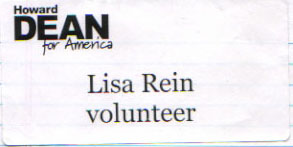
It made me feel like I was part of the official campaign. (As it turns out, I was. As "official" as the Dean campaign gets, anyway.)
After his speech, I had a chance to talk to him a bit about his blogging on Larry's blog and Creative Commons. I managed to record it on video, although the angle could have been better. You can see me kind of position myself for my handshake attack and hone in on my target. (Almost missed him!) (Small - 3 MB)
Here's his speech in complete and three-part versions:
Howard Dean At The SF Medical Society - Complete (Small - 71 MB)
Howard Dean At The SF Medical Society - Part 1 of 3 (Small - 29 MB)
Howard Dean At The SF Medical Society - Part 2 of 3 (Small - 21 MB)
Howard Dean At The SF Medical Society - Part 3 of 3 (Small - 22 MB)
Audio - Dean At the SF Medical Society - All (MP3 - 42 MB)
Hey, well take publicity any way we can get it!
This is from the August 5, 20003 program.
Smells Like Dean Spirit (Small - 12 MB)
The Daily Show (The best news on television.)
Howard Dean came to town last Thursday, and I was able to video two of his speaking events.
The first event in the afternoon was on the environment. Howard warned us that his speech might be a little stiff, and he wasn't kidding. But he did make some good points, including one about the potential of wind power. (Small - 3 MB)
One highlight took place when a cell phone rang and Dean realized it was his own. (Small - 2 MB)
I didn't get a chance to wait around to talk to Howard because I had a 1:45 appointment, but I wasn't worried about it, because I was going to see him speak again at a fundraiser at the San Francisco Medical Society that same evening (which I knew would be a smaller gathering and a better place to say hello).
I'll have the stuff from that up later today.
Here's the complete speech from noon on July 31, 2003, in one part and in three parts:
Howard Dean On The Environment - Complete (Small - 75 MB)
Howard Dean On The Environment - Part 1 of 3 (Small - 23 MB)
Howard Dean On The Environment - Part 2 of 3 (Small - 28 MB)
Howard Dean On The Environment - Part 3 of 3 (Small - 28 MB)
Here are "small" and Hi-res versions of Zack Rosen explaining the Americans For Dean website. This is taken from the blogging panel that took place on Monday, June 30, 2003 in Stanford, CA.
Zack Rosen At ILaw (Small - 12 MB)
Zack Rosen At ILaw (Hi-res - 167 MB)
Someone sent me this thinking it would do nicely in my Dean archive.
NBC News Transcripts
SHOW: Meet the Press (10:00 AM ET) - NBC
June 22, 2003 Sunday
LENGTH: 9614 words
DR. DEAN: Well, I wasn't aware that Senator Kerry said it. I knew Senator Graham had said it in Iowa. But I believe that. I think we were misled. Now, the question is did the president do that on purpose? Was he misled by his own intelligence people? Was he misled by the people around us? Or did he, in fact, know what the truth was and tell us something different. I've called for an independent investigation headed by Republicans and Democrats who are well respected in the country to find out what the president did know and when he knew it. We essentially went to war, supported by Senator Kerry, Representative Gephardt, Senator Lieberman and Senator Edwards, based on facts that turned out not to be accurate. I think that's pretty serious and I think the American people are entitled to know why that was.
NBC News Transcripts
SHOW: Meet the Press (10:00 AM ET) - NBC
June 22, 2003 Sunday
LENGTH: 9614 words
HEADLINE: Dr. Howard Dean, Democrat, former governor of Vermont, discusses his 2004 presidential candidacy and his stand on such issues as the economy, foreign policy and Iraq
BODY:
MR. RUSSERT: And tomorrow, Dr. Howard Dean, the former governor of Vermont, plans to formally announce for president. He is here first this morning on MEET THE PRESS.
Governor, welcome.
DR. DEAN: Good morning.
MR. RUSSERT: Tomorrow, you will formally announce for president of the United States in Burlington at noon. Will you be joined by your family?
DR. DEAN: I will. My son Paul, who's gotten a little scrap over the weekend, is not going to be there, but he wasn't planning on that in the first place. We have four very independent-minded people in my family. My wife is a physician. She's going to continue to practice medicine. She'll do interviews and so forth but won't campaign. My daughter's actually working in the campaign, so she's in a different place. And then my son is very guarded about his privacy and so forth. And so he's chosen not to come and I said that's fine.
MR. RUSSERT: You said that your son got in a scrap. He was arrested for driving a car in which some of his friends broke into a beer cooler and stole some beer...
DR. DEAN: Right.
MR. RUSSERT: ...and was indicted. How are you...
DR. DEAN: He hasn't been indicted, but he...
MR. RUSSERT: Cited.
DR. DEAN: He's been cited, right.
MR. RUSSERT: But how are you as a father dealing with that?
DR. DEAN: Well, I'm not very happy about it. I think that 17-year-olds sometimes do extraordinarily foolish things and this is an example of that. We had a very difficult weekend at home, and I think it was a good thing for me to go back and try to get this straighten out and he's going to have to pay the price. If you do things and make mistakes like that, you have to pay a price.
MR. RUSSERT: He's grounded?
DR. DEAN: He's more than grounded; he's going to have to go through the judicial system and they're going to figure out what to do about him and his four friends.
MR. RUSSERT: Let's turn to the campaign. This is what you said last month about the Bush tax cut and I'll show you and our viewers. "It has become clear what this president is attempting to do and why we must repeal the entire package of tax cuts." The Department of Treasury, we consulted and asked them: What effect would that have across America? And this is what they said. A married couple with two children making $40,000 a year, under the Bush plan, would pay $45 in taxes. Repealing them, under the Dean plan, if you will, would pay $1,978, a tax increase of over 4,000 percent. A married couple over 65 making $40,000 and claiming their Social Security, under Bush would pay $675 in taxes. You're suggesting close to $1,400, a 107 percent tax increase. Can you honestly go across the country and say, "I'm going to raise your taxes 4,000 percent or 107 percent," and be elected?
DR. DEAN: Well, first of all, were those figures from the Treasury Department, did you say, or CBO?
MR. RUSSERT: Treasury Department.
DR. DEAN: I don't believe them. This administration has not been candid about the impacts of this tax cut. A few months ago they had the deficit coming in at $290 billion. It's at $400 billion. The administration simply has not been forthcoming and factual about the impact of their tax cuts.
Setting aside whatever the real numbers might be, the accurate numbers, let's look at what the tax cuts have done. Property taxes are going up in places in New Hampshire because the president has cut services, because he has not given the right amount of money to the states for special education, for No Child Left Behind, for all these unfunded mandates that he's passed.
The real effect of the Bush tax cuts has actually been to raise taxes on most middle-class people and to cut their services. Their public schools are suffering. Health care is suffering for middle-class kids. And that's because of these tax cuts. These tax cuts are incredibly bad for the economy. I believe their purpose is essentially to defund the federal government so that Medicare and Social Security, the icons of the New Deal, will be undone.
Karl Rove and others have talked about going back to the McKinley era before there was any kind of social safety net in this country. Really that's what the campaign's about. It's to undo what I consider radical Republicanism.
MR. RUSSERT: But in the middle of an economic downturn, Howard Dean wants to raise taxes on the average of $1,200 per family.
DR. DEAN: So says the Republican Treasury Department which I think has very little credibility in this matter. Let's look at the record.
MR. RUSSERT: But you would raise taxes?
DR. DEAN: I would go back to the Clinton era of taxes because I think most Americans would gladly pay the same taxes they paid when Bill Clinton was president if they could only have the same economy that they had when Bill Clinton was president.
MR. RUSSERT: Ted Kennedy says that we should have a prescription drug plan. It's the first step, a compromise. Democratic leader Tom Daschle says he's right. Are you with Ted Kennedy?
DR. DEAN: Well, this is a tough one. I've actually talked to Ted Kennedy about this, and also talked to Tom Harkin, and Jay Rock--well, I haven't talked to Jay Rockefeller, but who I deeply respect, who are on different sides of this issue, and let me speak about the dilemma. First, this is an opportunity to set up an entitlement program for people who need a prescription drug benefit. We need to do that. Secondly, the bill won't work. And it won't work because it uses the private insurance companies to deliver the health-care benefits. They actually signed a bill like this in Nevada. Kenny Guinn signed a bill like this two years ago, Republican governor, and nobody got health insurance or got prescription benefits out of it because no insurance company would sign up to insure a product that's going up at five times the rate of inflation.
So the bill won't work. It's clearly an election-year sop, but what Senator Kennedy says, and he has probably the most extraordinary record on health care of any United States senator, what he says is this is the opportunity to get this in the door. We know it may not work. But let's do the best we can. And we'll try to fix it later once the entitlement is established. So I think the bill is not a particularly good bill but I--out of respect for Senator Kennedy, it's hard to really completely trash his position.
MR. RUSSERT: Would you vote for the Kennedy proposal?
DR. DEAN: I'd want to see what is in the bill, the amendment. There are more amendments. And one of the critical amendments is what's going to happen to Iowa and New Hampshire and Vermont and so forth, Medicare assessments. I was the 50th in the country, Vermont is 49th in the county--there's talk about Senator Grassley putting some money in Senator Harkin for Iowa and to fix Medicare reimbursement. That makes it more attractive. So I don't know how I'd vote on this bill right now, and I'd want to see the last amendments before it goes out the door.
Here's the other problem. This is a political trap for the Democrats. What will happen I'd flatly predict now is that it will pass the Senate, it will go to the House, the right-wing majority in the House will pass some unacceptable piece of nonsense that's clearly nothing but election year goodies, it'll go to a conference committee that the Democrats will have no say in, and then the Democrats in the Senate will be forced to vote up or down on unacceptable bill and it will be positioned by the Bush administration to say they killed drug benefits for seniors even though it won't be true. So it's a political Washington type of trap and it's a terrible, terrible dilemma for the Democratic senators to be in.
MR. RUSSERT: Are you still in favor of a constitutional amendment to balance the budget?
DR. DEAN: You know, I go back and forth on that. It's not very good public policy but I'd love to see the Republicans hem and haw about what they would do about a constitutional amendment to balance the budget. The constitutional amendments to balance--we don't have one in Vermont. We're the only state that doesn't require a balanced budget, and we actually have the best fiscal record, or one of the best, of any state. But a constitutional amendment might--has forced Republicans who are really the party of fiscal irresponsibility, borrowing and spending, and borrowing and spending, and borrowing and spending, has forced them to balance the budgets when they otherwise wouldn't. So what I--I really don't like the idea of a federal balanced budget amendment, but I am very tempted.
MR. RUSSERT: But through your entire career you have been for a constitutional amendment to balance the budget.
DR. DEAN: Yes, because I just--I have, and it's because I think that there's so little fiscal discipline in the Congress that you might just have to do it. I hate to do it because we didn't have to do it in Vermont, but, God, the guys in Washington just never get it about money.
MR. RUSSERT: Well, in 1995, when you were advocating that position, you were asked how would you balance the budget if we had a constitutional amendment...
DR. DEAN: Yeah.
MR. RUSSERT: ...calling for that, and this is what Howard Dean said. "The way to balance the budget, [Gov. Howard] Dean said, is for Congress to cut Social Security, move the retirement age to 70, cut defense, Medicare and veterans pensions, while the states cut almost everything else. 'It would be tough but we could do it,' he said."
DR. DEAN: Well, we fortunately don't have to do that now.
MR. RUSSERT: We have a $500 billion deficit.
DR. DEAN: But you don't have to cut Social Security to do that.
MR. RUSSERT: But why did you have to do it back then?
DR. DEAN: Well, because that was the middle of--I mean, I don't recall saying that, but I'm sure I did, if you have it on your show, because I know your researchers are very good.
MR. RUSSERT: Well, Miles Benson is a very good reporter for the Newhouse News.
DR. DEAN: Yes, he is. No, no, no. I'm sure I did. I'm not denying I said that. I have...
MR. RUSSERT: But you would no longer cut Social Security?
DR. DEAN: But you don't--no. I'm not ever going to cut Social Security benefits.
MR. RUSSERT: Would you raise retirement age to 70?
DR. DEAN: No. No.
MR. RUSSERT: Would you cut defense?
DR. DEAN: You don't have to do that either. Here's what you have to do. You got to get rid of the tax cuts, all of them, and then you have got to restrict spending. You've got to control--well, here's what we did in Vermont. We had some mild tax cuts in the '90s, not the huge ones that most other states did. Secondly, we put a lot of money into a rainy day fund, and I never let the Legislature spend more than the rate of growth of the economy, so the biggest increase I think we had in the almost 12 years I was governor was I think 5.2 percent or something like that. And then we paid off a quarter of our debt, which is what Bill Clinton did when he was president.
Now, we're not cutting higher education, we're not cutting K through 12, we're not cutting Medicaid for kids, and we have a balanced budget. So if you restrain spending, which is long-term spending, that's the key to balancing the budget. But you've got to get rid of the tax cuts because the hole is so very, very deep. And Social Security, I--the best way to balance Social Security budget right now, other than stop taking the money out for the tax cuts, is to expand the amount of money that Social Security payroll taxes apply to. It's limited now to something like $80,000. You let that rise. I also would entertain taking the retirement age to 68. It's at 67 now. I would entertain that.
MR. RUSSERT: But the deficit's $500 billion. Half the budget goes to Social Security, Medicare and Defense. They asked Willie Sutton why he robbed banks? He said, "That's where the money is." You could close down the entire United States government, other than Social Security, Medicare and Defense and interest on the public debt, and you still wouldn't balance the budget.
DR. DEAN: But the problem for Social Security is that it is actually in fine shape until, I don't know, 2040 or something like that.
MR. RUSSERT: No, no, no, no, no, no.
DR. DEAN: Well, it's in fine shape--it's actuarially fine until 2025 or '23 and then the trust fund doesn't run out...
MR. RUSSERT: Receipts and outlays begin...
DR. DEAN: That's right. Around--in the middle of the 2020s.
MR. RUSSERT: When the baby boomers retire, we have a real impending crisis.
DR. DEAN: That's right. But, in some ways, that's unrelated from the budget problem because what the people in Washington have been doing is taking money out of Social Security to balance the budget and then spend enormous amounts and run huge deficits. So there's two separate problems. First of all, you've got to fix Social Security and you've got to fix the budget. Fixing Social Security is an independent problem from the budget. And that's what I talked about.
You've got to look at expanding the amount of money that gets taxed for Social Security. You know, if you make $100,000 a year, the last $15,000 doesn't have to pay Social Security tax for it.
MR. RUSSERT: But, Governor, if you don't go to near Social Security or Medicare or Defense and you have a $500 billion deficit, if you're not going to raise taxes $500 billion to balance the budget, where are you going to find the money? Which programs are you going to cut? What do you cut? Education? Health care? Where?
DR. DEAN: Here's what you do. As a veteran of having to do this, because this is what I did in Vermont, Social Security, you fix actuarially. It's just like an insurance policy. Right now there's--eventually, in the middle of the 2020s you're going to see more money going out than coming in. You've got to fix that. We've talked a little bit about how to do that. Maybe you look at the retirement age going to 68. Maybe you increase the amount that gets--payroll tax--I'm not in favor of cutting benefits. I think that's a big problem.
MR. RUSSERT: But you would consider increasing the payroll tax?
DR. DEAN: Absolutely. You don't have to increase the amount of the payroll tax, you increase the salary that it's applied to. You see what I mean?
MR. RUSSERT: Yes.
DR. DEAN: $85,000, maybe you raise it to $100,000 or whatever the numbers are. We've got to look at the numbers to figure out what you do. You get the Social Security problem off the table first by fixing it and then not allowing the Congress to keep taking money out of the trust fund. The president's financing his tax cuts by taking money out of the Social Security trust fund. That's ridiculous--first. Secondly, what do you do about the budget? You restrain spending. You do not have to actually make cuts in things like Medicare or in things like Medicaid or even in Defense. What you have to do is restrain the increases in spending.
MR. RUSSERT: When the Republicans tried to limit the growth, the Democrats said that was an actual cut.
DR. DEAN: Well, they're going to say what they're going to say. All I...
MR. RUSSERT: You would be willing to limit the growth...
DR. DEAN: Absolutely.
MR. RUSSERT: ...in Defense, in Medicare and Social Security?
DR. DEAN: You have to do that. If you don't go where the money is--Social Security, we're going to fix differently. We're not talking about Social Security. We're talking about Medicare. We're talking about Defense and we're talking about all the other things the federal government does. But I want to put the tax cut back into that budget. They need it to balance the budget.
MR. RUSSERT: That's raising taxes, though. Let's be honest.
DR. DEAN: Here's what I say to people. You have a choice. Do you want to have the president's tax cut or would you like a health-care program that nobody can ever take away? Do you want to have the president's tax cut or would you like to fully fund special education, which is an obligation to the states, which is raising your property taxes? Do you want the president's tax cut or would you like to go back towards a balanced budget so we can actually create jobs and have a healthy economy again? Because a balanced budget, I believe, is the key to turning the economy around, as Bill Clinton showed.
So, if you ask that to most Americans, they're going to say, "I would much rather pay the taxes that I was paying when Bill Clinton was president if I could have health care and my property taxes would go down and we could have jobs again." Because they never got the president's tax cut. The vast majority of people in this country either got no tax cut or got a small few hundred dollars.
I had a guy in New Hampshire one time who stood up and said, "Governor, you may make some sense here." This is New Hampshire. "I got a $600 check from the president, but my 401(k) went down $60,000. I think I was better off before the president's tax cut." Most people got hurt by the president's tax cut and they're paying more property taxes because of what the president's tax cut has done to their state and local government.
MR. RUSSERT: Let me turn to an issue that you've been very identified with and that's gay rights. Here you are on the cover of Advocate magazine, put out by the National Gay and Lesbian Newsmagazine. Canada--and this was the way the papers reported it this week: "The Canadian cabinet approved a new national policy today to open marriage to gay couples, paving the way for Canada to become the third country to allow same-sex unions. ...The policy opens the way for same-sex couples from the United States and around the world to travel here to marry, since Canada has no marriage residency requirements. Canadian marriage licenses have always been accepted in the United States."
And hundreds of American gay couples are now going to Canada to be married. When they return to the United States, married in Canada legally, should that marriage be recognized?
DR. DEAN: You know what we do in this country? We focus so much on gay marriage that I think we've missed the real point of what this debate is about, which is equal rights. As you know, in our state we have a civil unions statute which says that gay couples, while they can't get married, have the same rights as everybody else, exactly the same rights--inheritance rights, insurance rights, hospital rights--that's what this is all about. So the answer is, "Will I recognize the equal rights of people who get united in Canada, whether it's married or anything else?" Yes. I think that it...
MR. RUSSERT: Yeah, but will you recognize them as a married couple, as President Dean? A couple is married in Canada, comes in the United States, legally married in Canada, are they legally married in the United States?
DR. DEAN: I can't answer that question because it's a legal question, but I can tell you what I will definitely do. I will definitely make sure they have exactly the same rights as married people, which is what we've done in Vermont. I can't tell you about the marriage question. I think the answer probably is they are legally entitled to be recognized, but I don't without--I'm not a lawyer and I don't know the answer to that.
MR. RUSSERT: Would you--do you think they should be?
DR. DEAN: Well, that's a very difficult issue. The position I've always taken is that it's the church's business to decide who they can marry and who they can't marry.
MR. RUSSERT: Well, there's civil marriage. A judge marries people in the United States.
DR. DEAN: We have civil unions in Vermont. I will recognize the legal--it's the federal government's and the states' business to recognize the fact that everybody has the same legal rights as everybody else. That's why we did civil unions. Marriage is also a way of getting those exact same legal rights, so the question is, "Is a marriage in another country recognized in this country here?" My guess is the answer is yes. I don't know the answer, but I can tell you what I stand for. I stand for equal rights for every single American.
MR. RUSSERT: Would you seek...
DR. DEAN: And so the legal parts I would definitely support, then I've got to get some opinions about, you know, what we're doing to the Catholic Church and other churches that oppose this kind of stuff. But I definitely believe that you have to recognize equal rights. So if a couple goes to Canada and gets married, when they come back, they should have exactly the same legal rights as every other American.
MR. RUSSERT: Would you, as president, seek the same kind of legislation that now has passed in Canada, allowing formally gays to marry?
DR. DEAN: No, because I don't think that is the right of the federal government. I was very much opposed, unlike some of the folks I'm running against, to the Defense of Marriage Act. I did not support the Defense of Marriage Act, because I do not think it's the federal government's business to get involved in what has traditionally been the matter for the states to deal with. But by the same token, I would not tell other states that they had to have a civil union statute or that they had to have a marriage statute. That is the not the province of the federal government. What I will go as president of the United States is insist that every state find a way to recognize the same legal rights for gay couples as they do for everybody else. Equal rights under the law is a fundamental tenet of America, and that's where we need to be.
MR. RUSSERT: Another debatable and controversial issue is the death penalty. This was the headline in your home state paper the other day: "Dean Aligns With Bush On Death Penalty. Former Governor Howard Dean appears to be shedding some of the liberal tendencies that have won him national attention as he now expands his support for the death penalty...His shift on the death penalty...has some questioning his motives."
"'This doesn't surprise me. I think Dean's willing to do what he has to do to win,'" said Frank Bryan, a political science professor at the University of Vermont and longtime observer of Dean. 'I really believe he's very ambitious and he wants to win badly. He has to get to the final plateau, and I think he will take risks with his inconsistencies being discovered in order to get to the next step.'...
"Eric Davis, a Middlebury College political science professor," also from Vermont, "summed up Dean's change in two words: South Carolina. ...'I think what's going on here is Dean is trying to appeal to electorates in more conservative states...'" South Carolina being the third primary after Iowa and New Hampshire.
DR. DEAN: It's a very interesting article, and turned out to be wrong, which was kind of embarrassing. In fact, I figured I was going to get asked this. In 1964--excuse me, in 1994, in the very paper that this was printed in, they ran a series of articles saying I was rethinking the death penalty. This has nothing to do with running for president. It happened while Bill Clinton--before Bill Clinton had even run for his second term. I began to rethink the death penalty in 1994 because of the Polly Klaas case. The Polly Klaas case was the case of a young girl who was kidnapped from her house, abducted and raped, and murdered by a felon who never should have been let out of jail. We had a very similar horrible case in Vermont a few years earlier, and I began to rethink my position on the death penalty as a result of that, and the article was just plain wrong.
MR. RUSSERT: But in terms of rethinking--let me show you what you did say in '92 and think about...
DR. DEAN: That's right. You don't have to show me. I know what I said in '92.
MR. RUSSERT: But I want to talk about it...
DR. DEAN: OK.
MR. RUSSERT: ...because I want the country to see it because it's important. "I don't support the death penalty for two reasons. One, you might have the wrong guy, and two, the state is like a parent. Parents who smoke cigarettes can't really tell their children not to smoke and be taken seriously. If a state tells you not to murder people, a state shouldn't be in the business of taking people's lives." The Catholic bishop up in Vermont has said this, and I'll show you and our viewers. "I am sorry that Governor Dean has expressed second thoughts on his support for the physicians' pledge to 'do no harm.' ...as Governor Dean himself said: 'I truly don't believe it's a deterrent.' What then would be the motive for the death penalty except vengeance?" Do you believe there's still a possibility, as you said, the wrong guy could be executed?
DR. DEAN: Yes.
MR. RUSSERT: And number two, as you said, if a state is like a parent saying don't kill, why is the state killing?
DR. DEAN: It's a deeply, deeply troubling issue. Let me explain to you why I changed my position and why I've began that process in 1994. These were two horrible murders of young children and I oppose the death penalty in most instances. Here's the areas I've changed and here's why, and I'm very supportive for exam--we don't have a death penalty in Vermont just so most of your viewers know that we're one of the states that doesn't and we don't need a death penalty.
But here's the problem, Tim, the state executes people improperly if they're improperly convicted--Illinois was the classic case. There were a number of people that were death row that turned out to be innocent. Deeply trouble. I came to realize because of the Polly Klaas case and because of similar other cases that sometimes the state inadvertently has a hand in killing innocent people because they let people out who ought never to have been let out. And so the judicial system's imperfection hurts us in two ways. It executes innocent people because they were convicted and put to death, which is a terrible thing which is why I support Pat Leahy's innocents protection bill, but they also allow people to get out of jail when they're supposed to be in there for life and then those people go and repeat their crimes, oftentimes sex offenders.
So I came to the conclusion that a person who murders a child shows a depraved indifference to life which will never be--incapable of being rehabilitated. Secondly, that a mass murderer, such as a terrorist, is someone who can't be rehabilitated and to let these people out is too dangerous and it's too high likelihood that they'll repeat their crime. And thirdly, I don't believe the death penalty is a deterrent, but I think there may be one instance where just possibly it could be and that's the shooting of a police officer. If you're about to pull a trigger on a guy who's in uniform and you know that you're going to get the death penalty and if you don't pull the trigger something different will happen, maybe that might save the police officer's life.
The only three instances that I support the death penalty are, one, murder of a child, two, a mass murder like a terrorist and, three, the shooting of a police officer, and that's how I came to the position that I came and I began that process in '94 which is...
MR. RUSSERT: What's wrong with life imprisonment without parole--it's $2 million per inmate cheaper than the death penalty when you consider and factor the cost of all of the appeals?
DR. DEAN: You know, I had said this before and I'll say it again: I don't think what's cheap and what's not cheap has a bearing on whether you use the death penalty or not. Other people have said it's cheaper to do the death penalty because you get rid of them. You don't have to give them room and board for life. Those kinds of arguments are irrelevant here.
So I just--life without parole, which we have which I actually got passed when I was lieutenant governor--the problem with life without parole is that people get out for reasons that have nothing to do with justice. We had a case where a guy who was a rapist, a serial sex offender, was convicted, then was let out on what I would think and believe was a technicality, a new trial was ordered and the victim wouldn't come back and go through the second trial. And so the guy basically got time served, and he was the man who murdered a 15-year-old girl and raped her and then left her for dead and she was dead.
So life without parole doesn't work either. If life without parole worked 100 percent of the time, there'd be no need for the death penalty because I agree with the bishop. Vengeance should never be a piece of this. As human beings, we all want to get revenge. That should never part of public policy, to get revenge, but the trouble is that life without parole is not perfect either and the victims in that case are 15- and 12-year-old girls. That is every bit as heinous as putting to death someone who didn't commit the crime.
MR. RUSSERT: We're going to take a quick break and come back. More of our conversation with Howard Dean about defense issues; Iraq. A whole lot more right after this.
(Announcements)
MR. RUSSERT: More with one of the Democrats who wants to take on George Bush in the fall, Governor Howard Dean, after this brief station break.
(Announcements)
MR. RUSSERT: And we are back, talking to Governor Howard Dean. Texas Democrat Martin Frost said the other day, "We need a candidate who is credible on national security. I think Howard Dean has the appearance of being another McGovern." Worried about your national security experience and views. The headlines: "Foes Warn Of Dean Debacle; Will Dean '04 Be A Disaster For Hill Democrats?" And they talked--they point to comments like this, Governor, and I'll show you and our viewers, from April. "We have to take a different approach [to diplomacy]. We won't always have the strongest military." Do you, as a potential commander in chief, really believe that the United States will not always have the strongest military?
DR. DEAN: What I said was, if we don't begin to use diplomacy as part of our foreign policy, we won't always have the strongest military. And that's absolutely true. And there have been many other people who know a great deal about national security, including President Clinton, who have said that's true. We have got to take on a different posture in the world where we don't simply push everybody aside who disagrees with us without trying to actually accomplish some things through diplomatic means.
MR. RUSSERT: But we will always have the strongest military under President Dean.
DR. DEAN: Oh, under President Dean, we certainly will always have the strongest military, because this is a long-term phenomenon, not a short-term phenomenon. In foreign affairs, there's a phenomenon called encirclement, where--and it's a historical phenomenon. A single, very great power with no obvious rivals in the world who exercises that power unilaterally and in contempt of other countries will result in the formation of an alliance of other second-tier powers to contain the power of that great military power. That's exactly what I was talking about in that quote, and that's absolutely true. It will happen over a period of years. Should I become president...
MR. RUSSERT: It will happen? We will have a secondary military power?
DR. DEAN: If we continue following George Bush's military policy and defense policy, will become a secondary military power. Under President Dean, that won't happen for two reasons. First of all, it's a long-term phenomenon. And secondly I will begin to set us on a path where cooperation as part of our foreign relations and our diplomatic policy. This president has essentially pushed aside people who disagree with him, using our military might, and using threats and intimidation. In the long run, that does not work.
MR. RUSSERT: Let's talk about the military budget. How many men and women would you have on active duty?
DR. DEAN: I can't answer that question. And I don't know what the answer is. I can tell you one thing, though. We need more troops in Afghanistan. We need more troops in Iraq now. I supported the president's invasion of Afghanistan for the obvious reasons, what had gone on and the murder of people. But I do not support what the president's doing there now. We need more people there. We cannot be making alliances with warlords in the hope that we're one day going to have the democracy in Afghanistan. And what I would do in Iraq now is bring in NATO and bring in the United Nations, because our troops on the ground deserve better support than they're getting.
MR. RUSSERT: But how many troops--how many men and women do we now have on active duty?
DR. DEAN: I can't tell you the answer to that either. It's...
MR. RUSSERT: But as commander in chief, you should now that.
DR. DEAN: As someone who's running in the Democratic Party primary, I know that it's somewhere in the neighborhood of one to two million people, but I don't know the exact number, and I don't think I need to know that to run in the Democratic Party primary.
MR. RUSSERT: How many troops would have in Iraq?
DR. DEAN: More than we have now. My understanding is we have in the neighborhood of 135,000 troops. I can't tell you exactly how many it takes. General Shinseki thought that we were undermanned by roughly 100,000. Maybe that's the right attitude.
Tim, you have to understand, and I know you do understand, that as you run a campaign and as you acquire the nomination and as you go on to be president, you acquire military advisers who will tell you these things. And, no, I don't have a military background. Neither did Bill Clinton. George Bush had a National Guard background. Ronald Reagan did not have a military background. I will have the kinds of people around me who can tell me these things. For me to have to know right now, participating in the Democratic Party, how many troops are actively on duty in the United States military when that is actually a number that's composed both of people on duty today and people who are National Guard people who are on duty today, it's silly. That's like asking me who the ambassador to Rwanda is.
MR. RUSSERT: Oh, no, no, no. Not at all. Not if you want to be commander in chief. But we now have 9,000 troops...
DR. DEAN: So your perception--your position is that I need to know exactly how many people are on duty today in the active military forces...
MR. RUSSERT: Well, have a sense...
DR. DEAN: ...six months away from the first primary?
MR. RUSSERT: If somebody wants to be president of the United States, have a sense of the military.
DR. DEAN: I do have a sense of the military.
MR. RUSSERT: ...of how many people roughly...
DR. DEAN: I know there are roughly between a million and two million people active duty. I know that we don't have enough people in Iraq. I know that General Shinseki said that we need 300,000 troops to go into Iraq, not 200,000 troops, and I'm prepared to assume the burden and have the proper people around me advising me on what needs to be done.
MR. RUSSERT: All right, Afghanistan, we have 9,000. You would bring it up to what level?
DR. DEAN: Well, I believe that we need a very substantial increase in troops. They don't all have to be American troops. My guess would be that we would need at least 30,000 and 40,000 additional troops. They don't all have to be American because we have got to start taking over the security functions from the warlords in order to prepare the way for a unified Afghan police force that's a national police force.
MR. RUSSERT: There is concern about your awareness and positions on national security. You must acknowledge that.
DR. DEAN: Sure there are. Because just like President Reagan, President Clinton, and President Bush, I do not have extensive experience in national security.
MR. RUSSERT: Let me turn to a Boston Globe article about the military service during the Vietnam War as it applies to you and I'll put it on the screen. "Dean did not serve in the military during the Vietnam War because he received a medical deferment for an unfused vertebra in his back. Several articles in the last year have noted that after his deferment, Dean spent 80 days skiing in Aspen, Colorado."
And then The Aspen Times wrote this profile. "In Howard Dean, we could have a president who spent the winter of 1971-72...pounding bumps on Aspen Mountain. 'I paid $250 for a ski pass and skied 80 days on Ajax. It was the greatest mountain. ... I went to work pouring concrete for a small company.'"
Why were you able to ski on Ajax Mountain, pounding your back, and pouring concrete, and not serve in the military?
DR. DEAN: First of all, let me say that there's only one person who's contending for the Democratic nominee for president who did serve in the military, nomination for president, and then let me explain the circumstances of my draft classification. I went to my physical in Ft. Hamilton in Brooklyn, which was a great deal like the scene out of Alice's Restaurant in terms of the different sizes, shapes, colors, and all kinds of people were there. I was given an examination. I had a previous back problem, which is evidently congenital, which prevented me from doing any sustained running, a problem that I've had since then, since that time, which requires that when I get out of the car I often have some pains up and down my leg and back and so forth.
But I have been able to exercise at--ry vigorous athletic life except for some things. One of those is long-distance running, which is how the problem came to my attention in the first place. I noticed the pain when I was in high school running track. In any case, the--after the physical, I received a one Y deferment. That's how the United States government decided that they would use me. One Y deferment means you can only be called in times of national emergency. I didn't have anything to do with choosing any draft deferment. I didn't try to get out of the draft. I had a physical. The United States government said this is your classification. I'm not responsible for that. I didn't have anything to do with the decision. That was their choice.
MR. RUSSERT: A military physical.
DR. DEAN: Yeah. I had a military physical. I had a draft induction physical in Ft. Hamilton. I think it was, perhaps, during my senior year. I don't remember the exact date.
MR. RUSSERT: If called, you would have served?
DR. DEAN: Of course.
MR. RUSSERT: Let me turn to Iraq, and this is what you said in April. "We've gotten rid of [Saddam Hussein], and I suppose that's a good thing."
"Suppose"?
DR. DEAN: Here's the problem. We don't know whether in the long run the Iraqi people are better off, and the most important thing is we don't know whether we're better off. This president told us that we were going to go into Iraq because they might have--they had atomic weapons. That turned out not to be so. The secretary of Defense told us that he knew where there were weapons of mass destruction around Tikrit and around Baghdad. We've been in control of Iraq for 50 days. We haven't been able to find any such thing.
MR. RUSSERT: But you also said...
DR. DEAN: So...
MR. RUSSERT: ...and I'll show it to you. You said in January, Governor, "I would be surprised if [Saddam Hussein] didn't have chemicals and biological weapons."
DR. DEAN: Oh, well, I tend to believe the president. I think most Americans tends to believe the president. It turns out that what the president was saying and what his administration's saying wasn't so. We don't know why that is. So...
MR. RUSSERT: But the Iraqi people are not better off without Saddam Hussein?
DR. DEAN: I think right now they are. Here's the problem. If we can't get our act together in Iraq, and if we can't build Iraq into a democracy, then the alternative is chaos or a fundamentalist regime. That is certainly not a safer situation for the United States of America. And we don't know for sure if it is or not. Saddam Hussein is a dreadful human being. He's a mass murderer. I think it's terrific that he's gone. But the fact is, that in the long term, we went into Iraq for reasons the president of the United States still has not made clear. And because of that, we really don't know what the outcome is going to be.
MR. RUSSERT: What did you think of Senator John Kerry's comments that President Bush misled the country.
DR. DEAN: Well, I thought it was Senator Bob Graham that said that and I agree with that. And Bob Graham is in a position to know. He's a senior senator on the Intelligence Committee and...
MR. RUSSERT: No, John Kerry said the president misled us and...
DR. DEAN: Well, I wasn't aware that Senator Kerry said it. I knew Senator Graham had said it in Iowa. But I believe that. I think we were misled. Now, the question is did the president do that on purpose? Was he misled by his own intelligence people? Was he misled by the people around us? Or did he, in fact, know what the truth was and tell us something different. I've called for an independent investigation headed by Republicans and Democrats who are well respected in the country to find out what the president did know and when he knew it. We essentially went to war, supported by Senator Kerry, Representative Gephardt, Senator Lieberman and Senator Edwards, based on facts that turned out not to be accurate. I think that's pretty serious and I think the American people are entitled to know why that was.
MR. RUSSERT: Let me show you something in April you had to say about your competitors. "I think we're going to beat the living daylights out of these other candidates because they need a backbone transplant."
Who?
DR. DEAN: Oh, you know I never would say on this show.
MR. RUSSERT: But you believe some of your Democratic contenders, opponents need a backbone transplant?
DR. DEAN: At that time what was going on was that a number of people had voted for the war and were going to Iowa saying "Well, I only"--some of them are still doing it. I...
MR. RUSSERT: Who?
DR. DEAN: I'm not going to mention them by name. There's no need to do that.
MR. RUSSERT: But, Governor, if you're a straight-talking, blunt-speaking candidate and you're saying some of your opponents need a backbone transplant, who needs a backbone transplant?
DR. DEAN: There are a number of people, Tim, who have gone out on the campaign trail, one as recently as last week, and said "I only voted for the resolution to go to war with Iraq because I knew that the resolution would force the president to send the matter to the United Nations." That is false.
MR. RUSSERT: Who said that?
DR. DEAN: I'm not going to tell you who said that.
MR. RUSSERT: Well, why--if you're going to make a...
DR. DEAN: Because I'm doing my best to try to keep some semblance of unity in this party. We are all going to need each other by the end of the day. I'm the non-Washington candidate. I'm going to run very hard against all the candidates who are inside the Beltway from Washington because I think they're going to have a hard time convincing the American people that somebody from Washington ought to beat this president. But to s...
MR. RUSSERT: Well, you--do your best. Let me show you...
DR. DEAN: I know. I haven't always done my best.
MR. RUSSERT: Well, let me show you exactly--here's the headline from today's Washington Post and I'll show everybody: "Misfires From The Hip Creates Problems Dean Discovers. ...[Dean ] is finding that his outspokenness can get him in trouble. Last week, Dean issued what was his third apology to a rival presidential candidate. After telling the Associated Press that he did not consider Sen. Bob Graham (D-Fla.) a 'top tier candidate,' Dean recanted, telling the news served that he regretted the remark. Earlier this year, he apologized to Rep. Richard A. Gephardt (D-Mo.) for tagging his broad health care initiative a 'pie in the sky' plan. Beefier that, Dean apologized to Sen. John Edwards (D-N.C.) after accusing him, during a Democratic gathering in California, of muddling his position on the war in Iraq."
This is what an aide to John Kerry had to say about all of this. "What we haven't figured out yet is whether these harsh, personal attacks are part of a long shot's strategy to get noticed, or whether this unpleasantness is just intrinsic to his personality. Or both." A very serious question. Do you have the temperament to be president?
DR. DEAN: Not only do I have the temperament to be president but I have the honesty to be president. When I make a mistake, I'm very pleased to apologize for it. The fact is that a lot of this stuff is about what goes on spinning, and I'm surprised the reporters take the bait all the time. I've issued one apology, and it was an apology I ought to have issued. I mischaracterized John Edwards' position in March at the California convention because I didn't know what he had said.
MR. RUSSERT: Well, you apologized to Bob Graham.
DR. DEAN: No, I didn't.
MR. RUSSERT: You called the AP and recanted the statement.
DR. DEAN: I called the AP and said, "I'm sorry I said that."
MR. RUSSERT: Well, that's an apology.
DR. DEAN: No, it's not.
MR. RUSSERT: "I'm sorry I said it" is not an apology?
DR. DEAN: I didn't actually say I'm sorry. I said, "I shouldn't have said it because it's not my business to handicap the races." Look, Tim, if I make a mistake, I'm happy to say so, and I'm happy to say why I made a mistake. But to say that I don't have the temperament to be president, I actually think maybe I have a better temperament to be president because wouldn't it be nice to have a president who's actually admitted he was wrong when he made a mistake. If I insult somebody by mistake and it's my fault, I'm very happy to say so. I'm not afraid of that. I will not be the scripted candidate who is going to do all the things that their handlers tell them to do. I suppose my own handlers have a nightmare over that fact.
MR. RUSSERT: But is there...
DR. DEAN: But the fact is: Wouldn't it be nice to have a president who wasn't on the one hand or on the other hand who said, "Well, I voted for the war, but I only did it to send the thing to the U.N.," when, in fact, the resolution didn't require the president to go to the U.N.? I'm tired of hearing politicians that make--that do those things deliberately. I'm going to say what I think. Sometimes I'm going to be wrong, and when I'm wrong, I'm going to say so.
MR. RUSSERT: Is there a risk, though, that you'll be seen as described in Time magazine today as a bomb thrower and not have the statesmanlike qualities necessary to be a president?
DR. DEAN: I think that's up to the American people to decide. What they're going to decide is that I'm going to say what I think. I have a long record in Vermont of running the budget better than any of these other folks could because they haven't run a budget with the exception of Bob Graham. I have a long record in Vermont of delivering program that they all talk about at election time that we've all actually done like health insurance stuff for all kids in our state. And I think the American people get to decide. That's what the primary's about: Do you want somebody who inside the Beltway people consider a statesman because they hedge on every issue and they are scripted and they never say anything that the focus groups don't approve of or do you want somebody who's going to lay it on the line?
This whole campaign really has been about it's time for Democrats to be proud of being Democrats again. Stop voting with the president and then try to justify your actions, stop supporting stuff that makes no sense and stand up for what you believe in. That's the basis of this campaign, and I think that's the basis of a reformation of this country. We need to take this country back. This country's in a lot of trouble. It's in trouble because we have a radical right administration that are dismantling the New Deal and it is not telling the truth about a lot of things that they say.
The Clear Skies Initiative which basically allows you to put more pollution into the air, No Child Left Behind, a slogan cribbed from a liberal activist group and then the tax cuts are funded and health care's cut for kids. That's what this campaign is about. It's not about arguing with some inside the Beltway person about whether I did or did not apologize to Bob Graham or not. Bob Graham is a terrific guy. If I wronged him, I'm happy to apologize to him. The real issue is what is this country going to stand for and what is this party going to stand for.
MR. RUSSERT: In terms of who you are, I want to refer you to your comments at the National Abortion Rights Action League in January. And I'll read it to you and our viewers. "One time a young lady came to office who was 12 years old, and she thought she might be pregnant. And we did the test and we did the exam and she was pregnant. ...And after I had talked to her for awhile, I came to the conclusion that the likely father of her child was her own father. You explain that to the American people who think that parental notification is a good idea. I will veto parental notification." And then this in USA Today. "Dean told a powerful story but left out a key fact. ...What Dean didn't say was that he knew the father was not responsible, someone else was convicted." That's a pretty big omission.
DR. DEAN: What do you mean?
MR. RUSSERT: To say to people at NARAL, "Leave us a suggestion"...
DR. DEAN: I don't think it's--omission. A pretty big omission, you mean? Yeah.
MR. RUSSERT: Yeah. That's a pretty--to say that...
DR. DEAN: I don't think it is at all.
MR. RUSSERT: To suggest her father may have been...
DR. DEAN: I thought it was. At the time, I thought it was.
MR. RUSSERT: But when you told that story, you knew otherwise.
DR. DEAN: That's right.
MR. RUSSERT: Why didn't you say that?
DR. DEAN: Because it didn't make any difference. Because the fact that I thought that at the time, that that girl had been made pregnant with her father, under a parental notification law, I would have then been required to report that to her family.
MR. RUSSERT: But parental notification for a 12-year-old--this woman wants an abortion. According to Vermont law and all the laws I've checked across the country, a minor needs parental consent to get a driver's license, a tattoo, see an R-rated movie. When we talked about the death penalty, you talked about the 12- and 15-year-old young girls.
DR. DEAN: Right.
MR. RUSSERT: And you said we need a death penalty as a way of dealing with those kinds of situations. Why not tell a parent, notify a parent that their 12-year-old girl is going to have an abortion, or if it's an abusive situation, go to a judge. Why not?
DR. DEAN: Here's what you do, and here's what we do. You know, I, as an internist, saw a number of--I took care of all kinds of ranges of people. I saw a number of girls like this, none of whom I suspected what I suspected about this girl. I always tried to get the parents involved. Usually I knew the parents, and I would--the way I would do it is I would bring them in my office and I would say, "Look, the smartest thing to do is call your parents." "My parents are going to kill me." I said, "They're not going to kill you. I know them. They're going to be very upset. We need to get them involved." I would never pick up the phone against their will and call them. Sometimes they'd say, "I can't deal with it. You call them." Once in a while, when a child says "My parents are going to kill me," they're not kidding.
MR. RUSSERT: But you go to a judge in that situation.
DR. DEAN: But judicial bypass has been shown not to work. There's been a lot of studies about it in Massachusetts. It just doesn't work. You have to rely--look, nobody's going to take a 12-year-old child and give her an abortion without being--I hope without being sensible, thoughtful and trying to get an adult involved. But to have rigid parental notification laws make it more difficult to practice medicine. This young girl that I talked about turned out--of course, we reported the whole situation--turned out the person who had sexually abused her was convicted. Fine. That's the right thing to have happened. But suppose we'd had a parental notification law, and suppose under the law I was then obliged to call up her parents and say, "I have this young girl here who, you know, is pregnant" and so forth and so on. What would have been the fate of that girl when she went home?
MR. RUSSERT: If you, in fact, thought it was an abusive situation, you can go to a judge. That's the point of notification laws.
DR. DEAN: Yeah, but you know what?
MR. RUSSERT: And if you have one for tattoos and driver's license and movies, why not for something as serious as abortion?
DR. DEAN: Every doctor knows that you should get a responsible adult involved, and I hope that every doctor fulfills that mission. I'll give you an example. There have been judges that say, "Under no circumstances will I provide certification that this girl should have an abortion, because I'm against abortion." Now, there are bad judges in the system, and some of them rule on these cases. Why can't this be a matter between the doctor, the family and the patient? Why can't it be like that? Why do we have to have politicians always wanting to practice medicine? Whether a woman can have an abortion, what has to happen...
MR. RUSSERT: But some 12-year-olds don't want to tell their mom and dad, and you are supporting that.
DR. DEAN: No, I'm not. What I'm saying is if the 12-year-old doesn't want to tell their mom and dad because they're afraid of their mom and dad is going to hurt them, then you have an obligation to make sure that you talk with that 12-year-old and work--first of all, 12-year-olds don't get pregnant, usually speaking, unless there's a real problem. But if the 12-year-old has a legitimate reason, then there has to be a different way to do this.
MR. RUSSERT: Talking about politics and saying what you believe in, you said in July of last year that Al Gore should have taken the gun issue off the table. It cost him three states and he lost the presidency. Why would you be afraid to take--stand up for any issue? Why take issues off the table if you really want to...
DR. DEAN: Because I don't think it should be on the table.
MR. RUSSERT: Why not?
DR. DEAN: We have no gun control in Vermont.
MR. RUSSERT: Well, you're for the Brady Bill...
DR. DEAN: Yep.
MR. RUSSERT: ...which means there's a waiting period before you buy a gun. You're against...
DR. DEAN: Well, I'm for--it's backgrounds.
MR. RUSSERT: Well, OK.
DR. DEAN: The Brady Bill's InstaCheck. It's not a waiting period.
MR. RUSSERT: But you...
DR. DEAN: Well, there's a small waiting period, that's true.
MR. RUSSERT: Well--and loopholes at gun shows, there is a waiting period if you have it on a weekend.
DR. DEAN: Background check, right.
MR. RUSSERT: And you're for a ban on assault weapons, so you are for gun control.
DR. DEAN: Look, what I've said is we should keep the federal laws and support them, and we should apply background checks, InstaCheck, to gun shows, right?
MR. RUSSERT: But why take the issue off the table? Debate it.
DR. DEAN: Because--well, you can debate it all you want.
MR. RUSSERT: Because it may hurt Democrats politically?
DR. DEAN: No. Different states are different. My state, we have no gun control. We also have one of the lowest homicide rates in the country. We're a rural state with a lot of hunters in it. Right? In New York and New Jersey and California, they ought to have as much gun control as they want. My position is this is a state issue. Keep the federal laws. Enforce them vigorously. And then let every state decide what they want. Because when you say gun control in my state, people are going to think you're taking the squirrel rifle their parents gave them away. When you say gun control in New Jersey and California and New York, they say "Great. Let's get the machine guns and the handguns off the streets." They're both right. So why can't each state decide for themselves over and above the federal law what they want or don't want? What the result will be, you won't get more gun control than what you've already got in Wyoming or Montana and Vermont, and you'll get a lot more in California and New Jersey. Fine.
MR. RUSSERT: We got 15 seconds. How's this race going to play out?
DR. DEAN: Who knows? That's up to the voters. I'm going to work. My message is be strong for the Democratic Party. The only way to beat this president is to be proud of who you are and stand up for what you are and who you are, and that's how we can beat George Bush. And I don't think the other guys from Washington are going to be able to do that.
MR. RUSSERT: Governor Howard Dean, we thank you for joining us this morning, sharing your views. And be safe on the campaign trail.
DR. DEAN: Thank you.
Actor/writer/activist Peter Coyote MC'd the Howard Dean kick off event that took place on June 23, 2003 at the San Francisco Hyatt.
If there are three parts to taking our country back:
1) exposing shrub corruption
2) getting a good candidate to run against him
3) fixing our screwed up election procedures
I'd say we've got 1 and 2 pretty well under control.
Time to get started on number 3 in a big way!
After Penelope Houston performed, Peter came back to say a few words to the audience about the dangers of using proprietary software within voting machines.
I spoke to him briefly afterwards to let him know that the word he was searching for is "Open Source."
I realized after last year's election that in order for our Electronic Voting Machine software to be trustworthy, it has to be open sourced -- or at least made available for scrutiny. Otherwise, by definition, it can't really be a part of the democratic process.
Making the source and technology available for public scrutiny is the only way to ensure that the proper technological checks and balances can be built into the system (and be double checked afterwards).
I'm about to post an article (and several of the resources referenced by the article) that explains in detail just how badly onen of the current software systems doesn't measure up to even the most basic of security and accountability requirements. Although the only reason we know this is because the software was made available online. (Which is a good thing!)
Peter Coyote On The Dangers Of Proprietary Voting Machines (Small - 3 MB)
Transcript: One last thing on the Georgia Voting Fraud. It can't be proven because the software is proprietary. There's a dress rehearsal. There's a website called Votescam.com, and you need to look at it. And everyone of us needs to write our legislators and say: "We want paper ballots." "We want transparent software." "We want the government supervising the elections."Otherwise, what will happen is, at the end of the day, the Police will take the voting machines, they will give them to the corporation, and the corporation will tell you who won.
There's a long history of documented voter fraud in this country, and the dress rehearsal was the last presidential election. I narrated a film for a reporter called Greg Palast. 91,000 votes stolen in Florida. 91,000! Go to Greg Palast.com and look it up. Go to Votescam.com. If we don't stop voter fraud, we're not gonna win this election. Thank you all very much for coming.
You all must know how completely thrilled I am about this newest development in the Presidential campaign.
I'll let Larry tell you about it himself.
A new guest blogger: Howard DeanYesterday, I completed a draft of a new book. Tomorrow, Bettina and I leave for our first vacation in a very long time (and, as we expect, the last vacation the two of us will take alone in a very long time).
So it is time for me to take a break from this space too. But I’ve arranged for a much more interesting guest blogger while I’m gone: former governor, and presidential candidate, Howard Dean.
This is, I believe, the first time a presidential candidate has been a guest blogger. But it is an obvious extension of blogs and the process of becoming President. Campaigns are all about meeting different groups and talking about ideas. Where better than a blog?
I have great respect for Governor Dean, and especially the clarity of his voice. I have even greater respect now that I see the doctor makes house calls. So Governor, welcome to this tiny server at Stanford: You’ll find perfect acoustics provided by MovableType, and an interesting mix of views provided by the readers.
And to everyone else, enjoy the week of something totally different. Dean is on starting Monday. I should be back the week following.
One ground rule: I’ve had a policy of not editing comments of others, regardless of abusiveness. That is not my policy for my guests. You may disagree with the views you read here. But if you are reading them here, then you at least should respect the fact that they are being expressed here. It is important to me that blog-space everywhere become a place where more of this kind of conversation can occur. So trolls, please save your abuse for my return.
You'll see more from
Americans For Dean's Zack Rosen, one of the subjects of this article, in the next ILAW session I post about Blogging and Democracy.
Netizens Rally for Dean Team
By Katie Dean for Wired News.
"It's an autonomous, self-organizing, grass-roots campaign network," said Zack Rosen, the University of Illinois at Urbana-Champaign computer science student who cooked up the idea. "We're giving people a Web tool to organize the campaign network. We want to help get this man elected."Instead of taking directions from the top down, small groups of Dean supporters can organize their own "campaign node." Each local node, like Milwaukee for Dean or Quilters for Dean, for example, will be able to host forums and post its own news, blogs and calendar using open-source tools assembled by the developers.
Those nodes then will plug into larger nodes, like statewide Dean groups, higher in the network's hierarchy. The larger nodes will keep track of the local nodes and house a repository of Rich Summary Site feeds, enabling the groups to share relevant articles and news.
A collection of campaign-related pictures, videos and audio also will be hosted on the local nodes. All of the media will be licensed under the Creative Commons, and people are encouraged to sample and modify the media, like setting photos to music or creating snazzy new fliers to distribute.
"All the content that will be put up on these nodes will be contributed by users," Rosen said.
Here is the full text of the article in case the link goes bad:
http://www.wired.com/news/politics/0,1283,59497,00.html
A new site has popped up on the Net to help elect Howard Dean president, using a network of independent "nodes" of supporters to collaborate, share news and even design multimedia campaign materials.
A group of software developers has formed Americans for Dean, a site designed to help organize those who support the former Vermont governor's bid for president.
"It's an autonomous, self-organizing, grass-roots campaign network," said Zack Rosen, the University of Illinois at Urbana-Champaign computer science student who cooked up the idea. "We're giving people a Web tool to organize the campaign network. We want to help get this man elected."
Instead of taking directions from the top down, small groups of Dean supporters can organize their own "campaign node." Each local node, like Milwaukee for Dean or Quilters for Dean, for example, will be able to host forums and post its own news, blogs and calendar using open-source tools assembled by the developers.
Those nodes then will plug into larger nodes, like statewide Dean groups, higher in the network's hierarchy. The larger nodes will keep track of the local nodes and house a repository of Rich Summary Site feeds, enabling the groups to share relevant articles and news.
A collection of campaign-related pictures, videos and audio also will be hosted on the local nodes. All of the media will be licensed under the Creative Commons, and people are encouraged to sample and modify the media, like setting photos to music or creating snazzy new fliers to distribute.
"All the content that will be put up on these nodes will be contributed by users," Rosen said.
Zephyr Teachout, who leads Internet organizing and outreach for the Dean campaign, credits this kind of grass-roots organizing for the candidate's success so far and said the new project will only help spread the message.
"It gives people who would normally be lonely in the political process a way of finding each other -- and a way of being political that suits their interests and their skills," she said.
Rosen said about 15 developers are working to get the tools up and running in the next few weeks, but anyone is welcome to contribute. They're building on Drupal, an open-source content-management system, for the project.
"We're going to leave the system open for anyone to innovate on this network," Rosen said. "Different groups might want different functionalities."
Americans for Dean will set up the hosting service and provide technology support for any of the nodes that need it. One need not be a software engineer to participate, either. Rosen said administering one of the nodes will be as easy as running a community site like a Yahoo Group.
It's a step beyond Meetup, which coordinates local gatherings for people with similar interests. More than 55,000 people have joined the Dean Meetup group.
Rosen has attended two of the Dean Meetup meetings -- including one at Stanford University this week -- and said the groups were fairly disorganized. He hopes the open-source project will help supporters coordinate more easily.
Jerome Armstrong, an Internet activist and political consultant, also says the project could help alleviate the bottleneck of Dean supporters calling the campaign headquarters. It could give those people a new venue for getting involved with the campaign, he said.
"That's the way grass roots works best, when it grows on its own," he said.
Americans for Dean is not run by the Dean campaign. It's designed to be self-governed and self-organized, and both the campaign and the developers like it that way.
"There's so much hunger in this country for people to effect (change) in their local communities," Teachout said. "We are not about censoring you. You don't have to ask permission to be a political actor."
With no direct control over these groups, are Dean campaign organizers worried about people promoting something other than the Dean message?
"There's a tension that's always going to be there, but so far we haven't had any real problems with that," Teachout said. "Everything (Dean) is saying is 'you guys have the power.'"
Support for Dean continues to snowball on the Net. He collected 44 percent of the vote in the recent online primary at MoveOn.org. More than 300,000 people voted on the site.
The candidate raised nearly $3 million online last week alone.
Joe Trippi, Dean's campaign manager, predicted that the Internet will be as influential in this year's campaign as television was in 1960. The Nixon-Kennedy debate revolutionized how television was used in political campaigns.
"The new medium is radically changing the way American politics is happening," Trippi said. "I think it's totally turned the history of American politics on its head."
"This is a really interesting experiment in civic participation," Rosen said. "This is extremely exciting and it's viral, and I think it's our only hope in winning this election."
Katie Dean is not related to Howard Dean.
This footage is from the "Democratic National Candidates Forum" organized by the Rainbow/PUSH Coalition that took place on June 22, 2003 at the Sheraton Chicago Hotel and Towers in Chicago, IL.
This is by far my favorite quote from the Forum. The question is (paraphrased) "How can we afford healthcare?"
In a nutshell, the repeal of the Shrub's latest tax cut for the rich would cover the cost two times over. (See the longer edits below if you want to hear more -- this clip is the sound byte version. Howard Dean On Health Care - Soundbyte (Small - 2 MB)
Howard Dean On Health Care - Edited (Small - 3 MB)
(Includes a bit more of what was said immediately before the quote above, for context.)
Howard Dean On Health Care - Complete (Small - 5 MB)
Yippie Kai-yay! Consenting adults are allowed to have sex however they want in the privacy of their own homes!
It almost seems like we're living in a democracy in the 21st Century!
And Howard Dean steps up to the plate to make a statement on the subject:
Statement on Supreme Court's Decision on Lawrence vs. Texas
WASHINGTON, DC – “I applaud the Supreme Court ruling in the case of Lawrence v. Texas overturning the Texas anti-sodomy law. This decision marks a significant advance toward achieving equal rights for all Americans. For too long, laws like this have divided us by race, by gender and by sexual orientation. As a Governor who worked hard to protect the rights of gay and lesbian couples, I am extremely pleased with the Supreme Court's ruling."Every American, regardless of sexual orientation, should be afforded the right to privacy. The Texas anti-sodomy law was nothing less than government-sanctioned intolerance and discrimination. The fact that President Bush defended the law while he was Governor shows that he is not the uniter he claims to be.”
Uh oh. Looks like I'm going to have to start keeping a better eye on the Letterman Show.
Tuesday, June 24, Letterman did a "Top Ten Signs You're In Love With Democratic Presidential Candidate Howard Dean."
If anyone got a recording of this, please email me with your demands for a copy!
Top Ten Signs You're In Love With Democratic Presidential Candidate Howard Dean
10. You've actually heard of him.
9. Whenever he discusses plans to revitalize economy, you get goosebumps.
8. Named your cats "Howard," "Dean" and "Six-Term Governor Howard Dean."
7. You'll only watch movies featuring Ron Howard or Harry Dean Stanton.
6. When you hear a report on the radio about a highway accident, you murmur, "Please, god, don't let Howard Dean be involved."
5. Constantly complain rival candidate Dennis Kucinich isn't "Howardly" enough.
4. Changed outfit four times before watching Dean's appearance on "Meet the Press."
3. You stand by him despite the fact his infidelities embarrassed you in front of the entire...oh wait, wrong Democrat.
2. When he announced his candidacy, you didn't laugh your ass off.
1. You're actually considering wasting a vote on him.
This footage is from the "Democratic National Candidates Forum" organized by the Rainbow/PUSH Coalition that took place on June 22, 2003 at the Sheraton Chicago Hotel and Towers in Chicago, IL.
Here's the original question that was presented to the candidates (courtesy of Jesse Jackson).
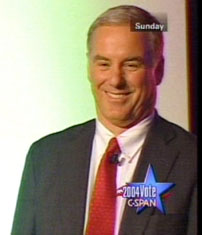 | Howard Dean On The FCC's New Media Ownership Rules "...when the Dixie Chicks were kicked off the air for disagreeing with the President of the United States over the Iraq invasion, I suddenly realized that this was a corporation who was censoring our ability to get information on our airwaves." -- Howard Dean. |
Complete transcript of the above video clip:
Q: Governor Dean. The FCC made this decision. The market's gonna react. Companies are going to be acquiring more outlets. What are you gonna try to do? Try to undo it?
Dean: Yup.
(applause)
Dean: Look, I'm not a big country music person. I like it alright. I don't know much about the Dixie Chicks. But when the Dixie Chicks were kicked off the air for disagreeing with the President of the United States over the Iraq invasion, I suddenly realized that this was a corporation who was censoring our ability to get information on our airwaves. So, yeah. Deregulation has been a failure. We need to re-regulate the media. They've behaved irresponsibly, and when people behave irresponsibly, they need to have the privileges that we're giving them using our airwaves taken away.
So yes. I would re-regulate the media. I would limit the ownership of stations in a particular market and limit the overall ownerships in the entire country. We made a mistake in deregulation. We need to re-regulate.
Uncropped photograph (linked to larger image):
Penelope Houston performed two songs at the San Francisco node of Howard Dean's nationwide launch last Monday night, June 23, 2003.
I've created a couple different edits of these movies:
- Movies that have both songs, with an introduction to the second song in the middle.
- Movies consisting of each song as a separate clip.
- A "radio edit" of "Scum" in case you wish to add it to your MP3 collection without having to listen to the talking at the beginning everytime (although Penelope teaching the audience the words to the song is pretty fun to listen to).
(That's me singing backup along with the guitar player at the end of "Scum." I think it came out pretty good actually, considering :-)
Penelope has asked me to retain our traditional copyright on this footage until she has a chance to look over the Creative Commons Licenses in more detail. (Sounds fair to me!)
Thanks again for an incredible show, Penelope!
Penelope Houston At Howard Dean Rally - "American In Me" and "Scum" (With intro to "Scum" in between)
Penelope Houston - Both Songs (Small - 17 MB)
Penelope Houston - Both Songs (Hi-res - 234 MB)
Audio - Penelope Houston - Both Songs (MP3 - 8 MB)
Penelope Houston At Howard Dean Rally - "American In Me"
Penelope Houston - American In Me (Small - 7 MB)
Penelope Houston - American In Me (Hi-res - 92 MB)
Audio - Penelope Houston - American In Me (MP3 - 3 MB)
Penelope Houston At Howard Dean Rally - "Scum" (w/intro)
Penelope Houston - Scum w/intro (Small - 10 MB)
Penelope Houston - Scum w/intro (Hi-res - 137 MB)
Audio - Penelope Houston - Scum w/intro (MP3 - 5 MB)
Penelope Houston At Howard Dean Rally - "Scum" (Radio Edit - no intro)
Penelope Houston - Scum (Radio Edit) (Small - 8 MB)
Penelope Houston - Scum (Radio Edit) (Hi-res - 111 MB)
Audio - Penelope Houston - Scum (Radio Edit) (MP3 - 4 MB)
Matthew Taylor and friends would like to give you a chance to get to know Gov. Dean a little better, so they're throwing a party where he'll call in live and answer your questions. (Details below.)
Here's Matthew explaining his support for Dean and the details about his party.
Matthew Taylor Invites You To Howard Dean House Party
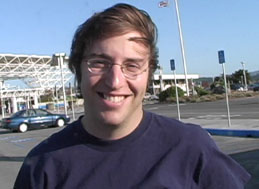
When: SATURDAY, JUNE 28TH -- 6:00 P.M.
Where: 2933 BENVENUE AVENUE (near Ashby), Berkeley (tasty appetizers and beverages provided)
**LIVE CONFERENCE CALL WITH HOWARD DEAN!!!!**
At exactly 7:00 p.m., Howard Dean will speak to House Party guests via speaker-phone. Bring Questions to Ask, and Don't Be Late!!
R.S.V.P. to Matthew Taylor (info removed due to spam problems. drop lisa a line if you need to connect with matthew for some reason)
Dear everyone,
You've probably been hearing a lot about Howard Dean, Vermont's former Governor who is running for President - if not from the media, than from my persistent emails. Well, now's your chance to actually talk to the Governor *live* on a conference call at a house party and find out if you want to support him! Details below - please email to RSVP your space. It's on Saturday, June 28th, 6pm in Berkeley (the call's at 7pm). -Matthew
================================================
Berkeley Rent Board Commissioner Paul Hogarth Berkeley Transportation Commissioner Sarah Syed and former Empire 21 Publishing CEO Matthew Taylor cordially invite you to a
HOUSE PARTY FOR *** HOWARD DEAN FOR AMERICA ***
Come learn about Howard Dean's campaign for President, and his record as Governor of Vermont -- a balanced budget, universal health care, civil unions for gay and lesbian couples, and strong opposition to the President's unilateral war in Iraq. Learn why we are supporting Howard Dean, and how he is the most progressive electable Democrat running to defeat George W. Bush!!!
SATURDAY, JUNE 28TH -- 6:00 P.M. 2933 BENVENUE AVENUE (near Ashby), Berkeley (tasty appetizers and beverages provided)
*******LIVE CONFERENCE CALL WITH HOWARD DEAN!!!!*******
At exactly 7:00 p.m., Howard Dean will speak to House Party guests via speaker-phone. Bring Questions to Ask, and Don't Be Late!!
Please bring your checkbook or credit card, and if you are impressed with Governor Dean's plan to take back America, he needs your support!
********************************************
R.S.V.P. to Matthew Taylor, ---- or ---- or Paul Hogarth, ---- or Sarah Syed, ---- or sign up online at: http://action.deanforamerica.com/meet/selectmtg.html?zip=94705&distance=1 Want to know more about Howard Dean? Visit the official campaign website at http://www.deanforamerica.com
------------------------------------------------------------------------ DISCLAIMER: The titles of the party's co-hosts are strictly for identification purposes only. ------------------------------------------------------------------------
PS - If you decide you can't make it to the party but wish to contribute, please visit: http://www.deanforamerica.com/contribute and email me a confirmation of the contribution amount so we can count it toward our overall goal for the party. Thanks!
Here's a link to the video from this trip.
Photographs from San Francisco Ferry Ride With Howard Dean
Date: June 19, 2003
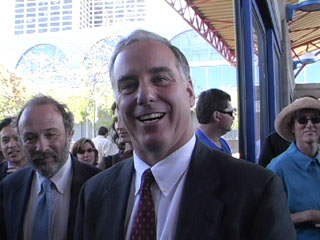
Each of these smaller photos (7) is linked to its larger high resolution JPEG image.
Howard Dean Says Hello (Below)
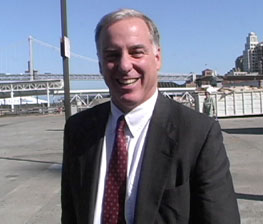
Howard thanks his "Meetup.com" supporters. (Below)

Howard on the ferryboat talking to a commuter. (Below)
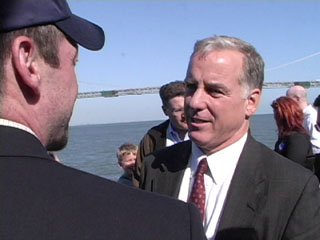
A happy Dean supporter. (Below)
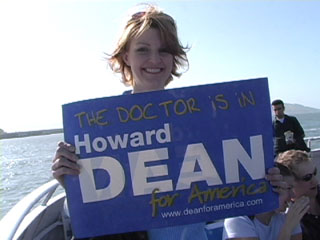
Nice shot of the flag and the Bay Bridge from the Ferryboat. (Below)
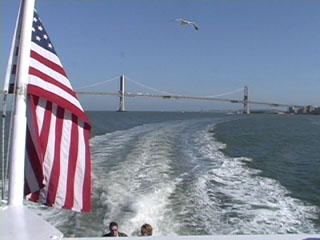
Dean and friend on the front deck of the ferryboat. (Below)
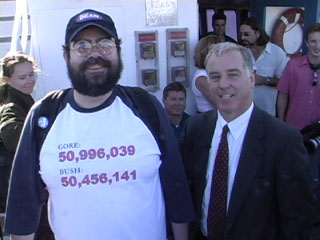
Dean giving his speech to a 200+ person crowd at the Larkspur Ferry Terminal. (Below)
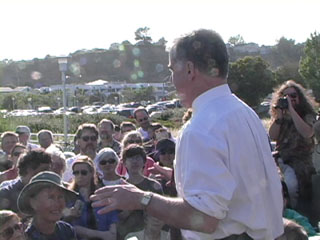

This work is dedicated to the
Public Domain. (Take it and run, baby!)
Howard Dean For President in 2004

Here are the photographs from this trip.
I met and spoke with Howard Dean in person last Thursday night on a Ferry ride from San Francisco to Larkspur. (On the way to a pep rally in Larkspur.)
I didn't have a windsock for my microphone, so a lot of the footage on the Ferry is almost inaudible, but I was able to get some great footage with him before and after the ferry ride itself. I've included some clips of the Ferry ride so you can get a feel for what it was like hanging out and talking to him. (I'll have to transcribe later it so you guys can hear what was said on the Ferry.)
As I mentioned before, I'm not going to spend time trying to convincing anyone to vote for Dean.
(Although it would be great if you participated in the MoveOn Primary going on tomorrow through Wednesday, whoever you decide to vote for.)
I'm just letting you guys know who I'm endorsing and why, so you can take that into consideration when deciding for yourself.
Over the coming weeks and months, I'll be providing more details about Dean and his current stance (and past accomplishments that back up that stance) in Health Care, Education, Civil Rights and other domestic issues that I feel are the crux of this election.
Complete and Edited Movies Of Ferry Ride and Speech With Howard Dean
Read the individual description of each. I've created a couple different edits so you can see and hear as little or as much as you want.

First Half Of The Trip
Here's me talking to Howard Dean before he gets on the Ferry to Larkspur. He mentions the 34,000 meetup.com supporters and Howard Dean TV. He says hello to people in the downstairs cabin and heads out to the front deck of the boat, where he remained for a good part of the ride.
Lisa Rein Talks To Howard Dean (Small - 8 MB)
Second Half Of The Trip
Long Version: The crowd gets off the ferry, my running through the crowd to find a spot to film the speech, and the entire speech itself (give or take a second).
Long Version - Howard Dean In Larkspur (Small - 51 MB)
Short Version - everything included in the "Long Version," but a little less of it.
Shorter Version - Howard Dean In Larkspur (Small - 21 MB)
Highlight Reel: Short Version Of Speech Only
A highlight reel of Howard Dean's Speech
Howard Dean In Larkspur - Highlights (Small - 15 MB)


This work is dedicated to the
Public Domain. (Take it and run, baby!)
Here's a cool interview with Penelope that explains more about who they are and what happened to them.
Note: Penelope Houston, formerly of The Avengers will be performing at 8:00pm. (Yes, the punk rock group that opened for the Sex Pistols in San Francisco in 1978, although she's got a mellower sound now, she has promised to "rock" :)
Here is the full text of the interview in case the link goes bad:
http://www.richieunterberger.com/houston.html
PENELOPE HOUSTON
Penelope Houston is still known to many punk fans only for her stint in the Avengers, one of the first California punk bands, in the late 1970s. Actually, by now her career as a solo folk-rock-influenced singer-songwriter has lasted far longer than the Avengers did. With a voice now more given to soft, wistful sweetness than harsh wailing, she would by the 1990s enjoy a large following in Germany, getting dubbed "the Queen of Neo-Folk." She talked about all phases of her career in her Oakland home on Halloween 1996.
What Avengers releases have there been, besides the album compilations?
There's a three-song EP seven-inch, four-song EP 12-inch. There are a huge number of bootlegs, most of them being singles. And one really horrendous CD that I heard, that I swear it sounded like somebody taped the show with a regular transistor radio, and then they played it on the air somewhere, and somebody else taped it with a little hand-held thing. Off of a radio, and it wasn't tuned in right, I swear. You can hear it sort of tuning in and tuning out, and the first half of it kind of sounds fast. So you're listening to 25 minutes of Avengers songs played really fast from a live show, through a radio show, recorded by somebody, put on a CD. Then they have some other stuff that was recorded that sounds slow from a live show, and it's really godawful. And somehow they got their hands on some actual recorded stuff that was done at rehearsals or at some studio or something. This thing has come out in Europe, and says it's limited to 500. But if it's a bootleg, who's to believe anything like that at all? Most of them are live, and they're just godawful.
One of them was really funny. Somebody wrote down the lyrics as they heard them, and I saw them. It's in one of the seven-inch bootlegs. All wrong! Really funny. It was kind of a gruesome lyric that didn't actually exist, having two heads or something like that.
Why didn't the band put out more while they existed?
We were actually together for two years, but there was no independent music industry. There were hardly any labels. Our first record came out on Dangerhouse, and the second on White Noise. Now it's hard to imagine there not being somebody who lives right down the street who's got a record company. Or me, I've got a record company, I put out my own tapes. But back then, there just wasn't. There were more tiny English labels that were putting stuff out. But there wasn't that whole sense of, we'll just go in and record something ourselves and do it. It was kind of like waiting for somebody to recognize that we're this hot little punk band, and that somebody should pay to have us record it.
The first three songs that came out were paid for by Dangerhouse. White Noise, I guess, paid for the four songs we did with Steve Jones, which we remixed. Everything else that's on the Avengers album is from a couple different studios saying, well, we'll give you some spec time, and see if we can do something with it in the future.
Were there any original songs that were never recorded?
There might be some. I tend to just forget things that don't get recorded. I would say that if you had a live tape of our last five shows, you'd find a bunch of songs that never came out. Some of the bootleg stuff was of that.
How did the CD Presents compilation album happen?
I moved to England, and before I left the country--this was in '81, '82--Danny [Furious], who was the drummer, was living in San Francisco trying to ask me for any tapes I had or photos. Because he wanted to get an album together. I think I sent him some stuff. The album originally came out on Go! Records, which were partners with David Ferguson [of CD Presents]. They had some falling out. He ended up suing them, and preventing them from releasing that record when they had already printed up 1000 record covers. Every now and then you can see those in collections. But I was in Europe, and basically he was dealing with Danny. So he had Danny's permission to put it out on his label.
At some point, I think that the other guys said hey, what about us? Because Danny was getting these producer advances. So then Jimmy came on board, Jimmy Wilsey, and he was doing something with it. Because he felt that Danny was not handling it. When I came back to San Francisco, I called up Ferguson's. I said, "You've put all this stuff [out], you haven't even asked me. And you haven't given me money, you haven't sent me any contract." He said, "Oh, yeah, come on in." I was visiting, actually, I hadn't moved back. I called and called and called. I tried to contact him from the U.K., where I was living. I went to his house, and as soon as I was there on his door, somebody said, "Oh, I have some contracts for you to sign now!" So he gave me a small advance. That was the last money that I ever saw from him. It came out as a CD after that. Of all the CDs that have sold of that record, I've seen zero royalties.
It would have been great if somebody might take it upon themselves to wrest the rights from CD Presents, because they really don't exist as a lab3el anymore. They can sell the rights. Since he hasn't paid the band their royalties or their publishing...at one point I got together with Jimmy and Greg [Westermark], and we went and saw a lawyer. Danny was living in Sweden. To see what we could do to get back the publishing. The contract that was signed was so horribly written that not only did we get nothing, not only that we didn't get the pittance that was accorded to us on the contract, but you couldn't take it to court, it had to be settled in arbitration or something like that. The lawyers just looked at it and said, "This is fucked." We didn't have the money to throw at it. I keep hoping that someday some label will decide to write them a letter and see what they're willing to do. In the meantime, we haven't gotten anything. The last time we saw any money from them was over ten years ago. I don't know what it really sold.
You were one of the first few punk bands in the San Francisco area, or even in California.
There were very few bands that came before us. I'd say Crime and the Nuns came before us. The Nuns were influenced more by the Dictators, and Crime was...It's funny. It seemed to me that at the beginning of the whole punk rock thing or new wave thing, all the bands were really distinct. You wouldn't confuse Devo with Crime or the Nuns. It was like everybody had their own thing. It was really more original. We were kind of more English-influenced than the Nuns and Crime. From L.A., X and the Dils--the Dils were probably a little more political than the Avengers. But then, they had those cool harmonies, the kin and bro harmony thing. I don't think there really were that many bands that were...there weren't many bands with female leads that were doing the same thing that we were at the time. X was around, but they had their own kind of L.A. thrift store kind of thing going on.
It's hard to say who we would have sounded like. You could say we sounded like the Weirdos, but the Weirdos had John Denney, and their subject matter was always clowns painted on velvet or something (laughs). We were sort of straightahead classic punk before punk turned into its really boring 1980 version, which it continued to be forever and forever.
How was it that Steve Jones ended up producing some of the Avengers stuff?
We played with the Sex Pistols. They had a publishing company, Glitterhouse, that Malcolm McLaren owned. They opened an office in L.A. And we'd play L.A. a lot of the time, we were pretty popular there. The guy that was running it in L.A., Rory, was also their tour manager for the U.S. He always wanted to manage us. He was really interested in signing us to the publishing company. That was around the time everything just blew up for the Sex Pistols. We did get to play that show [with the Sex Pistols in San Francisco], and we did meet them. I guess Steve Jones fancied himself a producer, and went after that. That was kind of arranged.
Actually, I think when we went in, we recorded that stuff with him without having a label. Nobody was paying for it. Actually, maybe we did do it for a label. I can't remember (laughs). It did end up coming out, but it came out after we broke up. I say things about him in interviews, and he says things about me in interviews--that's the contact we have. I re-recorded all my vocals that I'd recorded with Steve Jones later. The interesting thing about the four-song EP that he worked on was that nobody was there the day that he recorded the guitars with our guitar player, and he got a real Steve Jonesish sound. To this day, I don't know if he actually did any of the guitar playing on that. He did some piano playing on it, that was funny. You won't really know it from listening to it. It's more the thumb going down the keyboard.
I actually recorded some stuff there that's never seen the light of day. It was kind of an odd pop style. I think Steve Berlin played on it. Kind of poppy, kind of like new wave, and poppier than the Avengers. But it had electric guitars and stuff. One of the songs had strings on it. It's really funny stuff. I never listen to it. I never ever play it for anyone either.
I was working with this guy who was actually a film director from Holland. He was putting together this film for the Screamers that was going to be like a big...I don't know what it was going to be. But it was a musical and a film, and all this stuff was going on with the Screamers. He just got the people together that we played with. Interestingly enough, one of the people that arranged all the strings on this one song, and may have played violin, is Beck's father, who Beck never talks about, who is a big Scientologist and a big string arranger. Beck makes it sound like his Dad was some kind of street musician or something, and he was being carried around in a backpack by a bunch of hippies. But his dad was actually a big-time string arranger in L.A., David Campbell. Besides Steve Berlin, I don't remember who else played on it. I guess they were people I didn't know.
That happened in 1980, '81, and then I moved to England. I did kind of a backing track on one of songs that's on...it's a song called "Taking Over Heaven" that's on "Jerky Versions of a Dream." Once I did an interview with some fanzine, and they called that album "Turkey Versions of a Dream." That was his first solo album.
How was it that you made the transition from punk rock to much more acoustic-flavored folk-rock?
I just started getting interested in different instruments, from listening to Tom Waits's Swordfishtrombones, the Violent Femmes, a bunch of people that were coming up at the beginning of the 1980s with weird sounds. And I was sick of electric guitar. I'd basically had it with electric guitar. I thought, if I have a band without an electric guitar in it, that would be great! Just have some different instruments.
In '84, my husband and I had come to San Francisco, actually to look up Ferguson, and we ended up staying; September '84. I ran into Greg from the Avengers. He'd been writing all this music, and he wrote the music to "Summers of War" and "Harry Dean." I started working with him on this music. Actually writing music--he wasn't playing in a band. Somehow a year went by.
You did a single under the name -30-. What was the history of that group?
I started recording some stuff in the middle of '86. -30- was a name that only existed for the record. We never actually played in a group called -30-, because the guitar player quit. It always seemed like the person who named the group would be the next person to quit, so after a while we just, okay, it's Penelope Houston.
I was playing with different people under the name Treehouse, actually. Club Nine, they had the art motel. It was where the Stud is now. They had a couple big rooms where they had bars and bands and would play and stuff. And then upstairs, they had the art motel, which was maybe five rooms of installation art. And we did a treehouse in one of the rooms. People had to climb in the window, and there were leaves everywhere and stuff, glued all over the ceiling, and little films showing on the wall. We played up there. We played a bunch of places around town. I think we switched guitar players, and by the time we finished recording, he talked me into calling it -30- because he was a journalist. [He's] a journalist in New York now. He was really into the poppy end. He co-wrote "Full of Wonder" with me.
I guess I just decided to put that out myself as a single just for fun. But I didn't have a solid group around me to be working with, and was just trying to write my own songs. I think at the time we did that, we had half an album's worth of songs or maybe more. But I hadn't found the wonderful autoharp, so I was still in the stage where I would write lyrics and maybe a melody, and try to find somebody who could find the chords for me. At some point I discovered that "oh, I can do that myself. And fuck all these people." (laughs)
That period, I was going through different band members and having different lineups and stuff. Right when the record came out, I think Eric had just moved to New York, and we got Pat Johnson, who was--his nickname was "Birdboy." He was one of the mainstays of Penelope Houston and the Birdboys. From there, we started to have a more solid kind of band. Birdboys was recorded in '87. Then that band broke up. And then the record came out in '88.
That record had a lot of folk influence, much more folk than punk rock. Was your interest in folk something that arose right before the record, or something you'd had for a long time?
When I was younger, before the Avengers, listened to a lot of Pentangle and Fairport Convention and Incredible String Band. I loved them. I didn't really realize this until maybe six years ago, after I'd recorded Birdboys. I got a copy of the double Pentangle album, Sweet Child. I listened to it and I knew ever song on it. I was like, "Whoa! This is weird." It was before my punk life, I'd heard a lot of English folk-rock. So I think that was a big influence that I'd forgotten about somehow.
What was the reaction among listeners, both in the folk scene and the rock scene?
There's a big folk scene in Berkeley. There's the Freight and Salvage and the traditionalists and stuff, and we weren't really accepted by them. And we weren't accepted by the alternative clubs because we were quiet, so we were kind of in a hard place.
There must have been a lot of surprise among listeners who knew you only for your punk music with the Avengers, though.
Yeah (laughs). In fact, I did an interview with Maximum Rock'n'Roll, and on the air they accused me of selling out. I just thought that was outrageous, because obviously if I wanted to sell out, I'd re-form the Avengers and go touring around. And also, if I'm selling out, where's my big house? Now I've got my big house. Now I have sold out! (laughs)
I was just over at Billy Joe from Green Day's house yesterday, and we're going to write some songs together, amazingly enough. For my next album. We sat around talking about how all these people had accused both of us of selling out. I said, "At least you have a ten million-selling album to prove that you did! (laughs) I sold out, I got nothing. No, I never sold out. I'm true to my punk attitude.
But yeah, they just didn't get it at all. The people that have become Avengers fans since the Avengers had broken up didn't understand it. The people that are my age, that had been around then, obviously--either that was something that you were into for some kind of social world to be in, or that was the beginning of becoming a music fan. I think most people that are music fans that keep it up throughout their life expose themselves to a lot of different kind of genres and can appreciate different things. So I've had lots and lots of people say, "Oh yeah, I was around when the Avengers, I like what you're doing now, I understand the change." So it's not a big confusing thing for me. I've had young people that were Avengers fans also say, "My friends can't understand why I want to play your music, but..." That's something for me. I've had both--people who've just said [in Jewish mother accent], "What are you doing?," and other people who've said, "I like it."
For a long time, there was no attempt at having anything related to rock in our music. It was all these other influences, like jazz and country and folk, and a little punk, but more coming from me I think, but more of a punk attitude. We really fell in the cracks, we didn't fit. There was this point where Michelle Shocked was having airplay and Suzanne Vega, and a bunch of female vocalists were getting signed. There was this kind of a little flurry of excitement around that, but I didn't get signed. I just said, 'Well, I'm just going to go into debut and record this record, The Whole World, at my favorite studio.
Actually, Snakefinger had recorded at Different Fur a lot. So when he died, they told me that they wanted to help me out, because he'd always talked about bringing me in there and stuff. So they were willing to spec me some time. That's where I recorded the last three albums. That was the beginning of the '90s. I just said, after waiting around to find a record deal for several years and putting out cassettes on my own label, "I'm going to make an album, and then I'll shop that. And if it's a small label that wants to put it out, that's okay, let's do it." I'd kind of given up on the waiting around to get signed thing, and made this album which I think was a really good album. Very acoustic and everything, but I had probably my best writing on it. Then Heyday put it out. I licensed it maybe a year later to Normal, and that's when all the exciting stuff started happening.
Why do you think it is you've had more success in Germany than here?
I think that they find the things that are American to be exotic. It's the same as jazz being big in Europe forever and ever and ignored here, or the blues, or country music. You get cult-type fans over there. I think what happened in '93 was that that was a true thing that was going on, this general interest, but also they started it up as this alternative, hip, neo-folk thing, San Francisco neo-folk scene. And it was through the taste of several tastemakers over there. They really pushed it till that was going to sell easily. I think that Heyday and other labels, Normal and other labels, suddenly flooded the market, 'cause there was this big market suddenly for it. And I got to be the queen of neo-folk, which is a title that now I'm ready to lose (laughs). And it got endlessly quoted. That's what I am over there, unfortunately. Ever since Karmal Apple, I've been going in a harder direction than folk and acoustic. I never got an audience in America, so now I'm ready to move on from what I was doing that got me an audience in Germany. So I'm really kind of taking a chance here.
It just took off over there. Part of it was a little bit of hype that was going on. I think maybe people there are more capable of listening to more complex music or something. They have MTV over there, and they have VH1. So there's more to choose from, as far as how music is being presented to the public. Here [in the San Francisco Bay Area] it's kind of like Live 105 and MTV. There's also VH1 and the country music channel and billions of different radio stations, but the majority of people get most of their taste from MTV or Rolling Stone. It's been a mystery. A lot of people have asked me, "Why do you think you're popular in Germany?" It's the German-speaking nations--Germany, Austria, and Switzerland. I got signed to WEA Germany.
How were you able to get an album deal with Warner Brothers in the US eventually?
I signed to WEA Germany for the world, so it was up to them to find licensees. The guy that was the manager for Green Day was shopping my tape for America before I signed a deal with WEA Germany for the whole world. So he was over there talking to them and he knew Howie. When Howie became the president in January, the people from WEA Germany were quite close to him and said, "What about Penelope Houston?" He said, "Oh yeah, I love Penelope. What's she doing now?" (laughs) He liked the Avengers, and he liked the whole punk thing. He actually did know that I was doing a more acoustic thing, and he said, "Well, you're our first signee." I wasn't actually a signing--a licensing. Reprise was one of the labels that I was offered to in America from the German WEA. They did send it out to different people and say, "and she's an American, obviously." For an American label to license an American from a European label is just, "We either really fucked up and else we didn't want her in the first place. We're not gonna admit that we really fucked up." But since Howie knew me, he just said, "Yeah, that'd be great."
Do you have any regrets about working with a major label after being with indies?
No, it seemed like the right thing to do. The thing about European major labels is that they're, especially WEA Germany, the deal they write is much more artist-oriented. They're gonna go out and get some big producer for this next album, and it's all out of their pocket. My recording budget's all out of their pocket. So I don't owe them--they might spend a quarter of a million dollars on my record, and I don't owe them a quarter of a million dollars. I owe them like $30,000 or something like that. So it's a deal that you don't see in America. It's a much better deal. So when that happened, I thought that was great. And I also knew that I'd hit the glass ceiling of my independent labels' abilities. Normal, they're all great people. I really like 'em, I still like 'em. But it's just like, they knew they could only take my records so far.
Is your next album going to be different from the ones over the last few years?
The next record is completely all-new stuff. It's not gonna be as acoustic as things in the past. I actually fired my band when I got back from my tour, pretty much. I might have them play on a couple tracks. I'm just gonna record with different people, and not have it be a band thing. The whole reason I decided I didn't want to work as a band anymore--most people see me as an individual singer-songwriter anyway, but I've been working with the same people for the last three albums. They know that the direction that I've been pushing, I sort of fell like I'm dragging them along in a harder direction, a more electric direction. It's just too much stress to a bandleader to be playing with people and trying to get them to do stuff musically that they don't really enjoy doing. They're really great musicians and the level of musicianship has been amazing on the tours and on the recordings, but when you want the down and dirty stupid drumbeat, and your drummer is like this amazing jazz drummer who studied Indian drumming, it's just kind of like torturing you to get this sound. I thought I would just go ahead and record the next album without--just have people come in and do the parts that they're really good at.
Are the songs much different in nature than ones on your last few albums?
They're not. They're still--a lot of them are based on relationships between men and women, and my general attitude about being alive in the world. That hasn't changed that much. I still have the general attitude, which is cynical but also hopeful. I think it's probably changed a little bit since I was in the Avengers.
A lot of people would hear the music I was doing and say, "oh, this music sounded really nice and pretty and lovely and stuff. And then I started listening to your lyrics and I just thought, these lyrics are twisted and warped and weird! Or angry, or whatever. They would either like that aspect of it, or they would feel like--some people feel like the music isn't representing the lyric. Other people feel like, the lyric is ruining it for them for the music. But I think that there are many many people in the world who listen to music and don't even hear the lyrics. And for me, the lyrics have to be there. If I don't like the lyrics, I can't stand listening to the song.
What I'm trying to do is free myself up to be in a position where the music's gonna serve the gist of the song more directly and more obviously. That way, each song will be more extreme, whatever the feeling of it is.
What do you see as the continuity between what you were doing in the Avengers, and what you've done in the late 1980s and late 1990s on your own?
I guess the continuity is me. The thing that's similar about what I do now without the Avengers is just me. When I was in the Avengers, other people came up with the music, and I came up with the lyrics and the melodies. Now I come up with a lot more. But writing melodies and lyrics to music that is like your basic punk rock formulas, you're gonna tend to write things that you can shout, in a way. I didn't write very many complex melodies back then. It was more shouting. But I think if you take a song like "Glad I'm a Girl," which is on the last album, but it was written maybe five, six years ago, when I was in the throes of the acoustic thing. "Glad I'm a Girl" could be done by a punk band, and it would sound exactly like punk rock. There's nothing about it that would be in any way indicative of being a folk song, or anything like that. If you take the trappings of the music and change it, people think that somehow there's a big change. But actually, good songwriting will lend itself to different interpretations.
I think that myself and my attitude towards life and my willingness to express it is the same as it was then. I don't feel like a different person, really. The music's different, but like, big deal (laughs). For people that are really musically based, or like to listen to the music and don't even hear the lyrics, that would be like, it's totally different. But for me, it's more the feeling of what the person is saying. I can't see the huge difference. It's said differently, but I feel like I'm the same person.
I remember I used to tell people that we were a folk band when I was in the Avengers. What I meant was that we were just playing music that we made up for friends, the way the original of folk is just music of the people. It's the folk music of Mexico, or the folk music of whatever. It's music that's played by regular people. It's not played by the court entertainers for the king. It's just the music that people go out on their porch and start strumming, and the neighbors come around. When I said the Avengers were a folk band, I just meant that we were making it up ourselves, that we'd taken it out of the realm of arena rock and the gigantic showplaces, and taken it back to the garage.
I never really thought, oh, I want to do a cover version of "Wild Mountain Thyme." But there wasn't any...the loudness of the Avengers was so much of the expression. There wasn't really a chance to actually sing. I don't remember ever having monitors. I know we must've had monitors, but I don't remember looking at them and thinking, "I'm not getting enough of myself on the monitor." Everything was really loud and you just screamed at the top of your voice to be heard in live shows. I didn't think our live shows were anything...they were so different than our recorded output.
I guess it was 1984 that I did my first show that was acoustic. The idea of having these big holes in the music, where there was no sound and then my voice would come out, was the most terrifying thing to me. I thought it was much more frightening than getting up in front of a Marshall stack three-piece band and screaming your lungs out. It was like stepping on a tightrope over this huge hole that was left in the music.
And I was never a big fan of rock. I was never a rock'n'roller before I was a punk rocker. I was just a punk. I was just doing it because it was the most exciting thing that was happening. It was different, it was new, and we were creating it ourselves, and I felt the same way when I started doing this music with different instruments that had big holes in it. I didn't think, I'm going to start playing folk music. I just thought, we're doing something new and it's exciting and it's scary. The whole thing became more musical after that. But the way we started it was more like the Violent Femmes. It was more like kind of a punk attitude towards really quiet music. Since then, I think I've become a lot more musical. I guess in that way, I've changed.
If you're in the SF Bay Area, you should come to the party TONIGHT (Monday, June 23rd) from 6:30-9:00 pm at the SF Hyatt on Embarcadero.
Penelope Houston will be performing around 8pm.
The party is in the Grand Ballroom. There's an Open Bar.
(It might make a nice pit stop after a hard day at the office...)
There will be a marching band there around 6:30 pm when the doors open.
Directions: The hotel is at Embarcadero Bart, on the northernmost end of Market at Main St. Bart's easier, but there's lots of overpriced parking if you cross Market (with the Hyatt on your right) and hit one of the lots.
Penelope Houston, formerly of The Avengers will be performing at 8:00pm. (Yes, the punk rock group that opened for the Sex Pistols in San Francisco in 1978, although she's got a mellower sound now, she has promised to "rock" :)
Here's a cool interview with Penelope that explains more about who they are and what happened to them.
Thanks to Christopher at Paper Frog for sending me this nice little backgrounder on Howard Dean that he published back in May.
Favorite Dean quote from this article: "I represent the Democratic wing of the Democratic Party!"
He’s unapologetic for his opposition to the invasion of Iraq. His approach to Homeland Security is biased toward international cooperation and massive support for first-responders, rather than military solutions. Dean’s track record on gay and lesbian issues (he signed the country’s first civil union law) is enough to whip the Christian Right—and many conservative Democrats—into full lather. He’s against tax cuts and in favor of a balanced federal budget.But it’s health care that Dean plays as his trump card. Dean and his wife, Judith Steinberg Dean, are both medical doctors. The family trade figures strongly into Dean’s plan for the phased introduction of a Universal Health Benefits Program.
Dean’s four-point proposal, released last week, expands existing programs for low-income families and allows small businesses to buy into a low-cost insurance pool modeled after those available to federal workers. And while Dean’s plan doesn’t mandate employer-provided health insurance, it penalizes large companies who opt-out by yanking some of their current tax breaks.
Here is the full text of the entire article in case the link goes bad:
http://paperfrog.com/blog/archives/000066.html
Heating Up
An uninteresting Democratic race gets more interesting
Howard Dean.jpg
Dark horses get to have all the fun. And former Vermont governor Howard Dean knows he’s the ultimate dark horse.
So Dean pulls no punches in his pursuit of the Democratic nomination for president. Conventional wisdom—the wisdom espoused by groups like the so-called “New Democrat” coalition—says that the most viable challenger to the Republic juggernaut in 2004 will match the GOP’s hawkish defense policies while taking the Bush to task on his weak domestic agenda. But Dean will have no part of conventional wisdom.
Instead, Dean is speaking freely, staking out progressive positions and refusing to adopt the mainstream Democratic campaign strategy some critics have labeled “Bush Lite.”
He’s unapologetic for his opposition to the invasion of Iraq. His approach to Homeland Security is biased toward international cooperation and massive support for first-responders, rather than military solutions. Dean’s track record on gay and lesbian issues (he signed the country’s first civil union law) is enough to whip the Christian Right—and many conservative Democrats—into full lather. He’s against tax cuts and in favor of a balanced federal budget.
But it’s health care that Dean plays as his trump card. Dean and his wife, Judith Steinberg Dean, are both medical doctors. The family trade figures strongly into Dean’s plan for the phased introduction of a Universal Health Benefits Program.
Dean’s four-point proposal, released last week, expands existing programs for low-income families and allows small businesses to buy into a low-cost insurance pool modeled after those available to federal workers. And while Dean’s plan doesn’t mandate employer-provided health insurance, it penalizes large companies who opt-out by yanking some of their current tax breaks.
Some critics have praised Dean’s platform as a fresh approach to traditional Democratic values. Some Democrats are not amused.
Hence the Democratic Leadership Council’s bitter denunciation of Dean’s candidacy last Thursday. The DLC, which fronts the centrist New Democrat coalition, emerged from two days of meetings with a single message to their party: don’t nominate Dean.
The DLC claims much credit in sending Bill Clinton to the Oval Office, but were less successful with the campaigns of New Democrats Al Gore and Joe Lieberman. Just what went wrong is a matter of controversy. A DLC post-mortem blamed Gore for abandoning New Democrat values. Progressives blame the DLC for ignoring the concerns of organized labor and driving Democratic activists to the campaign of Green Party nominee Ralph Nader.
Blame game aside, the DLC is certain Dr. Dean’s prescription for America is bad political medicine. Coalition founder Al From blasted the Dean campaign. stooping to a little name-calling by slamming Dean for his “self-interested liberalism.” In doing so, the DLC may have energized the Dean candidacy and positioned the former governor as the Man to Beat.
That’s likely to please Dean, whose sometimes brusque manner and impolitic speech is the source of so many one-liners: “I represent the Democratic wing of the Democratic Party!”
Dean’s biggest challenge at this point is a lack of national name-recognition. Not only does being in the hot seat suit his personality, it may play to his strategic advantage.
Fund-raising has gone surprisingly well for Dean, whose campaign literature paints him as the “heart and soul” of the Democratic party. He’s the only candidate with real executive experience. Fellow partisans Lieberman and Gephardt are hardly setting the woods on fire, and the campaign of North Carolina senator John Edwards has already stumbled over allegations of some oddball contributions. That could set up a dual between Dean and current front runner John Kerry.
But it’s a long way to New Hampshire. The only thing certain is that a Democratic race which started off as a real snoozer is now a bit more interesting.
The Doctor is in.
Related links:
Dean for America (Howard Dean for President) http://www.deanforamerica.com
New Democrats Online (DLC website)
Moderate Democratic Group Blasts Party ‘Elites’” (Reuters)
Posted by kit at May 18, 2003 04:03 PM | TrackBack
Comments
The issue of health care is becoming more and more crucial in America. Perhaps the Democrats can make more headway with this issue in these poor economic times than Hillary and Bill were able to make in the early 90’s.
The State Teacher’s Retirement System in Ohio and the state workers retirement systems are reeling from the stockmarket fallout. STRS has raised their issurance premiums tremendously and it appears that they will no longer be insuring dependents because they have raised the premiums to levels that are ridiculous. My guess is that the remaining private pension systems in other states are experiencing the same kinds of difficulties.
It certainly looks like the coming election will allow both parties to showcase their traditional values—no picking between 2 centrist candidates who look almost the same except for their political tags.
Posted by: Donna at May 20, 2003 06:07 AM
__________
I’m a bit weary of the argument that health care isn’t the proper concern of the government. So-called consititutional constructionists are quick to shout down anyone who suggests that the common welfare extends beyond keeping defense contractors fat and busy.
To me, a primary concern regarding insurance is portability. Those fortunate enough to work for companies which make health insurance available find themselves terribly dependent on their employers: lose the job, lose the insurance (or pay horrific COBRA premiums carrying it out with you).
I don’t think this is good for business or workers. First, it’s a form of servitude for the employee. But, from a business standpoint, it makes for employees who spend a lot of time in ass-covering mode. Workers who fear losing their insurance will be less likely to take competitive risks or blow the whistle when they see corporate corruption.
Posted by: kit at May 20, 2003 10:32 AM
So I've been waiting until I had my movies from last Thursday ready before I officially announced my endorsement for Howard Dean as our next President of the United States, but now Time Magazine has announced it for me, so this is as good of a time as any :-)
I actually didn't consider myself a part of Dean's constituency yet when I met Joe Klein on the ferry boat. (Although perhaps Joe could already tell at that point when I talked to him that my decision had been made, and I was won over.)
I actually decided during some point on the ferry ride back, after I had heard Dean speak and learned more about the various grassroots movements that supported him for a diverse range of reasons while interviewing the crowd after the rally. (Video of that going up today too.)
Just to clarify: This category isn't going to be me trying to tell you how to vote. It's just a place where I can explain in more detail about why I like Dean and why I'm voting for him in this week's MoveOn Primary. (Please Register for the Primary now, if you haven't already.)
It also hope that it will become a place where you can go to learn more about Howard Dean, as I learn more about him.
Here's the article by Joe Klein for Time Magazine:
Why Dean Isn't Going Away
In any case, Dean has unlocked a fairly new and vibrant Democratic constituency that transcends his left-wing peacenik stereotype. It is young, middle class, white and wired. Standing on the aft deck of the ferry from San Francisco to Marin County, the Governor was approached by a stream of computer geeks: a woman named Lisa Rein, who has a weblog; a man named Eric Predoehli, who has a website; as well as several people from among the 35,000--astonishing if true — who had joined the Dean affinity group on Meetup.com. Dean seemed nonplussed by it all. "I have no idea how any of this works," he said. "But the Meetup folks are the core of our organization out here in California. In New York, they're working to get us on the primary ballot, which is not an easy thing. This campaign is totally decentralized. There are probably 15 or 20 different kinds of Dean bumper stickers, because people in different states decide to print their own."
Here is the full text of the article in case the link goes bad:
http://www.time.com/time/magazine/article/0,9171,1101030630-460238,00.html
Why Dean Isn't Going Away
By JOE KLEIN
Monday, Jun. 30, 2003
I want a balanced budget," Howard Dean said, and the crowd at the Larkspur Ferry Terminal roared. "Imagine that!" Dean continued with a smile. "Here we are in Marin County, the last bastion of liberalism, hooting and hollering for a balanced budget." But the crowd wasn't really cheering for balanced books; it was hooting and hollering for Dean himself, who could come out foursquare for a healthy balanced diet and his supporters would find it deliriously rebellious. By recent Dean standards, the Larkspur assemblage — several hundred people — was meager. He's been greeted by 3,000 in Austin, Texas, and 1,000 in Seattle. But the very notion of unaffiliated civilians gathering to hear a candidate is increasingly rare in American politics, and the former Governor of Vermont has emerged as the one Democrat who can draw a crowd.
We are now little more than six months away from the primaries. The real campaign will probably begin on Labor Day, but the Democratic field seems to have organized itself into three tiers. The bottom tier is the vanity candidacies: Al Sharpton, Dennis Kucinich, Carol Moseley Braun. The middle tier is serious candidates who have yet to catch fire: Joe Lieberman (despite high name recognition in the polls), John Edwards (despite financial support from his fellow trial lawyers and some creative speeches about specific issues) and Bob Graham. At the top are John Kerry, the party establishment's favorite; Dick Gephardt, the Midwest labor candidate. And Howard Dean.
In a year in which just about every Democrat running has claimed that he wants to be the reincarnation of John McCain, Dean has won the Straight Talk primary. He did it early on, by opposing the war in Iraq — and by speaking in clear, lean, unmuffled English. And he did it by attacking the other candidates, usually by inference, sometimes by name. As a result, his rivals despise him — a cause for glee in the Dean camp. "I didn't understand the impact that the line 'I represent the Democratic wing of the Democratic Party' would have," Dean told me last week, referring to his use of Paul Wellstone's famous formulation. "I wasn't aware of the huge anger out there among Democrats — anger at Bush, but also against the Democrats in Washington who weren't willing to stand up against the right wing of the Republican Party."
There is some irony here: Dean hasn't been nearly as detailed or creative — or even as courageous — in his position taking as some of the other Democratic candidates have been. He had to hastily revise his health-care plan because it wasn't as detailed as Kerry's regarding cost-containment measures. His knowledge about many issues, even domestic ones, is sketchy at best. He once told me that the school-voucher movement was Southern, white and conservative, even though it is predominantly Northern, urban and African American. He isn't above political opportunism of the basest sort — he has changed his position on free trade to suit Iowa's protectionist labor skates, and a cynic might argue that his position on Iraq was a clever response to a market void. But Dean is a master of the snappy formulation. He tells audiences, for example, that the President's tax cuts will "raise local property taxes and reduce services." This has the virtue of being accurate — there will be less money to cities and towns — and accessible.
In any case, Dean has unlocked a fairly new and vibrant Democratic constituency that transcends his left-wing peacenik stereotype. It is young, middle class, white and wired. Standing on the aft deck of the ferry from San Francisco to Marin County, the Governor was approached by a stream of computer geeks: a woman named Lisa Rein, who has a weblog; a man named Eric Predoehli, who has a website; as well as several people from among the 35,000--astonishing if true — who had joined the Dean affinity group on Meetup.com. Dean seemed nonplussed by it all. "I have no idea how any of this works," he said. "But the Meetup folks are the core of our organization out here in California. In New York, they're working to get us on the primary ballot, which is not an easy thing. This campaign is totally decentralized. There are probably 15 or 20 different kinds of Dean bumper stickers, because people in different states decide to print their own."
Dean has no idea how large this constituency is, but he knows it isn't large enough to win the nomination. "It's time to shift gears," he told me, "to become a more presidential candidate with an inclusive vision, not just a bomb thrower." The official announcement of his candidacy this week was to signal that change. And the broader vision? "We've lost our sense of community," he told me. Not exactly a new theme. The Governor road-tested "community" at the Larkspur rally, and it wasn't nearly as much fun as the bomb throwing. And not nearly so easy. If Dean wants the nomination — still a long shot, but not an impossibility — he will have to be as convincing a statesman as he is a scourge.
From the Jun. 30, 2003 issue of TIME magazine

